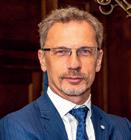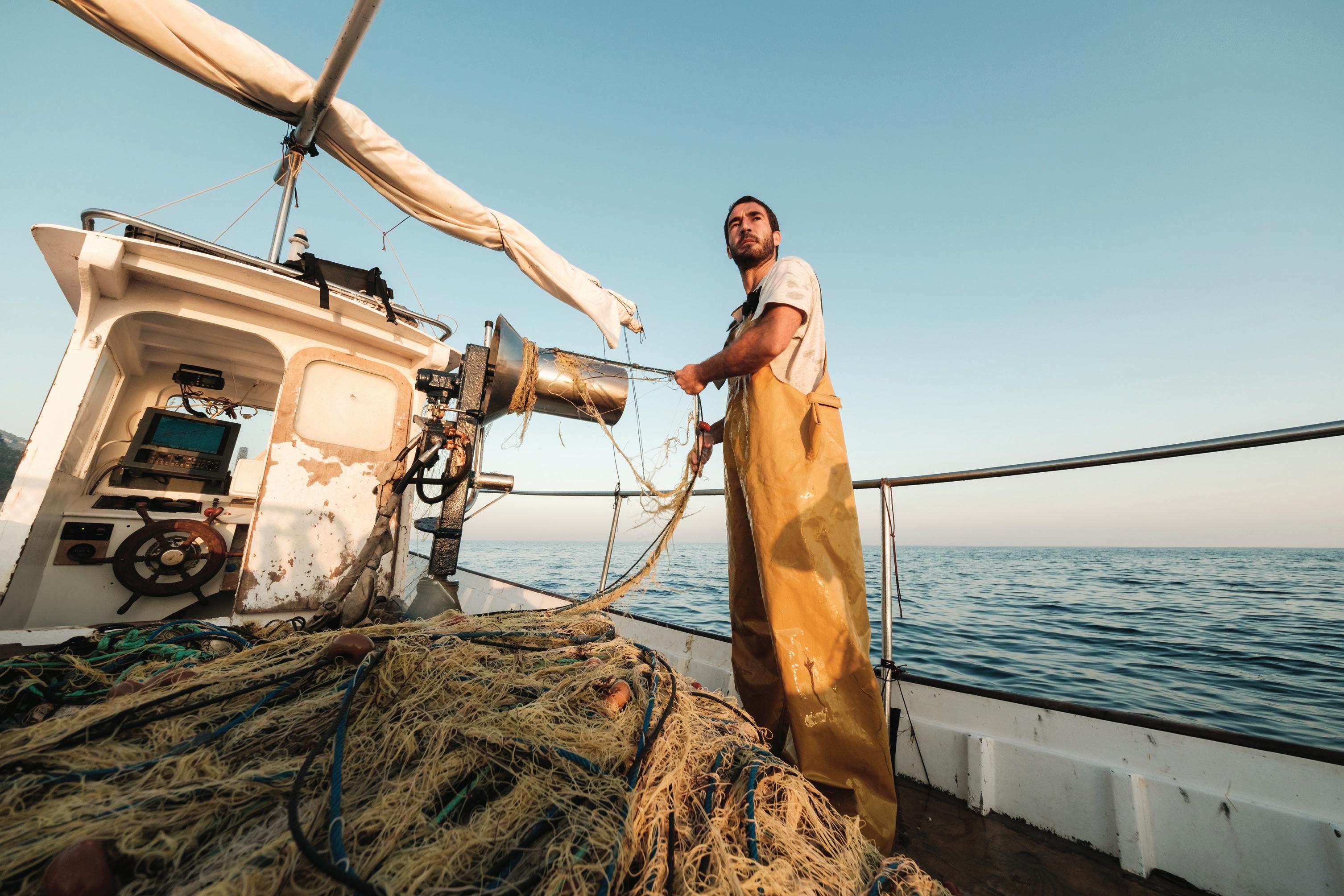
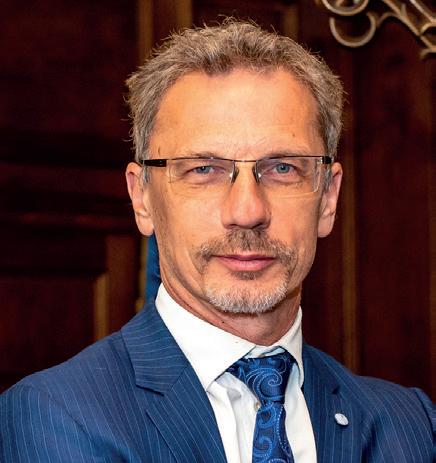


Minister

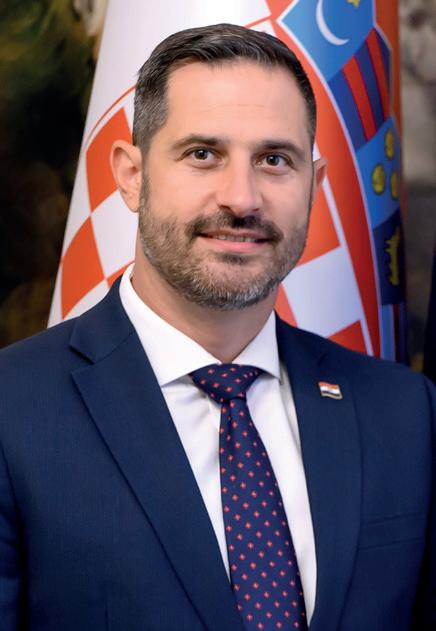
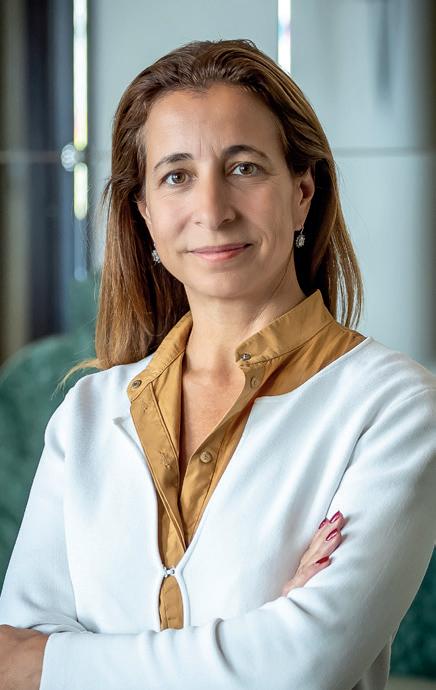






Minister





The dysregulation of the complement system, an essential part of the immune system, is a key driver of many devastating diseases. Targeting and inhibiting the complement system before it can trigger tissue damage or destruction can help restore balance. We are committed to continue unlocking the potential of the complement system, aiming to discover new life-changing therapies for even more patients.

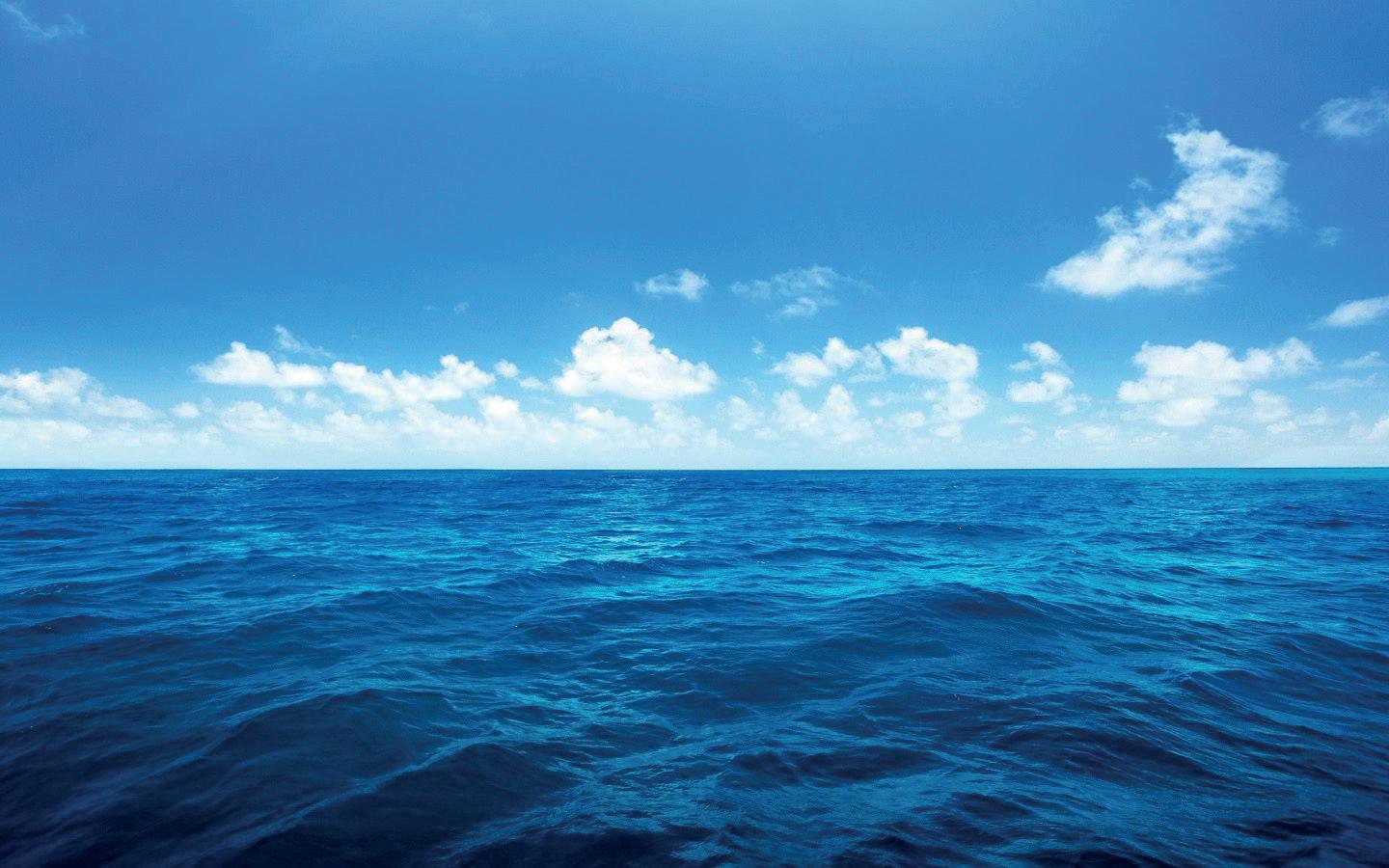
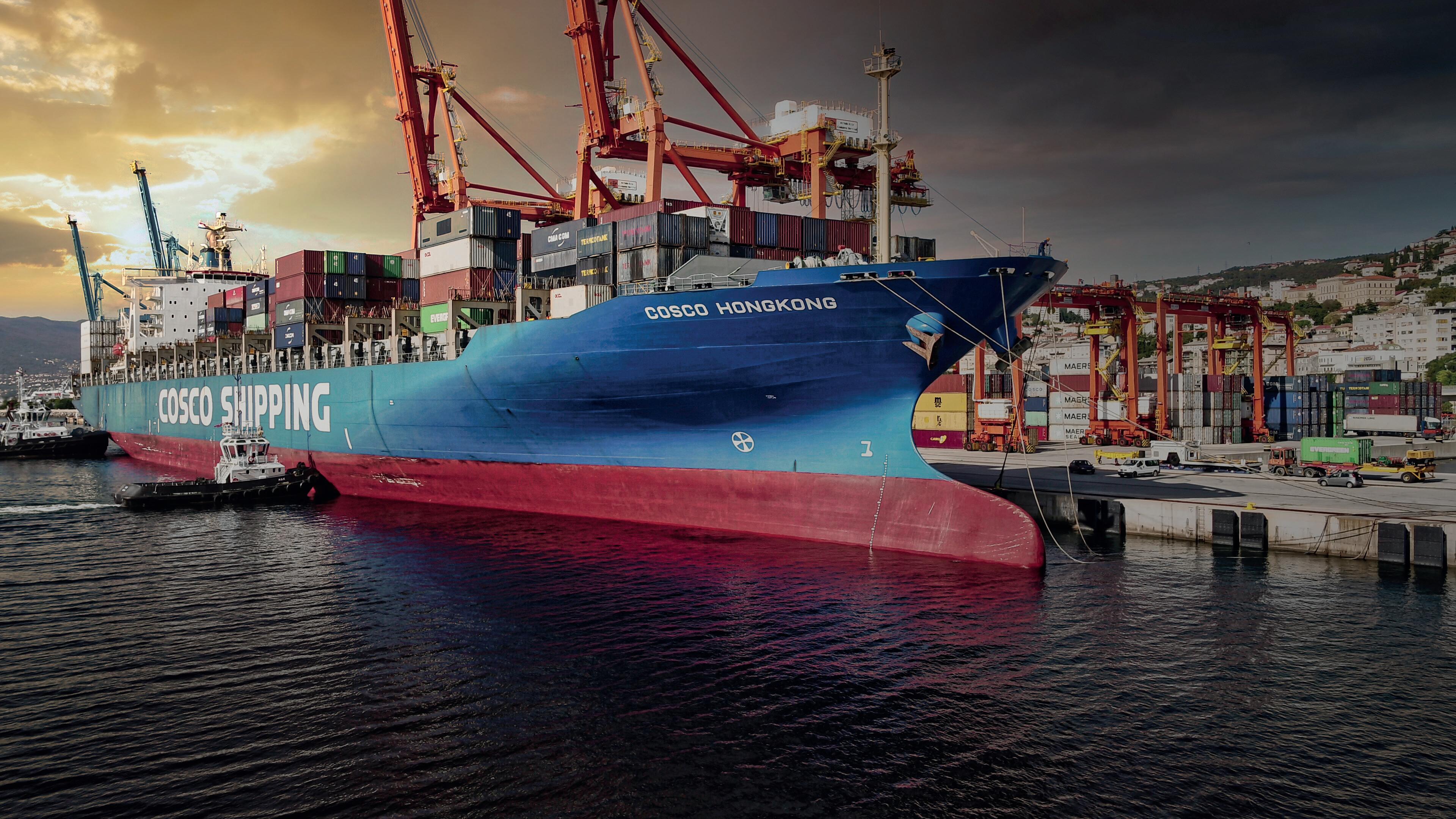






BOBAN SPASOJEVIĆ, Magazine Director Croatia and Editor in Chief boban@diplomacyandcommerce.hr
VLADIMIR DUDAŠ
C e n t r o b i r o Art Director
GORANKA MILOŠEVIĆ Translation
Representative for the Republic of Croatia ASPEKT obrt za savjetovanje i usluge
Owner of the license/ magazine name
Diplomacy&Commerce
ROBERT ČOBAN Director

BOBAN SPASOJEVIĆ
Director and Editor-in-Chief
CONTENTS


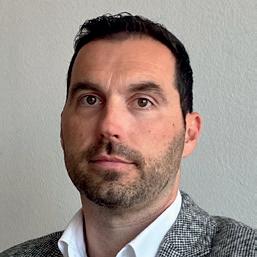

Dear readers,
It is a great pleasure and pride in today’s world of instability and uncertainty to celebrate 8 years of a magazine that survives with professionalism, accuracy and authenticity in a world where media, especially print, are losing their importance. Thank you for your trust and for walking together on the same paths to mutual satisfaction. We are also proud of the content we have prepared for you. We are looking forward to the next issue at the end of February 2026.
Enjoy!

28
WE CREATE CONNECTIONS THAT MATTER
TIMO PLEYER
Director of the German-Croatian Chamber of Industry and Commerce
32
CROATIAN PHARMACEUTICAL MARKET IS COMPETITIVE AND PROMISING
LOVRO BOJANIĆ
Governmental Affairs and Market
Access Lead at AstraZeneca
36
TWO DECADES OF CONTINUOUS GROWTH
MARKO ŠKRALJSKY
General manager Dragon
Maritime Adria
38
THE CUSTOMER TODAY ISN’T LOOKING FOR A LOGO — THEY’RE LOOKING FOR A SIGNATURE
MILOŠ MILUTINOVIĆ
General Manager, DP Lux Group
40
WE HAVE BEEN THE FASTEST-GROWING BANK ON THE MARKET
NIKOLINA CVITANOVIĆ
Member of KentBank Management
47
THE BIGGEST CHALLENGE IN BUSINESS IS THE PEOPLE
ANA LJEVAR
Managing Director Humed Pharma
48
KNOWLEDGE AND EXPERTISE IS THE KEY TO SUCCESS IN TOURISM
ROMANA ŽIŽAK
General Manager at Obzor Putovanja
50
WE ARE LIVING REVISIONISM –IT HAS BECOME INTERNALIZED
TVRTKO JAKOVINA
Croatian historian, political advisor, university professor
52
I HAVE ALWAYS BEEN AESTHETICALLY INSPIRED BY VISIONS OF A MORE BEAUTIFUL WORLD
NENAD KORKUT Fashion and Style Expert



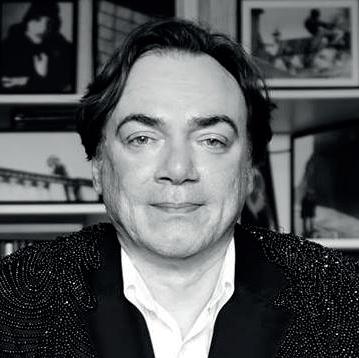

The expectation is that the European Parliament might adopt the Regulation on the establishment of the digital euro until the end of this year, in which case the digital euro might be introduced in 2028 at the earliest
BORIS VUJČIĆ
Governor of the Croatian National Bank
Boris Vujčić, Governor of the Croatian National Bank, explains to Diplomacy&Commerce the advantages of introducing the digital euro, but also shares the expectation that inflation will go down in 2026. He reveals the reasons for the different perception of citizens when it comes to inflation, and how the global crisis and taxes affect the policy of the Central Bank and our lives.
To what extent do the new US tariff policy and global geopolitical instability affect inflation in Europe and Croatia, and thus the monetary policy and decisions of the European Central Bank, whose Governing Board member is also the Governor of the CNB?
The impact of U.S. tariffs and, more broadly, geopolitical tensions on the EU economy appears to have been relatively limited so far. Economic growth has proven more resilient than expected, and although underlying growth momentum remains somewhat subdued, it is projected to gradually strengthen. At the same time, inflation has broadly stabilised around the target, leading the ECB’s Governing Council to keep key interest rates unchanged since the June meeting.
However, the medium-term effects of trade tensions on the EU economy remain highly uncertain. Tariffs are likely to weigh on growth by dampening global trade and business confidence. The impact on inflation, is expected to be more limited as weaker demand may offset upward price pressures stemming from trade disruptions. Overall, uncertainty surrounding the economic outlook remains

WE EXPECT THE HARMONISED INDEX TO INCREASE FROM 4.0% IN 2024 TO 4.2% IN 2025 BUT THEN DECLINE TO 2.8% IN 2026
elevated, with risks to both growth and inflation pointing in both directions.
Potential further changes to U.S. trade policy make medium-term projections particularly challenging. While an improvement in trade relations cannot be ruled out, recent developments have also shown that conditions can deteriorate rapidly. Under the current circumstances, we might see shifts in trade patterns, including a potential redirection of Chinese exports from the U.S. to the EU, which might also have important ramifications for domestic macroeconomic conditions.
What are your projections for inflation trends in this and next year in Croatia, what are the main factors that will influence inflation trends by the end of this year and in 2026 in Croatia?
Inflation in Croatia should tick-up slightly this year before easing in 2026, according to our September forecast. We expect the harmonised index to increase from 4.0% in 2024 to 4.2% in 2025 but then decline to 2.8% in 2026. The national index, which is more relevant for domestic households because it excludes the consumption of foreign tourists, shows a similar pattern –increase
from 3.0% to 3.6% this year and then down to 2.6% next year.
The main driver of higher inflation this year are energy prices, due to regulated price increases in late 2024 and early 2025. Food prices are also pushing inflation higher this year, reflecting earlier increase in prices of some food commodities, the pass–through from rising wages, strong domestic demand and weather impacts. However, inflationary pressures on food prices have recently moderated and food inflation has started slowing down. Also on a positive side, core inflation – which excludes volatile energy and food prices – continues to fall. This is mainly due to services inflation easing as wage growth slows along with subdued growth of tourism demand.
Looking ahead to 2026, we anticipate inflation falling amid low imported and easing domestic inflationary pressures, with inflation declining across the board. Our new macroprudential measures should help ease domestic inflationary pressures by curbing the financing of household consumption through loans.
That said, significant risks to inflation outlook remain. Inflation could be lower if economic growth disappoints, global commodity prices fall or exchange rate strengthens further. But it could also surprise on the upside if wages rise faster than expected or geopolitical tensions disrupt global supply chains and energy markets. Adverse weather conditions and increased defence spending also pose upside risks to inflation outlook.
It seems that the perception of inflation growth is much higher than the data of the National Bureau of Statistics, how do you explain that?
Consumer inflation perception in excess of official figures is not a new phenomenon. Even during periods
of low inflation, people perceived prices rising much faster than they actually were. This gap between perception and official statistics has widened in the period of high inflation. In spite of a significant decline in official inflation since its peak at end–2022, people still perceive inflation to be much higher, although recent data show that perceived inflation has substantially declined throughout 2025.
This disconnect between perceived and official inflation can be linked to several factors. People naturally focus on what they buy most often – especially food and energy. Food prices have risen strongly, along with energy costs due to increases in regulated prices of electricity and gas. These frequent purchases shape how we experience inflation day–to–day. Housing prices also play an important role in how people perceive inflation, even though real estate prices are not included in official inflation figures as it is hard to disentangle investment and consumption components related to living in own apartment. There is also an issue of relevant time horizon as official inflation figures measure year–on–year changes – comparing prices today to twelve months ago. However, consumers often compare current prices to what they paid several years back, which means that inflation perception is formed on the basis of cumulative inflation over a longer period. In Croatia specifically, many people still convert prices to kuna and compare them to pre–euro levels rather than last year’s prices, which amplifies the perception of higher inflation. Finally, it is worth noting that perceived inflation is much stronger not only compared to official figures but also compared to consumer’s inflation expectations. Inflation expectations have declined more since their peak than perceived inflation. In general, consumers tend to be more optimistic about price developments in the coming year in comparison to their assessment of past price developments.
Our magazine has been read for 8 years by, among others, business people for whom expert and concrete information means a lot. When we talk about bank lending and risk reduction, a countercyclical protective layer of capital is important. Why did the CNB adopt this measure right now, when this measure should come into force and how could it affect the banks’ operations? Will this measure
lead to higher interest rates for the economy and citizens? Regardless of this measure, how do you foresee the movement of interest on loans for citizens and the economy by the end of this year and in 2026?
The countercyclical capital buffer is a releasable macroprudential capital requirement used to mitigate risks arising from procyclicality in bank lending and reduce risks to the stability of the financial system. Build-up of additional capital in the upward phase of the cycle enables
on euro banknotes and coins as legal tender) and the other for the digital euro (Regulation on the digital euro). The latter caused great public interest. What is the digital euro, how will it be paid with the digital euro, will it be used only for payments or also for deposits, will the ECB have insight into digital euro transactions and will cash certainly remain a means of payment?
The digital euro is digital money that would be issued by the Euro-
credit institutions to absorb losses and maintain lending activity in the downward phase of the cycle or in case of a sudden crisis.
Croatian National Bank activated the countercyclical buffer in 2022 and gradually increased its rate in line with the evolution of cyclical risks amid the expansion of the financial cycle. The latest increase, from currently applicable 1.5% to 2% applicable from 1 January 2027, was announced in October this year and was prompted by strong and broadbased credit activity of banks, as well as the continued growth in the housing prices, further fuelling the already heightened cyclical vulnerabilities. The strengthening of the capital position of banks through countercyclical buffer complements the new restrictions on consumer lending criteria. The domestic banking system is profitable and maintains significant capital headroom, which should enable banks to increase capital buffers without unfavourable impacts on cost and availability of bank financing.
Interest rates on loans to firms and households have decreased considerably in Croatia as the ECB lowered key interest rates. Financing cost have declined in line with euro area aggregates and have recently stabilized at levels similar to the euro area averages.
In 2023, the European Commission announced the Single Currency Package, which includes two key legislative proposals - one to protect the status of euro banknotes and coins as legal tender (Regulation
guarantee citizens and corporates sufficient access points for cash withdrawals and deposits, such as ATMs, bank branches, or other channels to ensure that cash remains readily available to all, including those who rely on it exclusively. The aim is to preserve cash as an inclusive, secure and reliable means of payment that will stand side by side with digital forms of payment.
Cash plays a crucial role in financial inclusion and in maintaining the resilience of our payment systems and economies. In times of crisis, such as cyberattacks or power outages, cash serves as a dependable alternative. This was evident during the natural disasters that affected parts of the euro area last year.
system, that is, by the European Central Bank and national central banks of those EU countries that have adopted the euro. The idea of introducing a digital euro as a form of central bank digital currency for euro area citizens emerged as a response to a growing demand for secure and reliable electronic payments in Europe.
A digital euro would complement cash and not replace it. It would be used in parallel with cash, which would continue to be available in the euro area. Other electronic means of payment currently used would also remain available. Therefore, the digital euro would be available to users to be used primarily as a means of payment while its possible use as a store of value (savings) would be limited by the design of the digital euro capping the amount of the digital euro that users may hold in their accounts. No interest would be paid on digital euro holdings.
This would ensure that the digital euro primarily serves as a means of payment with no negative impact on bank outflows and the stability of the banking and financial system.
The European Central Bank (ECB) and the Croatian National Bank (CNB) both support the Commission’s proposed regulation enshrining the legal tender status of euro banknotes and euro coins. The regulation will clarify that merchants and service providers must, in principle, accept cash, except in exceptional circumstances (e.g. where an alternative payment method has been agreed in advance). It will also require euro area member states to
The digital euro would be available to users anytime and anywhere in the euro area. It would be a universally accepted digital means of payment that users could use free of charge for payments online, instore or between individuals. This means that digital payments could be executed through a public means of payment, both online and offline.
Citizens would be able to use a digital euro in everyday transactions, making payments by means of a card or a mobile application or any other means that meets technical requirements set out in the legislative proposal at the time when a digital euro is issued, and is also user-friendly and secure to use. It would be widely available, reliable, safe and effective, and it would be created in accordance with the law, offering the highest possible protection of privacy.
Through its design, the digital euro would ensure the highest data protection and privacy standards in accordance with the strict standards of personal data protection imposed by EU regulation, which are among the strictest in the world as regards digital security and privacy of individuals.
As regards privacy, the Eurosystem and the European Central Bank will not be able to identify the persons included in payment transactions. In offline payments using digital euro, personal data and the identity of the persons included in the transaction would only be available to the payer and the payee.
The digital euro would be safe and easy to use. It would also promote digital financial inclusion by not excluding anyone from payments in the digital euro. It would accommodate the needs of people with disabilities and those with no access to a bank account or lacking digital or financial skills.
Croatia’s progress in circular economy, waste management, and blue finance shows the country’s potential to become a regional leader in sustainable development
Recently held in Zagreb, IFC Day brought together business leaders, government officials, and international experts to spotlight opportunities in blue finance, circular economy, waste management, and capital markets. The event showcased how Croatian companies can leverage the International Finance Corporation (IFC)’s global network and financing solutions to grow and strengthen their competitiveness internationally. Ines Rocha, IFC Division Director for Europe, for Diplomacy&Commerce magazine shares more about the event and outlines IFC’s and the World Bank Group’s plans in Croatia.
After more than three decades of IFC engagement in Croatia, why is now the right moment to step up cooperation — and what opportunities should Croatian entrepreneurs watch most closely?
IFC, a member of the World Bank Group, is the largest global development institution focused on the private sector in emerging markets. We operate in more than 100 countries, using our capital, expertise, and influence to create markets and opportunities. In Croatia, we have been a partner for more than 30 years, scaling up green and blue technologies, developing capital markets, and expanding access to finance for small and medium enterprises (SMEs). IFC Day in Zagreb reaffirmed this longterm commitment by highlighting opportunities in renewable energy, sustainable tourism, green municipal infrastructure, and innovative financing solutions such as green and sustainability bonds.
Croatia’s progress in circular economy, waste management, and blue finance shows the
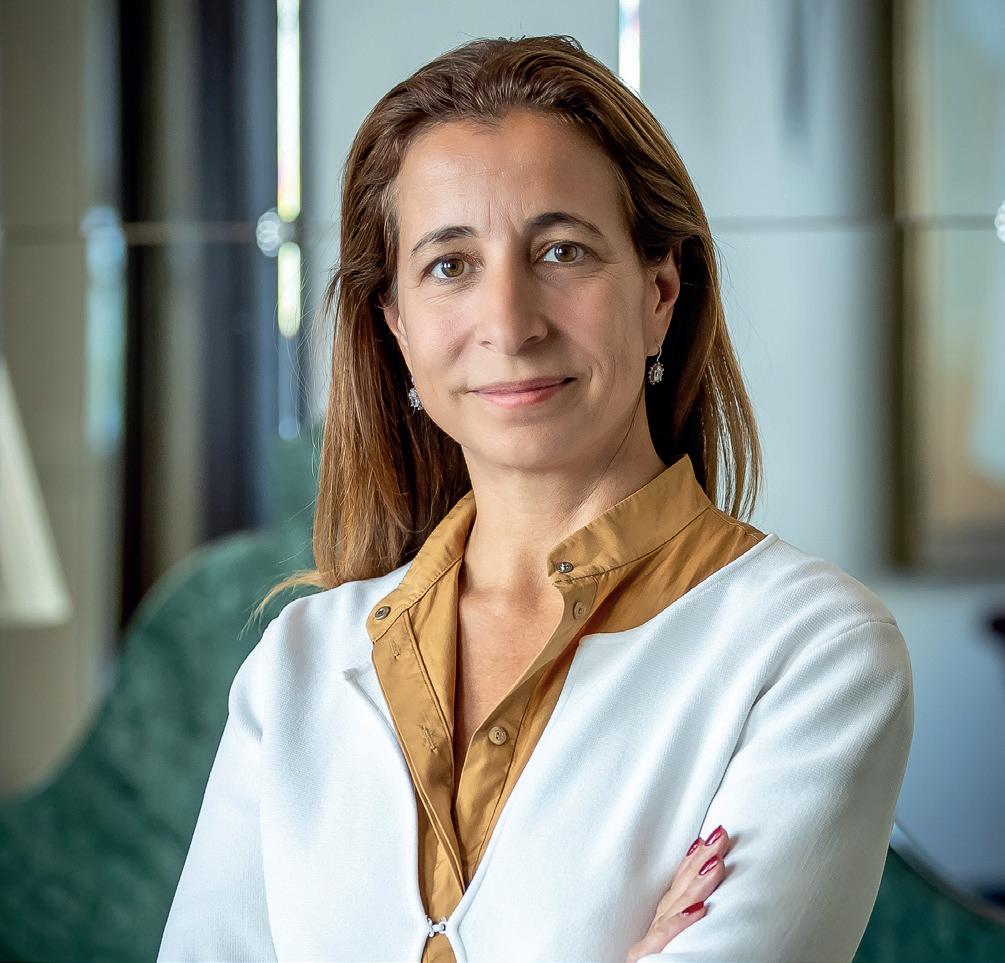
OUR ROLE IS TO MOBILIZE MORE CAPITAL, SUPPORT INNOVATION, AND HELP CROATIA’S PRIVATE SECTOR LEAD THE GREEN AND BLUE TRANSITIONS
country’s potential to become a regional leader in sustainable development. At the same time, expanding capital markets are creating fresh opportunities for businesses to mobilize
private capital, innovate, and grow. Together with the World Bank Group, we aim to continue supporting Croatia in building a more innovative, sustainable, and resilient economy.
What are IFC’s priorities in Croatia, and can you give us some concrete examples of recent investments?
Our priorities focus on three areas: boosting productivity and competitiveness, advancing the green and blue transition, and preparing the economy for the post-EU funds period by diversifying beyond tourism into sectors such as food processing, manufacturing, and logistics. In practice, this means mobilizing capital and supporting companies that drive innovation and re-
silience. We backed Croatia’s first blue loan in tourism with Maistra Hospitality Group. The €200 million facility will redevelop Split’s Hotel Marjan and upgrade the Vrsar Holiday Village in Istria, while protecting marine ecosystems. We anchored Zagreb Holding’s €305 million sustainability-linked bond, financing waste management and renewable energy projects that will cut landfill waste by 132,000 tons and raise renewable use to 70 percent by 2028. And together with Raiffeisen Bank Croatia, we supported an MREL bond of up to €40 million—our first blue finance project in Croatia’s financial sector—channeling funds into green buildings, SME energy upgrades, small renewables, sustainable tourism, and agriculture.
With a current portfolio of $638 million and more than $2 billion invested in Croatia since 1991, IFC is committed to helping the country decarbonize, scale innovation, and build a more competitive and resilient economy in line with EU goals.
Croatia is often described as being at a crossroads—growth fueled by EU funds and tourism is reaching its limits. How can private investment, innovation, and a faster green transition drive the country’s next phase of development?
Croatia has achieved remarkable progress and is now at an important turning point. There is a real opportunity to boost productivity, expand private sector dynamism, and prepare for the future by investing in skills, green jobs, and innovation. The gradual decline of EU inflows highlights the need to diversify growth drivers, but it also creates momentum to strengthen competitiveness and build a more resilient economy.
The opportunities are clear. By improving access to finance for smaller enterprises and fostering technology adoption, Croatia can raise productivity and expand higher-value sectors. Scaling up renewable energy, energy efficiency, and resilient infrastructure will accelerate the green transition while creating quality jobs. The country’s euro and Schengen membership, combined with its strategic position in Europe, can attract new value chains and logistics hubs. And with 6,000 kilometers of coastline, Croatia can harness its blue economy—sustainable tourism, fisheries, and marine industries—while protecting natural resources.
The new World Bank Group–Croatia Country Partnership

WE SEE CROATIA AS THE IDEAL PLACE TO LAUNCH SKILLUP, WITH ITS STRONG ECONOMIC POTENTIAL, ENTREPRENEURIAL SPIRIT, AND OPPORTUNITIES TO DRIVE INNOVATION
Framework for 2025–30 will support this next phase, advancing reforms and mobilizing private investment to unlock the country’s full potential and deliver sustainable, inclusive growth.
Croatia is the first country where IFC is supporting SMEs through the SkillUp program. Why was Croatia chosen to launch it, and what results do you expect?
We see Croatia as the ideal place to launch SkillUp, with its strong economic potential, entrepreneurial spirit, and opportunities to drive innovation. The country’s smaller businesses are eager to grow and expand internationally, which aligns well with the program’s objectives. SkillUp will help them strengthen resilience, adapt more quickly to rapid changes in the economy, and seize new opportunities.
Equally important, SkillUp will serve as a demonstration of how World Bank Group support can advance the SME sector, offering inspiration to other countries in the region and beyond. Building a business is never easy—international success requires persistence, patience, and the right support. That is what makes SkillUp unique: it gives Croatian business leaders access to global mentors, networks, and knowledge that can open doors to expansion beyond national borders.
SkillUp offers a wide range of learning formats—from specialized workshops to inspiring stories of successful entrepreneurs. How will this combination benefit Croatian SMEs?
The strength of SkillUp lies in its comprehensiveness. It combines practical workshops with tailored advisory support, allowing entrepreneurs to learn from real-life situations. This mix of knowledge, experience, and practice makes the program highly relevant.
It is also a networking platform. Through IFC’s global network of partners, entrepreneurs gain additional support, contacts, and opportunities for growth. By the end of 2025, 150 CEOs of Croatian companies will participate—firms with 10 to 250 employees, annual revenues of at least €500,000, and at least three years of operations. With €4 million in EU funding through NextGenerationEU, implemented by the Ministry of Economy with IFC’s support, SkillUp will deliver lasting impact.
At IFC, we are proud to support this program. When entrepreneurs are given the right tools, it is not only their companies that grow—they transform their communities and create pathways for others to follow.
As EU funds gradually decline, Croatia’s future growth will depend more on private capital.
How will IFC’s program in Croatia—guided by the IFC 2030 Strategy—support this transition?
Looking beyond EU funding, Croatia’s future growth will rely more on private investment—and this is where IFC can make a real difference. Guided by our IFC 2030 Strategy, we are focusing on three main areas.
First, innovation and jobs: channeling more capital into private equity, venture funds, and startups—especially in clean and sustainable technologies—while expanding access to finance for SMEs and underserved groups through sustainable bonds and risk-sharing tools.
Second, the green and blue transition: financing renewables, energy efficiency, circular economy projects, and cleaner municipal services, as well as exploring opportunities in maritime decarbonization along Croatia’s coastline. Importantly, we aim to crowd in institutional investors so that private capital is mobilized at scale for climate action.
Third, capital markets and sustainable finance: building on landmark bonds we have supported in recent years, we want to deepen Croatia’s capital markets, attract long-term investors, and scale green, blue, and sustainabilitylinked instruments. These projects not only help Croatia meet EU and global ESG standards but also showcase innovative approaches under IFC 2030.
In short, our role is to mobilize more capital, support innovation, and help Croatia’s private sector lead the green and blue transitions—so the economy remains resilient, competitive, and inclusive in the years ahead.




Croatia will remain an advocate for a strong cohesion policy

NATAŠA MIKUŠ ŽIGMAN
Minister of regional development and EU funds
The European Commission has presented a proposal for the new Multiannual Financial Framework for 2028–2034, worth nearly two trillion euros. Our efforts and contributions to the overall process will aim, among other things, at achieving an effective and fair budget capable of providing an adequate response to new challenges, says Nataša Mikuš Žigman, Minister of Regional Development and EU Funds, for Diplomacy & Commerce. With the new Law on Islands, the Government aims to harmonize and improve certain existing provisions, as well as introduce new ones. The Minister notes that over the past 10 years, more than 4 billion euros have been invested in Croatian islands.
The successful use of available EU funds and their strategic investment in structural projects, negotiations on the new Multiannual Financial Framework of the European Union, strengthening the system’s capacities, and ensuring balanced growth and development across all parts of Croatia have been your priorities since you took office as Minister. Where do you see the greatest challenges among these areas?
I would rather call them opportunities that we must use wisely to further promote the growth and development of all parts of Croatia, so that we continue to be recognized as a positive example of cohesion policy and EU fund investment at the level of the European Union.
tural funds — as one of the main benefits of our EU membership — are a driving force of development, creating the conditions for balanced regional development, economic growth, and an improved standard of living for Croatian citizens.
Therefore, one of our main tasks,
TAKES PART IN 13 EUROPEAN TERRITORIAL COOPERATION PROGRAMMES
That is why we have focused on accelerating the pace of contracting and implementation EU programmes in Croatia to fully utilize the currently available funds by the end of 2029. In addition, it is important for us to continuously work on strengthening capacities of the EU funds management system and maintaining good cooperation with local and regional authorities in planning and implementing numerous development projects.
Furthermore, ahead of us are presumably long and complex negotiations on the new Multiannual Financial Framework of the European Union for the period after 2027. In these negotiations, Croatia will continue to advocate for a strong cohesion policy, since our experience has shown that struc-
Framework for 2028–2034, worth nearly two trillion euros. Negotiations are expected to last around two years. What can Croatia expect? During negotiations, what aspects are taken into account and which factors influence the final decision?
The European Commission published the draft for the new Multiannual Financial Framework for the 2028–2034 period in July this year. Following that, the negotiations on the budget were taken over by the Council of the European Union, or, more precisely, by the member states, in consultation with the European Parliament and other stakeholders at the EU level, such as the Committee of the Regions.
From the very beginning, Croatia has been participating in the working groups in Brussels, where negotiations and decisions on the Multiannual Financial Framework are taking place. The final decision on the future long-term EU budget will be adopted unanimously by the Council of the EU, with the prior consent of the European Parliament. Our advantage lies in having an excellent and experienced team, both in Croatia and in Brussels, who will represent our interests in the best possible way.
For Croatia, this is the second time that it is participating in the process of negotiating the EU’s multiannual budget on an equal footing with other member states. We will proactively use the knowledge and experience we have gained to directly contribute to shaping European policies that have a direct impact on the lives of our citizens.
alongside dialogue with county prefects, mayors, municipal heads, business representatives, and social partners, will be to actively participate in shaping the multiannual financial package.
However, what will certainly be the key to Croatia’s continued success is focusing not only on absorbing the funds available to us, but on spending them responsibly and transparently, and investing them in sustainable projects that generate growth and create added value. Ultimately, this should bring us closer to our goal of joining the group of the most developed EU member states.
The European Commission has presented its proposal for the new Multiannual Financial
Given that the adoption of the Multiannual Financial Framework for the European Union is usually a demanding and lengthy process that depends on numerous factors – especially now, as the Union faces many new challenges that have influenced changes in the structure of the MFF – it is difficult to predict the outcome at this stage.
In any case, our efforts and contributions throughout the process will aim toward achieving an efficient and fair budget that can adequately respond to new challenges, while at the same time ensuring the continuity and stability of traditional policies, such as cohesion policy and the common agricultural policy.
The Government has submitted a new Islands Act to parliamentary procedure, aiming to harmonize and improve certain existing provisions and introduce new
ones, with the goal of improving the quality of life of island residents and promoting the green transition of the islands. What would you highlight as the most important new elements?
Our island legislation has been in place for 25 years, and we are proud to be among the few European countries that have a dedicated legislative framework for islands. In doing so, we send a clear message about how strategically important our islands are.
Over the past 10 years, more than 4 billion euros have been invested in Croatian islands, and numerous development projects have contributed to improving economic activity and the living standards of island residents. In addition, Croatia has used the regulatory possibilities and secured 150 million euros from EU funds exclusively for investments in islands.
With the new Act, based on years of experience in implementing development and island policies, our goal was to further direct efforts and available resources toward strengthening the sustainability of the islands – that is, to focus investments on the areas that matter most to islanders and that contribute to their continued growth and development.
Thus, in addition to strengthening measures related to island infrastructure development, maritime and road transport, water supply, support for island entrepreneurship and civil society, and the promotion of authentic island products, the new Act places special emphasis on the green and energy transition, improving healthcare on the islands, and waste management.
We will also provide for the possibility of co-financing the costs of expensive and logistically challenging waste management projects on the islands, as well as the projects in the field of green and energy transition for island entrepreneurs, which are key to increasing their competitiveness.
The international cooperation of your Ministry is very active. You recently met with the Ambassador of the Kingdom of Norway, H.E. Arne Sannes Bjørnstad, and the Ambassador of the Swiss Confederation, H.E. Beatrice Schaer. What were the main topics of those meetings, and how important is international cooperation for Croatia, considering that we are also an EU member state? In addition to the funds available to us through the European Union’s
Multiannual Financial Framework and the National Recovery and Resilience Plan, part of our activities is also connected to the implementation of bilateral programmes — the European Economic Area (EEA) Financial Mechanism, the Norwegian Financial Mechanism, and the Swiss-Croatian Cooperation Programme. These are programmes that Croatia uses as a complement to EU funds, where there is a common interest with the countries of the European Economic Area, and which involve close cooperation between our Ministry and the donor countries as well as their embassies in Croatia.
The implementation of these mechanisms that are aimed at balanced regional development and investments to improve the living standards of Croatian citizens, was precisely the focus of the bilateral meetings with Ambassador Bjørnstad and Ambassador Schaer.
Moreover, in mid-September, during the official visit of Swiss President Karin Keller-Sutter to Croatia, we signed the Agreement for the Water Supply and Sewerage Programme under the Second Swiss Contribution, which provides 23 million Swiss francs to improve water and wastewater infrastructure and systems in the Gorski kotar area.
Earlier, we had already signed agreements for the Research Programme, worth 8 million Swiss francs, and for the Civil Society and Transparency Programme, worth
7.6 million Swiss francs, while the signing of an agreement for palliative care is still ahead of us.
A total of 45.7 million Swiss francs has been made available to us through the Second Swiss Contribution, thereby continuing the excellent practice from the previous contribution, under which 11 projects worth more than 42 million Swiss francs were successfully implemented. Among them were investments in water supply and wastewater systems in Gorski kotar, the promotion of excellence in education, mine clearance in SisakMoslavina County, and support for the participation of Croatian small and medium-sized enterprises in international research and development projects.
On the other hand, in September, we also signed Memoranda of Understanding on the implementation of the European Economic Area (EEA) Financial Mechanism and the Norwegian Financial Mechanism for the period up to 2028 with H.E. Helga Hauksdóttir, Ambassador of Iceland to the Republic of Croatia, and H.E. Arne Sannes Bjørnstad, Ambassador of the Kingdom of Norway to Croatia, respectively.
Under these Memoranda, more than 111 million euros have been made available for investments in the judiciary, local development, the green transition, and innovation in the fields of green and blue business.
During the previous financial period, a wide range of projects worth
PART OF THE MINISTRY’S ACTIVITIES IS ALSO CONNECTED TO THE IMPLEMENTATION OF BILATERAL PROGRAMMES — THE EUROPEAN ECONOMIC AREA FINANCIAL MECHANISM, THE NORWEGIAN FINANCIAL MECHANISM, AND THE SWISS-CROATIAN COOPERATION PROGRAMME

over 103 million euros were successfully implemented in Croatia through these mechanisms, including four Regional Science Centres, a major geothermal drilling project in Bjelovar, and the new court building in Split, which in itself clearly demonstrates how important and beneficial such partnerships are for Croatia’s development.
Regional cooperation is also very important for us. There are currently many active projects with Bosnia and Herzegovina, Montenegro, Serbia, and Hungary. Which projects would you highlight, and how significant are they for the region – and consequently, for Croatia?
The Republic of Croatia takes part in 13 European Territorial Cooperation programmes, which contribute to increasing the international competitiveness of Croatian regions and reducing social and economic disparities. Through these programmes, challenges that transcend national borders are jointly addressed, ensuring synergy between local and regional policies and the European Union’s cohesion policy.
Thanks to cross-border cooperation, for example, Osijek will soon have a Mosquito Control Centre, the Faculty of Electrical Engineering and Computing (FER) will implement a project aimed at improving the competitiveness of agriculture, while in the Split-Dalmatia County investments will continue in strengthening the organisational and technical capacities of emergency services in fire protection and rescue.
Across the border, the University Clinical Hospital in Mostar will receive a valuable linear accelerator, while projects are also enhancing entrepreneurship and innovation capacities, supporting the development of the gaming industry, and investing in energy efficiency, the circular economy, and better access to emergency services in border areas.
However, it is important to emphasise that these are not only projects that foster development and improve the quality of life for citizens in border regions, but also an excellent tool for networking, exchanging experiences, and acquiring new knowledge. This is valuable for us as an EU member state participating in programmes with other member states, as well as with countries such as Bosnia and Herzegovina, Montenegro, and Serbia, which are candidates for EU membership.
We are becoming an increasingly competitive and desirable destination, with results that have exceeded expectations
Ministry of Tourism and Sport
Croatia is transitioning from an era of growth to an era of tourism management guided by the principles of sustainability.
“To achieve this, we are implementing a comprehensive tourism reform based on the triangle of tax, spatial, and tourism policies,” says Tonči Glavina, Minister of Tourism and Sport, in an interview with Diplomacy & Commerce magazine.
“I believe that in the coming period, Croatian tourism will become more balanced, higher in quality, and more resilient — with a distinctive identity, stronger local communities, and satisfied residents,” Minister Glavina adds.
In the interview, he also announces several major sporting events planned for the coming year that will receive government support and highlights the importance of the symbiosis between sports and tourism.
As one of the significant sectors of the economy in the Republic of Croatia, which also drives many other activities, tourism is a major topic, especially during the summer. What are your impressions, how would you evaluate this tourist season, and what do the numbers show so far? Since the beginning of this year, Croatia has recorded more than 20 million
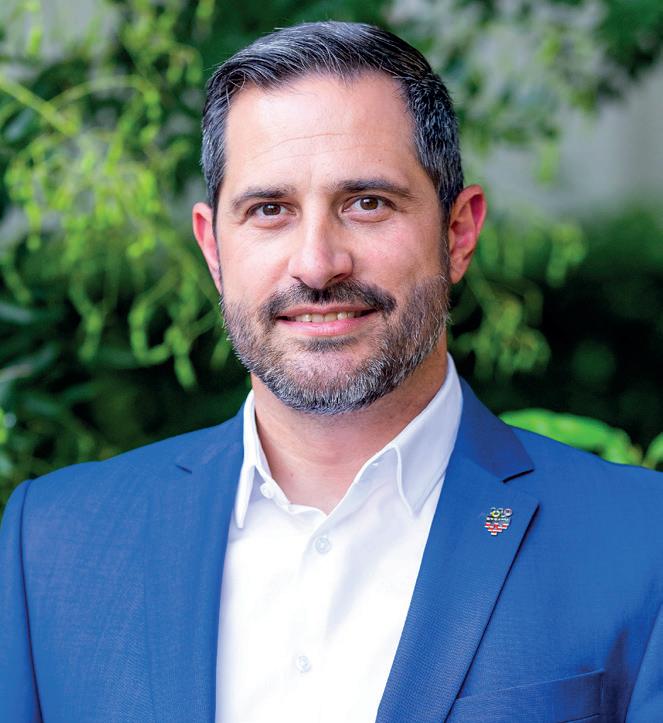
tourist arrivals and over 107 million overnight stays — an increase of 2 percent in arrivals and 1 percent in overnight stays compared to the same period last year.
These results confirm that our tourism sector is no longer growing only in quantitative terms, but also in quality — through higher visitor spending, a longer tourist season, and more balanced regional development.
Growth is also evident in financial indicators: revenues from foreign tourists in the first six months reached an all-time high of almost 4.4 billion euros.
The strongest growth in tourist traffic was recorded during the preseason, with arrivals up by 4 percent and overnight stays up by 5 percent — which means more than 260,000 additional arrivals and over one million additional overnight stays.
The post-season continues this positive trend: in September alone, we recorded 2.5 million arrivals and 13.8 million overnight stays, representing an increase of nearly 5 percent compared to last year.
These figures clearly show that tourism growth is no longer limited to the summer months, which is one of our key strategic objectives — developing year-round, balanced, and sustainable tourism that enhances the quality of life in all parts of Croatia.
The goal being discussed is to have a tourism season throughout the entire year. How far have we come in achieving this goal, and what
do we offer to our guests beyond natural beauty? What specific initiatives are being pursued in this direction (health tourism, congress tourism, sports tourism…)?
As I have already emphasized, we are increasingly confirming the direction towards year-round and sustainable tourism. Our tourism is no longer a seasonal phenomenon lasting only two months; it is becoming the foundation of the local economy and quality of life throughout the year. This year, we have recorded growth in tourist arrivals and overnight stays that was not achieved in the peak months but in the pre-season and post-season. These indicators are the best proof that Croatia is moving from an era of growth to an era of tourism management based on the principles of sustainability.
To achieve this, we are implementing a comprehensive reform of tourism based on the triangle of tax, spatial, and tourism policy. We have adopted the Sustainable Tourism Development Strategy until 2030, the National Plan for Sustainable Tourism Development, and the first Tourism Act, which for the first time enables local communities to independently plan development and manage tourist flows. This makes tourism a tool for more balanced regional development and better quality of life, rather than a pressure on space and infrastructure.
At the same time, investments in specialized forms of tourism – such as health, sports, congress, and cul-
tural tourism – are already yielding tangible results, since an increasing number of visitors are coming specifically for these specialized offerings. In health tourism, we are renovating and modernizing spas and developing wellness and spa facilities. Sports tourism has become one of the fastest-growing markets; in recent years, Croatia has hosted nearly 200 major international competitions. This year alone, €18 million has been allocated to co-finance these events, and we have hosted world championships in handball, wrestling, obstacle races, European rally and table tennis championships, which is just the tip of the pyramid of all events held in Croatia. Their added value lies in the fact that many of these events take place in the pre-season and post-season, generating a large number of visitors during the periods in which we aim to grow. Congress and business tourism are being strengthened through investments in conference facilities and high-category hotels, while cultural tourism relies on our rich heritage, events, and authentic experiences that extend stays and strengthen the identity of each destination.
In addition, we have secured over €520 million through the National Recovery and Resilience Plan and the Multiannual Financial Framework for investments in green and digital transition, infrastructure, and tourism workforce development. These investments are aimed at raising quality and creating competitive destinations capable of operating 365
days a year. Our goal is clear – a tourism sector that benefits everyone, not just visitors, but also the people living in these destinations. This is tourism that creates new jobs, stimulates local production, preserves space and traditions, and becomes a driver of sustainable development in Croatia throughout the year.
One of the ideas for the development of Croatian tourism is Premium tourism. How much potential do we have in this area, and what do we offer in this segment? How is this project progressing?
The premium segment of Croatian tourism has enormous potential and is already showing strong growth. In recent years, Croatia has clearly positioned itself as a high-quality destination – from hotels and camps with the highest standards to top-notch gastronomic and wine offerings.
Investments in four- and five-star hotels and camps are continuously increasing, and it is precisely in this segment that we are seeing the greatest improvements in quality, occupancy, and guest spending. Such projects create new jobs, raise the quality of the destination, and strengthen Croatia’s image as a Mediterranean country with top-notch service and infrastructure.
Our major advantage is that premium guests want authenticity, reliability, and sustainability, and that is exactly what we offer them – a unique combination of natural beauty, cultural heritage, and modern amenities at the highest level. In this direction, we have also developed the “Local Host” label, which recognizes and rewards authentic hosts in private accommodation, encouraging quality, a personal approach, and responsible management. To date, there are already 3,000 registered properties. This creates a clear distinction between short-term rentals and authentic family-run accommodations, which provide a true experience of the destination and contribute to the overall quality of Croatian tourism.
Considering the number of tourists who visit our country relative to the population, Croatia is a tourism powerhouse. But where does Croatian tourism stand today compared to the competition, and whom do we benchmark against? What are the areas we still need to improve? And what kind of tourism do you envision in 5–10 years?
Today, Croatia is increasingly establishing itself as an example of a country building its own model of sustainable tourism. We do not com-
pare ourselves with anyone, because we do not want to be a copy of others, and we are creating a Croatian model of sustainability – a model that combines growth, balance, and quality of life in destinations.
Through the comprehensive reform we are implementing, we have enabled tourism development management according to sustainability principles and demonstrated that tourism can grow while remaining sustainable, balanced, and resilient. All our activities – from the new strategic and legislative framework, transformation of accommodation structures, record investments, to record results, which are now generated not just in the two summer months but throughout the year – have been recognized internationally, positioning Croatia as a leader in sustainable tourism. We are strengthening this status through concrete collaborations with the World Tourism Organization. This year, we signed two important agreements: one to establish a Sustainable Tourism Research and Development Center
more balanced, higher in quality, and more resilient, with a recognizable identity, stronger local communities, and satisfied residents. This is tourism that benefits everyone – guests, hosts, and the shared space we inhabit.
The Ministry of Tourism and Sports recently concluded a Public Call for expressions of interest for co-financing international sports competitions in 2026, with a total value of €4,579,513. How important are international competitions both from a sporting perspective and as additional promotion for the country? Which international competitions can we expect to be funded by the Ministry? International sports competitions have a dual significance for us – on one hand, they contribute significantly to the development of the sport itself, and on the other, they provide excellent promotion for Croatia worldwide. This is why, during the current Government’s
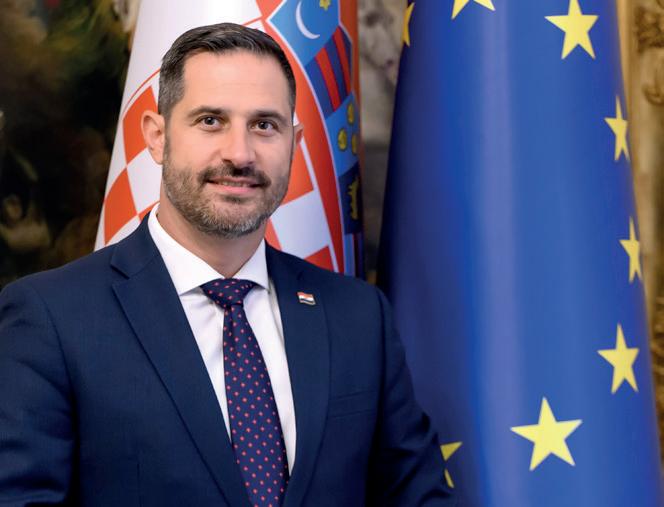
DURING THE CURRENT GOVERNMENT’S TERM, WE HAVE SUPPORTED AROUND 200 INTERNATIONAL SPORTS COMPETITIONS
at the University of Zagreb, and another to launch the Sustainable Tourism Award, which will be presented for the first time this year at the Croatian Tourism Days. This award recognizes and promotes leaders in sustainable development and demonstrates that Croatia does not follow trends, but sets them.
I believe that in the coming period, Croatian tourism will be even
further funds for competitions financed directly from the national budget, bringing the total secured amount to €12 million. These funds cover a range of major events –from the World Rally Championship, through Cro Race and the Spartan World Championships, to the Youth Sports Games and the European Gymnastics Championship.
The European Commission has announced the results of approved projects under the Erasmus+: Sport 2025 call, confirming once again that Croatian clubs and associations are among the top in Europe in terms of the number of projects received. How many projects are we talking about, which ones, and what is their total value?
The results published by the European Commission confirmed once again that Croatian clubs and associations are at the forefront of Europe when it comes to utilizing funds from the Erasmus+: Sport program. This year, 26 projects from Croatia were approved, with a total value of €3.2 million, placing us once again among the three most successful countries in Europe – only Spain and Italy are ahead of us.
It is particularly important to highlight that we recorded a record number of approved projects in the key area of small partnerships, and for the first time, Croatia received over €1 million in this segment. Of the total, seven projects were approved for collaborative partnerships, 18 for small partnerships, and one project for capacity building.
This confirms the results from previous years and demonstrates that Croatian sport has the knowledge, quality, and international recognition necessary to secure European funds. This provides a strong incentive for further development, especially at the local level, where clubs and associations directly use these funds to improve their activities and infrastructure.
term, we have supported around 200 international sports competitions worth nearly €62 million, which clearly demonstrates the importance of this segment to us.
For 2026, the Ministry of Tourism and Sport announced a Public Call for expressions of interest to co-finance international competitions worth over €4.5 million. In addition, the state budget allocates
We are also pleased that, in addition to this program, we are using European funds from the Multiannual Financial Framework, having secured €23 million mainly to support the parasport system and the inclusion of children in sports. Of this, €4 million was directly allocated to the Croatian Paralympic Committee, our umbrella organization responsible for the parasport system, and €19 million was allocated through a public call for including children and youth at risk of social exclusion in sport.
The Green Ring of Zagreb County: Balanced Growth, Strategic Location, Sustainable Future
Surrounding Croatia’s vibrant capital city, Zagreb County is a dynamic, fast-developing region often described as the “Green Ring of Zagreb.” With its strategic central position, excellent transport infrastructure, and a proactive development policy, Zagreb County has emerged as one of the country’s most attractive investment destinations. The region serves as a bridge between Western and Eastern Europe, connecting key continental corridors by highway, railway, and air. Within just 30 to 50 kilometres from the capital, investors gain access to a skilled workforce, research institutions, and modern logistics routes that facilitate efficient business operations and exports. At the heart of this progress stands the Zagreb County Entrepreneurship Centre, a key institution that supports entrepreneurs through education, consulting, financial planning, and the coordination of EU and national development programs. The Centre also operates the Green Ring platform (greenring.biz), an integrated investment portal that maps all 57 business zones within Zagreb County — from large-scale industrial parks to small, specialised greenfield locations. The county’s strategy is clear: to foster balanced and sustainable development across all its towns and municipalities. Each area contributes its own strengths — Jastrebarsko’s industrial tradition, Ivanić Grad’s energy and wellness industry, Sveta Helena’s international logistics, Vrbovec’s agricultural production, and the emerging potential of Marija Gorica, Brdovec, and Rakovec in the western and eastern peripheries.
ZAGREB COUNTY ENTREPRENEURSHIP CENTRE
At the core of Zagreb County’s economic transformation lies the Zagreb County Entrepreneurship Centre (ZCPC) — the county’s leading development institution and a central point of coordination for entrepreneurial and investment initiatives. Acting as both a strategic planner and operational facilitator, the Centre drives programs that strengthen small and medium-sized enterprises (SMEs), enhance agricultural productivity, and stimulate rural development through the Rural Development Program of the Republic of Croatia. The Centre’s mission extends far beyond advisory services. It actively supports entrepreneurs by preparing business plans, investment documentation, and EU or national funding applications, helping them access loans, grants, and credit guarantees.
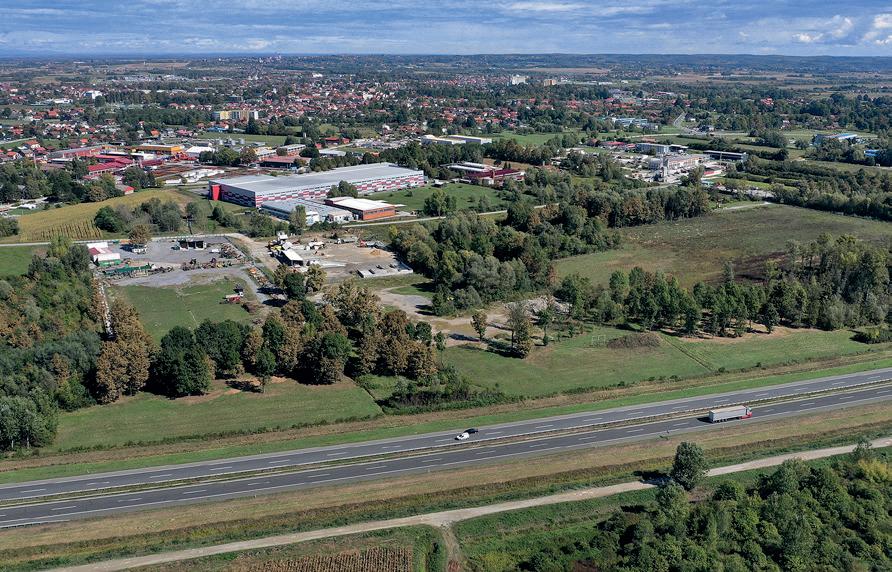
FOR INVESTORS, IT OFFERS SOMETHING RARE IN TODAY’S COMPETITIVE LANDSCAPE — A SECURE, SUPPORTIVE, AND INSPIRING ENVIRONMENT WHERE IDEAS CAN TAKE ROOT AND GROW
ZCPC collects, manages, and analyses critical data on business zones across the county — 57 in total — thus creating a comprehensive database that investors can access through the Green Ring platform. This digital map highlights available land plots, infrastructure readiness, and key investment benefits in each municipality. This integrated approach has positioned Zagreb County as a national leader in balanced regional development — one that combines economic growth with environmental awareness, innovation with tradition, and local potential with global connectivity.
HOTSPOTS IN THE GREEN RING
GRAD – THE ENERGY OF TRADITION AND PROGRESS
Located in the eastern part of Zagreb County, Ivanić Grad represents a successful fusion of tradition, innovation, and forward-thinking investment. Once a historical border town,
today it is a modern business and wellness centre known for its open investment climate and high quality of life. Its internationally recognised Naftalan Spa, based on the unique healing properties of Naftalan oil, has become a symbol of innovation and sustainable development, attracting visitors and entrepreneurs alike. The city features two fully developed greenfield investment zones — Ivanić-Grad North and Ivanić-Grad South 3 — covering more than 90 hectares of well-equipped land. Strategically positioned between major road and rail routes, both zones offer quick connections to Zagreb, the Adriatic, and neighbouring markets. Ivanić Grad stands as a model of sustainable local economic growth and a strategic base for future-oriented industries.
In the heart of the Green Ring lies Jastrebarsko, a town that successfully merges industrial tradition with a forward-looking approach to entrepreneurship. Its flagship project, the Jalševac Business Zone, spans an impressive 354 hectares and ranks among the largest greenfield industrial areas in Croatia. The zone serves as a catalyst for innovation-driven enterprises and manufacturing investments. Strategically located along the Zagreb–Split–Dubrovnik highway (E65/E71) and directly connected to the railway and Franjo Tuđman International Airport, Jalševac offers exceptional logistics potential. Fully equipped with modern utilities — electricity, gas, water, drainage, telecom-
munications, and internal road networks — the zone provides ready-to-build conditions for large-scale industrial and commercial projects. Beyond its infrastructure, Jastrebarsko distinguishes itself by its high standard of living, rich cultural heritage, and professional workforce — factors that make it one of the most desirable business environments in central Croatia.
Just 25 kilometres northeast of Zagreb, Sveti Ivan Zelina hosts one of the region’s most advanced investment areas — the Sveta Helena Business Zone. Covering 122 hectares and divided into northern and southern sections, the zone is strategically positioned along the Zagreb–Goričan highway, providing direct access to Hungary, Slovenia, and broader Central Europe. The northern section is already fully equipped with electricity, water, sewage, and telecommunications, while the southern area is in the process of property and infrastructural development. Proximity to Franjo Tuđman Airport (30 km) and the Port of Rijeka (200 km) creates excellent logistical advantages for companies focused on manufacturing, distribution, and international trade. Investors also benefit from special exemptions for projects serving public or social purposes, such as education, innovation, or cultural infrastructure — ensuring that growth remains balanced and community-oriented.
Positioned in the northeastern part of the county, Vrbovec combines a strong industrial base with a progressive local administration dedicated to business growth and technological innovation. With 520 square kilometres of territory and 30,000 inhabitants, Vrbovec is a regional economic centre, strategically located between Zagreb and major transportation corridors. The Poduzetnik Vrbovec Business Zone, located only one kilometre from the town centre, covers 90 hectares and offers direct access to the Sveta Helena–Vrbovec–Bjelovar highway and the adjacent railway line. The zone is fully equipped with electricity, water, gas, sewage, telecommunications, public lighting, and internal road infrastructure — ensuring immediate readiness for production, service, and logistics activities. Vrbovec provides competitive incentives and reduced utility contributions, along with transparent administrative procedures and professional local support for investors.
While the established industrial zones form the backbone of Zagreb County’s economy, a new generation of smaller, sustainable zones is emerging — demonstrating the county’s commitment to decentralised and inclusive development.
MARIJA GORICA – BOUTIQUE BUSINESS IN A GREEN SETTING
Nestled along the Slovenian border, Marija Gorica offers a peaceful environment only 30 kilometres from Zagreb. Its scenic hills and excellent road connections create ideal con-

IT
ditions for small-scale production, craft enterprises, and sustainable service industries. Plans envision the creation of micro-business zones (5–10 ha) focused on green technologies, creative industries, and innovative solutions — all supported by the county’s incentive framework.
Situated near the Zagreb–Ljubljana railway corridor and just a short drive from the capital, Brdovec is poised to become a logistics and distribution centre for western Zagreb County. Its flat terrain, existing infrastructure, and access to international routes make it an attractive location for warehousing, transport, and light-manufacturing projects. Participation in EU cross-border cooperation programs such as Interreg further enhances its potential for international partnerships.
Located on the northeastern edge of the county, Rakovec offers available land, reliable infrastructure, and local administrative support for business investment. The designated Mlaka Business Zone provides opportunities for modern production facilities, storage centres, and technology start-ups seeking affordable land and proximity to the regional road network. With its streamlined procedures and businessfriendly governance, Rakovec illustrates how even smaller communities can become active contributors to the Green Ring’s economic
ecosystem. These diverse investment locations — from large industrial hubs to compact innovation zones — together form a cohesive and sustainable network of growth. They demonstrate how Zagreb County successfully balances local potential with international competitiveness, offering investors a range of opportunities within one of Central Europe’s most promising economic regions.
Zagreb County stands today as a living example of how strategic vision, institutional support, and local initiative can transform an entire region into a competitive, investor-friendly environment. Through the coordinated efforts of the Zagreb County Entrepreneurship Centre and the commitment of local municipalities, the county has established a transparent and efficient framework for business development — one that connects infrastructure, innovation, and community growth.
The Green Ring concept goes beyond geography. It represents a philosophy of balanced progress — a circular network of cities and municipalities that work together to attract investment, generate employment, and improve living standards. From large industrial zones in Jastrebarsko and Sveta Helena to smaller innovation hubs in Marija Gorica, Brdovec, and Rakovec, each location plays a role in shaping a resilient and diversified regional economy. Zagreb County’s success lies in its ability to combine strategic accessibility with human capital, sustainability, and governance clarity. Its proximity to the capital city, extensive transport links, and comprehensive infrastructure make it not only a bridge between local and international markets but also a model for inclusive, future-oriented regional development. As new technologies, logistics solutions, and sustainable industries continue to evolve, the Green Ring remains a foundation on which new opportunities can thrive.

We see Croatia as a European success story, it is a member of the EU, NATO, the Schengen Area and the Eurozone. We also support what I am convinced will soon be its membership of the OECD
H.E. PROF. DR. PASCAL HECTOR
Ambassador of the Federal Republic of Germany to Croatia
H.E. Prof. Dr. Pascal Hector, Ambassador of the Federal Republic of Germany to Croatia for Diplomacy&Commerce says that Croatia and Germany are partners and friends. And by that, I don’t only mean in politics, the economy, security, science, and all the other issues we tackle together. The bond between our peoples is also very strong.
Germany is a very important, if not the most important, ally in Europe for Croatia. How would you assess the relations between the two countries and are there any open issues between Berlin and Zagreb today?
I like to quote something that the Croatian Minister of Foreign and European Affairs, Mr Gordan Grlić Radman, said in August during the visit of the German Foreign Minister, Mr Johann Wadephul, to Croatia: ‘We are not physical neighbours, but we feel as if
we were.’ To that, I can only add: ‘Very good neighbours.’
We sit next to each other at the same table in the EU institutions. Together with our other European partners, we make important decisions about how our shared home, Europe, functions well and will develop in the future. This is of extraordinary importance; recent developments have made it very clear how much we need to defend this globally unique union of values, securing our freedom and people’s dignity and wellbeing.
We are also actively helping Ukraine against the terrible Russian aggression and engaging in global peace efforts. We support the countries of the Western Balkans on their EU accession path, which is neither easy nor short. Croatia knows this from experience, and we are inspired and guided by this experience as we support Croatia in taking its deserved role in EU enlargement.
There are no open issues between our two countries, and I am pleased to have had the opportunity to become the German Ambassador to Croatia and to play a part in the lively, multifaceted exchange that takes place daily between our two countries.
development. Right now, we need to make the Union more efficient at making decisions. This is evident with 27 member states, and becomes even clearer when we consider all the candidate states that will one day become full EU members.
Future members are another issue on which we need to work closely together. Croatia understands the importance of enlargement very well, especially in its own neighbourhood, and Germany wholeheartedly supports it. Stability, respect for democratic values, strong and functional institutions, and a thriving economy are vital in securing what we often call ‘our way of life’. This is a key interest of Europe in securing a successful future. Enlargement is in the strategic interest of Europe, but at the same time we must ensure that we remain efficient in our decision making.
Helping Ukraine to fight off Russian aggression is another task that we must undertake together with our EU and NATO partners, as well as our allies around the world. Make no mistake: this war concerns all of us. It affects the values we hold dear, as well as directly our security and prosperity. We are grateful to the Croatian government for participating in this joint effort.
What would you highlight as particularly important in further strengthening mutual relations and through which projects and how to realize it?
All we need to do is look at a world map to see clearly that our first priority must be to strengthen the European Union and its global position. We – and
WE NEED TO MAKE THE UNION MORE EFFICIENT AT MAKING DECISIONS
by ‘we’, I mean not only Croatia, but also Germany and all the other member states – are small players on the global stage if we stand alone. It is the EU that gives us global strength and is the only instrument, which enables us to participate in the setting of global rules. But for this to happen, we all share a joint responsibility.
The European Union is a constantly evolving project of adjustment and
In addition, we need to further enhance our already strong bilateral cooperation. Just as an example, over the past ten years, German trade with Croatia has grown faster than with any other EU member state! We must build on this success by supporting investment and fostering relations between our economies in every possible way.
A large number of Croatians live in Germany. According to estimates by the Central State Office for Croats Abroad, around 500,000. An increasing number of Germans are buying real estate and moving to Croatia. How would you assess the economic cooperation between the two countries, especially in the field of tourism?
As previously mentioned, there is high growth in our trade and economic relations. According to a regular study published by the German Chamber of Commerce Abroad, the largest bilateral chamber of commerce in Croatia, German investors are keen to do business here, with the vast majority of them willing to invest in Croatia again. There are numerous German companies in Croatia, many of which are export-oriented and have a global presence. Croatian products of all kinds have a market in Germany, and I am convinced that our economic relations will continue to grow. However, I will say once again that this cannot happen on its own. It is a shared responsibility.
Tourism plays a significant role in our economic relations and is also an important industry for Croatia. However, tourism is not just about the economy. Every year, more than three million Germans visit Croatia to enjoy their holidays here. This is extremely important in terms of building friendship and trust between our two peoples. Together with Croats living and working in Germany, this forms the fabric of our relations. Germans know Croatia and its people, and they feel at home here. I am confident in saying that the same applies to Croats when it comes to Germany and Germans. In the face of the global challenges that surround us, it is precisely this bond that enables us to achieve success together.
However, we should not concentrate only on tourism. It is the industrial sector that needs further growth and development in the first place. There are ample opportunities for further Croatian-German cooperation in this field, especially in the armament industry, that has gained a much stronger importance due to the Russian aggression. We need to give a common signal of strength to deter Russia effectively and thereby ensuring peace for our countries in Europe.
Throughout history, Germany has had a great influence on this area. What is the embassy doing to promote cultural cooperation between the two countries? What programs and projects could you announce and suggest to us? In the field of culture, we are happy to be able to rely on our important and globally present partner, the Goethe Institute. Supporting the learning and knowledge of the German language, international cultural cooperation and exchange is an important part of our mutual understanding. One important issue we collaborate on is the teaching of German at schools and universities. To this end, we have another vital partner: the Central Agency for German Schools Abroad (ZfA). We support teachers, professors and institutions where German is taught as a foreign language in many different ways. This ranges from providing pedagogical advice and training to offering continuous learning opportunities and financial and administrative support, as well as developing and executing German language exams.
The Goethe Institute supports and organises a wide range of cultural events and projects that cover various aspects of cultural exchange. These include exhibitions, lectures, workshops, theatre productions, film screenings, music events, book readings, media incubators and research projects, among others. The Goethe Institute also collaborates with numerous Croa-

I AM NOT HERE BY ACCIDENT. I CHOSE CROATIA
tian institutions and organisations to promote German culture and cultural exchange. Allow me also to mention the Goethe Institute’s library, which has a wide selection of books, media, magazines and games. Therefore, together with our partners, we at the embassy have a rich and varied range of cultural offerings and projects that can be enjoyed on a daily basis.
You recently took up the position of German Ambassador to Croatia.
What do you think of Zagreb and Croatia and what is it that you would like to visit, try in terms of gastronomy, and recommend to your friends if they come to Croatia?
First, let me say that I am not here by accident. I chose Croatia; I wanted to be the German ambassador here, and I am glad this has become a reality. For much of my career, I have dealt with European issues, including working actively on the proposal for the European Constitution, which later became the Treaty of Lisbon. I believe that I will be able to apply all my knowledge and experience in Croatia, as I have already mentioned, our common role and responsibility as EU members is at the top of the list of our priorities.
My wife and I like Zagreb and Croatia very much. We feel at home here; we like the country’s pace and character, its natural beauty and particularly its people. We received a very warm welcome upon our arrival and realised right away that the strong friendship
every way possible. We will also increase pressure on Russia by imposing further sanctions and through other measures.
As German Foreign Minister Johann Wadephul recently said, we are ‘cautiously optimistic’. Following the ceasefire in Gaza, we are encouraging the American administration under President Trump to turn its attention to Ukraine, and to work with us, the European Union and other NATO allies to find a peaceful solution. Chancellor Friedrich Merz discussed this with President Trump during his recent visit to the United States.
between our two countries is evident in everyday life. I intend to make every effort to visit and get to know as much of Croatia as possible. I am looking forward to the contacts I will make, as well as seeing the beautiful and diverse parts of the country. I have also heard many good things about Croatia’s delicious cuisine and high-quality wines. This has been more than confirmed so far.
The moneyless situation in Europe is still unstable since the beginning of the war in Ukraine. In Berlin, we have a relatively new government that unconditionally supports Ukraine. The Berlin, Paris, London axis, which supports Kyiv, has strengthened. How does official Berlin see the resolution of that conflict and what are the estimates of how long the war will last? Ukraine wants peace more than anything else. However, this peace must be just and lasting, and all our diplomatic efforts should focus on achieving it. With our continued support, we aim to strengthen Ukraine’s position ahead of negotiations. We will make further efforts in this regard, and we call on our partners to do the same. Our strategic goal is to secure Ukraine’s sovereignty and to strengthen long-term stability and security in the Euro-Atlantic area. Germany and Europe stand ready to work with the US and other partners to help Ukraine achieve ‘peace through strength’. We are maintaining and expanding our substantial financial, military and diplomatic contributions. To date, the European Union and its member states have provided support worth more than 112 billion euros. The German contribution to that is more than 72 billion euros. We will continue to support Ukraine in
Another focal point has been opened that significantly affects Europe - the Middle East and the escalation of violence in that area. How does your government see the solution, in the light of increasingly loud demands for the recognition of the Palestinian state (some states have already done so) and punishment of Israel? What is the policy of official Berlin in relation to this crisis?
Globally, we hope that the recently negotiated ceasefire will hold. This is not an easy or straightforward task in itself. After the ceasefire, comes the crucial first phase. This involves the release of hostages, and means that the people in the Gaza Strip can finally hope for medical aid, food and water, and an end to their terrible suffering. We are optimistic that permanent peace can be achieved. There appears to be a widespread desire throughout the region to establish a path towards genuine peace and reconciliation between Israel and the Palestinians. Germany is playing an active and important role in this process, and we thank our US allies for their initiative.
The people of the Gaza Strip are currently unable to live properly, and the area needs to be rebuilt. Germany and Egypt are planning a reconstruction conference in Cairo, which will be attended by representatives of donor countries. The aim is to discuss practical issues, such as how to rebuild houses and infrastructure. But then the political process must begin. Order must be restored, the country administered and security established. The terrorist organisation Hamas has not disappeared with the ceasefire.
The German government is firmly of the belief that a negotiated two-state solution is the only way to achieve lasting peace and security for both Israelis and Palestinians. We consider the recognition of a Palestinian state to be one of the final steps on the path to achieving a two-state solution. In order for a temporary ceasefire to become lasting peace, a viable political perspective for Gaza is necessary.

Our relationship is strong, built on mutual respect and partnership
JAVED PATEL Ambassador of the UK to Croatia
The United Kingdom is seen as a friendly country in Croatia, and that official Zagreb and London are allies in almost all spheres, for Diplomacy&Commerce confirmed the Ambassador of the United Kingdom, H.E. Javed Patel. For our birthday issue, he talks about political, military, cultural cooperation, as well as global issues. Economic cooperation between our countries is good, but could it be better? Of course! - adds Ambassador Patel.
How would you describe the relations between official Zagreb and London and are there any open questions between the two countries?
Our relationship is strong, built on mutual respect and partnership.
I’ve seen that clearly in my first two months here. Wherever I have travelled0, whether that be Istria, Slavonia, Dalmatia, Dubrovnik or Zagreb, the welcome has been warm and friendly. At the same time, our ties are deep, historical,
ing Royal connection! The warmth and affection that people in Osijek and Kopački rit still feel about The King’s visit there in 2016 is wonderful to see. And just weeks ago, British and Croatian soldiers were in trenches in Gašinci, training
TRADE BETWEEN THE UK AND CROATIA CURRENTLY STANDS AT AROUND 2 BILLION POUNDS
cooperative, and always looking ahead. I see a genuine desire in those I meet to stregthen our patnership, a desire and ambition I share.
I had a recent opportunity to see the original birth register of the great grandfather of King Charles III, Franz von Teck, who was born in Osijek back in 1837 – a fascinat-
Beyond these official exchanges, we also share a passion for culture and music. I was so impressed with the Arena amphitheatre in Pula recently, but I would love to be there for a concert – I heard that British artists such as Robbie Williams, Florence and the Machine and Artic Monkeys were brilliant there!
When it comes to people, British travellers love this country and we see that with the rising number of our tourists every year. Having seen so much already of this beautiful country, I can absolutely see why: A beautiful coastline, incredibly stunning islands, as well as a rich history and culture. Croatia has it all, and I’m looking forward to learning so much more about it.
The relations between the two countries are best illustrated by economic cooperation. What do the figures show, what kind of economic cooperation is there, which sectors dominate and how much interest do British companies have to invest in Croatia?
Trade between the UK and Croatia currently stands at around 2 billion pounds. We want it to be more. I mentioned tourism, but there are opportunities to work together in energy, infrastructure, defence, IT and tech. Croatia features very high globally for unicorn creation, thanks to Infobip and Rimac and both companies have established their hubs in the UK. This highlights Croatia’s strong innovation in the technology sector, which is where we see the opportunities for more collaboration. Croatian start ups are also very successfull in fintech, AI, mobility, clean tech and health innovation – all sectors where the UK has both strategic need and investment capacity. We hope that the latest UK Industrial Strategy will create opportunities for even more collaboration of businesses.
together as they have been over the past decade to strengthen our defence and security partnership.
I’ve seen UK and Croatian companies working together to develop the latest technologies, UK experts talking about AI in Croatia and soon we’ll have Croatian experts in the UK sharing experience of off-shore energy.
The UK is one of the largest non-EU investors in Croatia, with more than €500M of investment in 2021-2024 in energy, retail, IT and tech and the food industry. These companies are taking advantage of the unique position of Croatia (EU, Eurozone, Schengen and soon OECD) which offers great access to other European and non EU markets. The UK also has a lot to offer: Since the start of the year, we have seen the fastest growth in the G7, the IMF has upgraded our growth forecast for 2025 for a second time in a row and they expect the UK to see the second highest growth in the G7 this year.
I already had the opportunity to visit some exceptional Croatian companies who I know are keen to do more with the UK. In parallel, I want to see even more UK companies investing in Croatia and am keen to work in partnership with the Government here to strengthen our business ties.
But we cannot do it alone. Organisations like the British Business Chamber Croatia and the Chamber in the UK are also setting the foundation for deeper partnership. This November, we’re hosting the UK-Croatia Business Forum, jointly with British Business Chamber Croatia and Croatian Chamber of Commerce. The event should present the opportunities for UK and Croatian companies to engage with partners, strengthen trade, investment and business collaboration.
Based on your activities, we conclude that you also pay great attention to military cooperation. What would you highlight and in what direction is it developing?
Our defence partnership with Croatia is deep and getting stronger each year. I was pleased that in my first weeks as Ambassador here I was able to join Deputy Prime Minister and Defence Minister Anušić for our annual joint military exercise Sava Star near Osijek. We spoke about areas in which we could strengthen the partnership and I hope we can do more together. You may also be aware that the UK Red Arrows display team train here each year and these are just two of the many activities we undertake together.
Croatia has played a positive role in supporting Ukraine against Russia’s unprovoked attack. As friends and NATO allies we need to do more together for our collective security.
We have a new Defence attaché joining our Embassy this month and I expect he will receive the same warmth and welcome that I have. Together we aim to make further progress on what is already a strong partnership.
What challenges does British society face today and how do you solve them, and how are they related to challenges in the rest of Europe?
The UK, like many countries in Europe, is facing challenges with cost of living, perceptions of increased inequality and the causes behind it. We know that the entire world has suffered from high inflation, some of it a legacy from the pan-
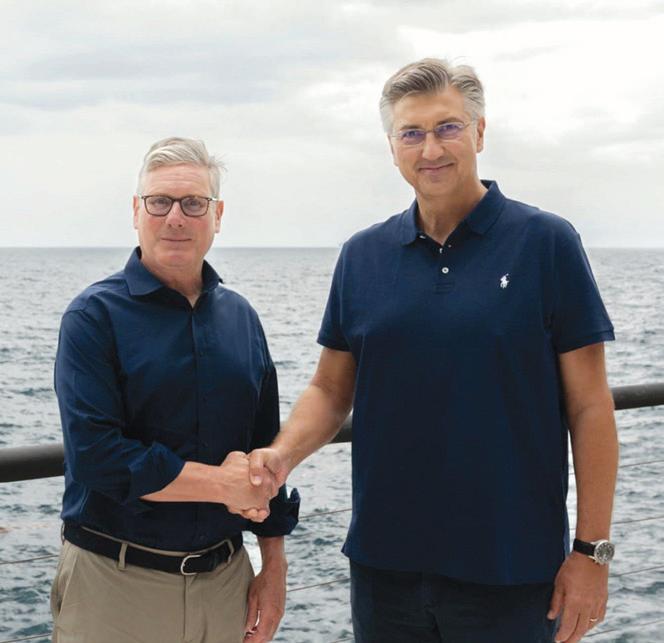
WE HAVE A NEW DEFENCE ATTACHÉ JOINING OUR EMBASSY AND TOGETHER WE AIM TO MAKE FURTHER PROGRESS ON WHAT IS ALREADY A STRONG PARTNERSHIP
demic, from conflict and other global shocks.
Our job is to work with countries who share our values and want to improve opportunities for our peoples. Whether you are British or Croatian, I think we all want greater opportunities for our children, to learn, to grow in a happy, healthy and safe environment, and to succeed in life. If everyone in society feels like they have a stake in it then I believe strongly these challenges can be overcome. But I don’t underestimate them. We are living in turbulent times and it’s important that our values around democracy, equality, diginity and respect are defended.
The government in London, as well as in Zagreb, is giving great support to Kiev in its war with Russia. How does Prime Minister Starmer’s cabinet view the end of that war in terms of ending it as soon as possible?
Like the rest of Europe, and the world, we want to see Russia end its unprovoked and illegal war against Ukraine. We are working hard with the US, Ukraine and other partners to secure a just and lasting peace. However, Russia has so far not engaged seriously with peace efforts. The war could end
profound relief that will be felt all around the world, but particularly for the hostages, their families, and for the civilian population of Gaza, who have all endured unimaginable suffering over the last two years. This deal is welcome progress. But the path to a lasting peace is long and will need continued negotiation and good will on all sides. You can see from statements at the UN General Assembly that the world is watching closely, that there is a desire to see an end to all hostilities and for an enduring peace. I hope and pray that this can be achievable as soon as possible.
You’ve been in Croatia for a while now, what are your first impressions and what would you single out as the most interesting detail in describing Croatians so far? What would you recommend to friends who are coming to visit or try in Croatia, and what would you recommend to us in your homeland?
tomorrow. But Putin has instead ramped up his attacks against civilians and civilian infrastructure in Ukraine.
The UK and Croatia have been steadfast in our commitment and support to Ukraine, including through our military support, humanitarian aid, and financial assistance. We will continue to support Ukraine for as long as it takes.
Speaking of global conflicts, the war in Gaza is one that the Western world is most interested in. What is needed for lasting peace in the area and is it really possible? You also have direct experience, just before your appointment as ambassador to Croatia you worked on supporting British citizens who wanted to leave Gaza. What is the situation in the region and on the ground?
The situation in Gaza is desperately sad. My Government has been clear that the only solution to a lasting and durable peace involves two states living side by side where both Palestinians and Israelis can live in safety and without fear.
I was delighted to hear the news of a ceasefire and the release of Israeli hostages, brokered by President Trump. This is a moment of
“Wow” is probably the only word I can use to sum up my first impressions. This country is stunningly beautiful. I often say that I have had the pleasure in the past two months to travel from one beautiful part of the country to another, and it has been non-stop since I arrived. From the beautiful islands of Vis, Brač and Brijuni, to stunning cities like Pula, Dubrovnik, Osijek and Split, I have had a wonderful journey so far – and I know there is so much more to see.
I expect to have no shortage of visitors. It’s impossible to recommend a favourite place, but I would say to friends and family to look beyond the more obvious parts. Of course the coast is stunning, but Croatia is so much more. Explore the culture, enjoy the cuisine and take advantage of the warm hospitality.
And for those wishing to travel the other way...I am biased, and as a Londoner, to me it is the greatest city in the world. It has so much to offer. It’s beautifully diverse, has so much culture and history, as well as boasting some of the finest restaurants in the world! And for those who can get hold of a ticket go and see the greatest Premier League football team in the world, Arsenal. You got it: I’m a passionate Arsenal fan and was delighted to find die-hard Croatian fans of Arsenal (my new ‘’family’’). But I am also keen to go and watch some Croatian football as I know Croatia has produced some of the greatest footballers of all time.
Our core strength lies in bringing people and businesses together
Director of the German-Croatian Chamber of Industry and Commerce
Our membership consists of a large array of companies with different backgrounds and industries. Another thing that sets us apart from other business associations is our integration into the worldwide AHK network. With over 150 locations in 93 countries, we are not just a chamber in Croatia – we are part of a global network that connects companies with German industry and international markets. This gives our members access to insights, partners, and opportunities that extend far beyond national borders, for Diplomacy&Commerce says Mr. Timo Pleyer, Director of the German-Croatian Chamber of Industry and Commerce .
AHK is one of the largest foreign chambers of commerce in Croatia. How many members do you have, what do you offer your members and how do you differ from the competition?
The German-Croatian Chamber of Industry and Commerce has over 360 members today, making us one of the largest and most influential foreign business networks in Croatia. Our core strength lies in bringing people and businesses together – we create connections that matter. We offer a wide portfolio of services, but what members value most are our networking opportunities and business delegations, complemented by projects that connect companies with innovation and sustainability topics. Our membership consists of a large array of companies with different backgrounds and industries. What they all have in common is a genuine belief in collaboration, which makes our business community open to new ideas and initiatives, which is something we are very proud of. This is also the feedback we receive from our members on a daily basis.

GERMAN COMPANIES ARE NOT JUST BRINGING CAPITAL INTO CROATIA, THEY ARE BUILDING PRODUCTION FACILITIES, AND PARTNERSHIPS THAT CONNECT PEOPLE, PROCESSES, AND KNOWLEDGE
How would you assess the economic relations between Germany and Croatia? Which segments of the economy and which industries dominate? Germany was the main partner country for Croatian exports in 2024, accounting for around 12 percent of total exports, with an

Ljubav koja traje zauvijek.
Jednom Miele, uvijek Miele.
export increase of 2.3 percent to €2.9 billion. Imports from Germany rose by nine percent, reaching €6.2 billion. The main drivers are machinery, IT services, energy projects, and tourism. Germany is also a key supplier of industrial equipment, automotive parts, and chemical products, while Croatian companies provide IT solutions, food products, and increasingly, high-quality services. What is important is not only the volume but also the diversification of our bilateral exchange – we are moving from traditional trade toward more innovative and knowledge-driven cooperation.
When we talk about investments, they are expectedly on the German side. What is the level of investment, how much is it two-way and what do you expect in the future when it comes to investments?
Germany has long been one of the leading foreign investors in Croatia, with a foreign direct investment stock of around €3.37 billion in 2023, according to the Croatian National Bank. What makes these investments remarkable is not only their size but also their quality – they are long-term, sustainable, and innovation-driven. German companies are not just bringing capital into Croatia, they are building production facilities, and partnerships that connect people, processes, and knowledge.
Recent examples illustrate this dynamic very well. BMW and the Faculty of Mechanical Engineering in Zagreb (FSB) have entered into a strategic project to develop cutting-edge AI models for production – a cooperation that links Croatian academic excellence with industrial innovation from Germany. Porsche eBike Performance has chosen Croatia as the site for its future battery production, ensuring close cooperation between development in Zagreb and manufacturing in Sveta Nedelja. FRAMOS is investing more than €6 million in a high-tech campus in Čakovec to expand its vision systems business, while COBE’s Osijek office shows how GermanCroatian collaboration in digital development is thriving.
At the same time, we also see Croatian companies expanding into Germany, particularly in IT, engineering, and specialized services. A concrete example is Eccos, which has established its German subsidiary Deccos to provide advanced engineering, automation, and energy distribution solutions.
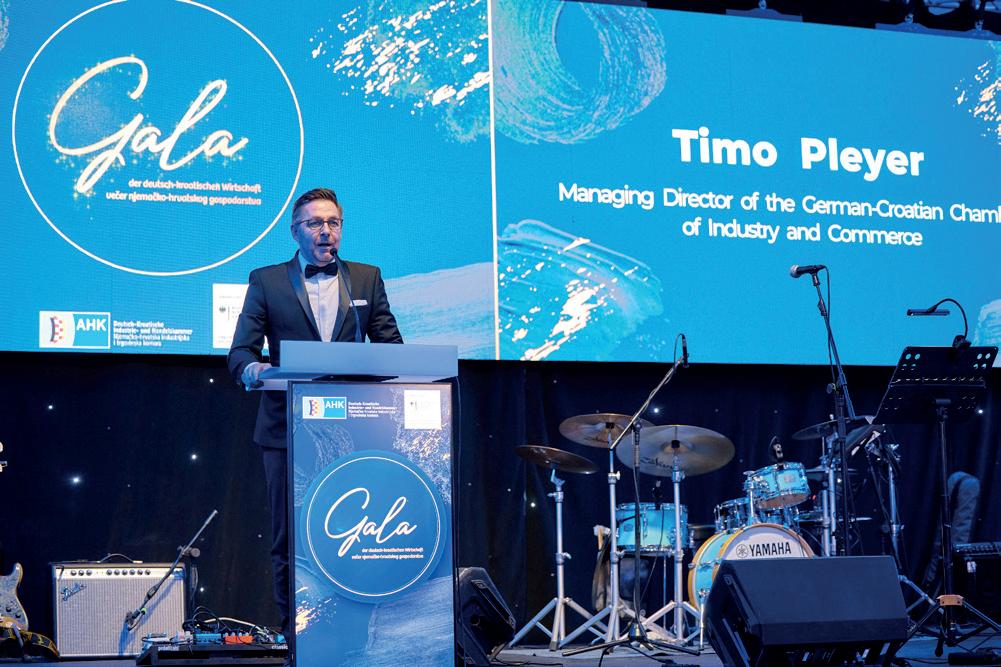
THERE IS STILL A CLEAR NEED TO REDUCE BUREAUCRACY, ACCELERATE DIGITALIZATION OF PUBLIC SERVICES, AND INCREASE TRANSPARENCY
This two-way investment flow shows that our economic ties are becoming more diversified and balanced.
Looking ahead, I expect even stronger momentum in green energy, digitalization, and advanced manufacturing. Croatia’s EU membership, its stable eurozone environment, and the rapidly growing digital ecosystem make it an attractive location for German companies that are seeking nearshoring solutions and sustainable growth opportunities.
How would you rate relations with legislators? How much do they listen to business people and their needs?
Constructive dialogue with policymakers is crucial, and I would say the willingness to engage is present in Croatia. However, there is still a clear need to reduce bureaucracy, accelerate digitalization of public services, and increase transparency. These are recurring messages from our members in this year’s Economic survey and from the business community at large.
We as AHK act as a bridge: we listen to our members, channel their concerns, and present them in a structured way to decision-
makers. Our surveys and position papers regularly highlight where reforms are most urgently needed – from tax and labor regulations to predictability in administrative processes. Progress is visible, but consistency and speed of reforms remain essential for improving Croatia’s competitiveness.
AI is gaining momentum in everyday life and affects every segment of life. Where and how do you see the possibility for AI to improve the production process, decision-making, to be a tool for greater efficiency and not to potentially replace people in their jobs?
Artificial intelligence is undoubtedly one of the most transformative forces of our time. The debate often focuses on fears of job loss, but I see AI primarily as an enabler – a tool to make companies more efficient, to accelerate decisionmaking, and to open up entirely new fields of innovation.
The key is to frame AI not as a substitute for human work but as a complement. Technology should free people from repetitive tasks, allowing them to focus on creativity, problem-solving, and value creation. At AHK Croatia, we are
fostering dialogue on this issue through conferences and delegation trips.
Croatia has established itself as a regional leader in highly skilled IT and engineering talent. With a strong academic foundation, a growing number of tech startups, and internationally recognized expertise in software development, data science, and artificial intelligence, the country’s professionals are increasingly sought after around the world. Croatian IT specialists are known for their innovation, adaptability, and quality of work.
If we were to compare the economies of Germany and Croatia, what are the main differences and what do we here in Croatia need to work on in order to improve our business and raise it to a higher level? Germany and Croatia share strong ties, but they operate on different scales. Germany, with its highly industrialized economy, leads in productivity, innovation, and global export strength. Croatia, while smaller, has made impressive progress – particularly with EU integration and infrastructure modernization. Moreover, Croatia is becoming an increasingly interesting supplier market for German companies. According to our latest Economic Survey, 86 percent of investors would choose to invest in Croatia again, which clearly demonstrates confidence in the country’s potential and business environment.

Kad želite više od kartice, Premium Visa otvara vam vrata svijetu pogodnosti, posebnih ponuda i osjećaju slobode.
isbcountry.com
* Pogodnost vrijedi za prvu godinu korištenja, za pristupnice primljene od 1.10. do 31.12.2025. Ovaj oglas informativnog je karaktera i ne predstavlja obvezujuću ponudu za Privrednu banku Zagreb d.d. i PBZ Card d.o.o.
VISA



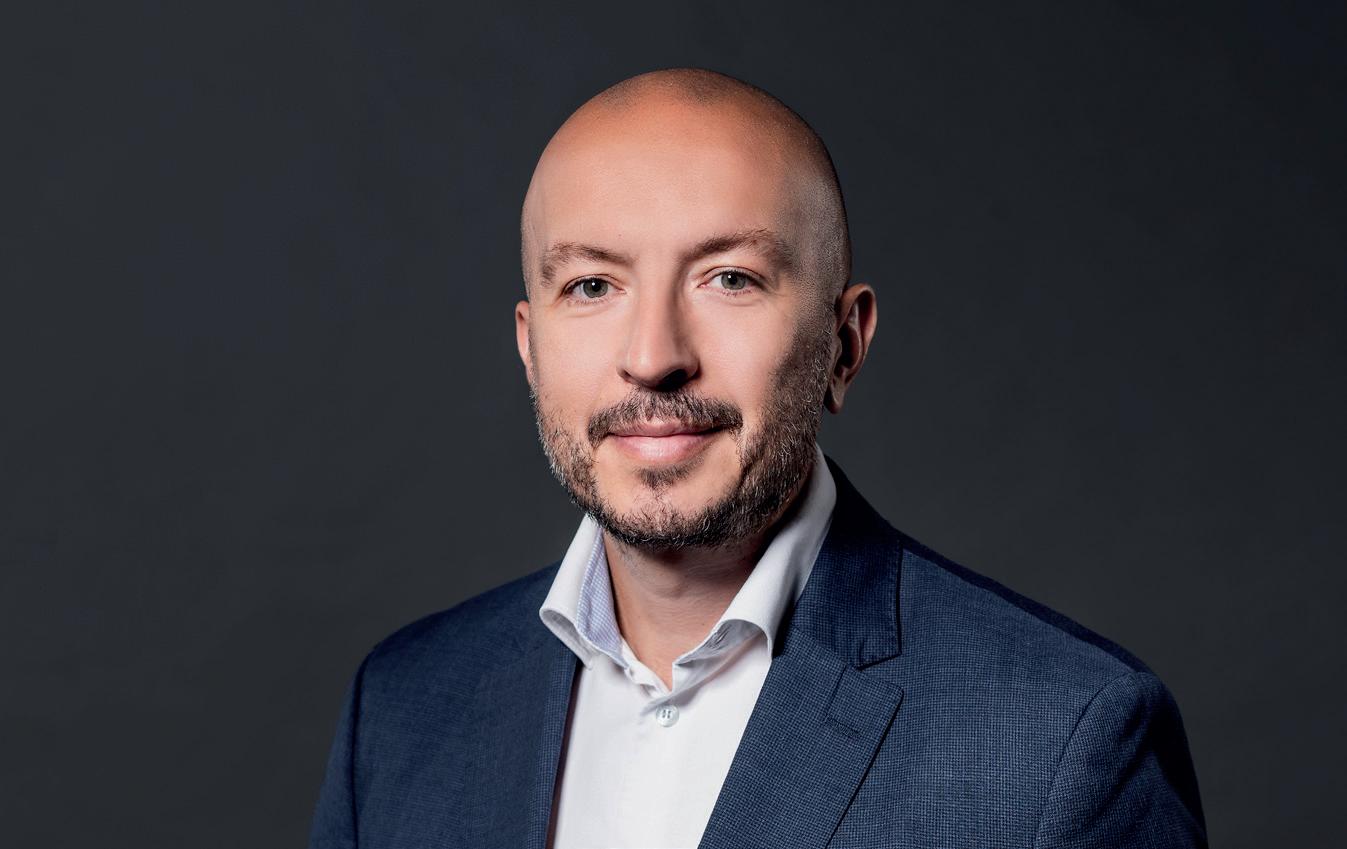
There are clear opportunities for innovation, particularly in oncology, cardiovascular diseases, and rare conditions
LOVRO BOJANIĆ
Governmental Affairs and Market
Access Lead at AstraZeneca
The good news is that the use of innovative therapies in Croatia is increasing. In this regard, AstraZeneca’s portfolio has seen remarkable growth over the last several years, transforming the company into one of the global leaders in biopharmaceutical innovation. The expansion has been driven by a strong focus on oncology, cardiovascular, renal and metabolic diseases, respiratory conditions and rare diseases, for Diplomacy&Commerce says Lovro Bojanic, Governmental Affairs and Market Access Lead at AstraZeneca, says for Diplomacy&Commerce.
AstraZeneca Balkans is strongly expanding its market influence. You recently became the Head of the Market Access and Government Affairs Department
particularly when it comes to expanding influence and driving access in a dynamic environment like Croatia. A thorough market strategy is not
ACCESS TO INNOVATIVE TREATMENTS IN CROATIA IS IMPROVING BUT STILL NEEDS TO BE ACCELERATED WHEN COMPARED WITH EU MARKETS
in Croatia. How important is a detailed market approach and what does it entail from your position? How would you assess the Croatian market? A detailed market approach is absolutely fundamental,
just about knowing numbers or reimbursement processes—it’s about understanding the deep interconnections among patient needs, healthcare stakeholders, economic pressures, and government priorities.
A comprehensive approach starts with detailed market analysis: mapping disease burdens, understanding local epidemiological trends, and identifying unmet medical needs. It extends to the external environment and reimbursement mechanisms. Effective stakeholder engagement is critical: building trusting relationships with governmental institutions, key opinion leaders and medical societies, and patient groups to ensure that innovative therapies are recognized as healthcare priorities. Additionally, our local strategy anticipates potential challenges, such as budget limitations and evolving pharmaceutical legislation. This allows us to proactively develop tailored solutions, educational cam-
Admissions are now open for the 2025/26 school year
High school: Harambašićeva street 19 Primary school: Sveti Duh 122
info@britishschool-zagreb.hr / www.britishschool-zagreb.hr



paigns, facilitate scientific exchange, and support early patient access to innovative medicines. Pharmaceutical market is competitive and promising, driven by ongoing healthcare modernization and a strong focus on quality and improved patient care. Although there are challenges, such as limited public budgets and slower uptake of new reimbursements and innovations, these can be overcome through active stakeholder collaboration.
There are clear opportunities for innovation, particularly in oncology, cardiovascular diseases, and rare diseases. Advancements in digital health, diagnostics, and novel therapies can help raise standards of care and improve patient outcomes. By building strong partnerships with healthcare professionals, public institutions, and patient groups, the market is well-positioned to adopt new solutions and innovation despite existing constraints.
Government relations, the placement of innovative medicines, patient care are one of the most important segments of the company’s development. To what extent are innovative therapies used in Croatia today compared to other EU countries and to what extent compared to other Balkan markets?
The good news is that the use of innovative therapies in Croatia is increasing. However, Progress remains slower than in many Western EU countries. This gap is influenced by a complex and lengthy reimbursement process, significant administrative burden, and restrictive budgets. As a result, access to innovative biologics and novel oncology agents in Croatia remains slower compared to majority of the EU countries. Nevertheless, Croatia is ahead of other Balkan markets in adopting innovation, driven by its stronger awareness of the importance of innovation for improving patient outcomes, and closer alignment with EU standards. However, regional disparities continue to persist.
I can outline that Croatia has made notable progress in securing patient access to several innovative therapies across various therapeutic areas in recent years. In oncology, for example, the introduction of immunotherapies— such as checkpoint inhibitors for lung cancer and melanoma—along with PARP inhibitors for ovarian cancer and antibody-drug conjugates (ADCs) for metastatic breast cancer, has significantly transformed treatment paradigms

AI IS ACCELERATING DRUG DISCOVERY, OPTIMIZING CLINICAL DEVELOPMENT, AND ENHANCING PRODUCTION EFFICIENCY
and enhanced patient outcomes. Nevertheless, considerable gaps remain. Therefore, ongoing collaboration among policymakers, clinical community, and medical societies is essential to further improve timely access for Croatian patients and continue narrowing these differences.
You have extensive global experience in the fields of oncology, hematology, immunology and rare diseases. What does AstraZeneca offer the market when it comes to the most difficult patients today?
How do you stand out from the competition?
In oncology, breakthrough medicines such as targeted therapies and immuno-oncology agents— including innovative drugs for lung, breast, ovarian, and prostate cancers—have significantly improved patient outcomes and earned widespread adoption across international markets.
The introduction of next-generation therapies for heart failure,
being increasingly paid attention to what extent are conventional therapies a thing of the past, and is that the case?
The pharmaceutical industry is rapidly evolving towards more personalized and value-focused care. Today, there is increased attention on digital health integration, early disease detection, and the development of targeted biologics. Conventional therapies, while still crucial in many areas, are gradually being supplemented—and, in some cases, replaced—by innovative and individualized treatments offering improved efficacy and safety.
Artificial intelligence is having a transformative impact, there's no doubt about that and we are all witnessing it. AI is accelerating drug discovery, optimizing clinical development, and enhancing production efficiency. It enables predictive modeling, automation of routine processes, and more rapid analysis of complex data sets. These advances are significantly changing how new medicines are developed and brought to market. All of this facilitates more effective, individualized care and supports better health outcomes.
Outside the professional sphere, you love sports and gastronomy. How would you connect your hobbies with what you do and how much do sports and cooking help you in your work?
chronic kidney disease, and diabetes highlights AstraZeneca’s commitment to addressing pressing public health challenges and improving quality of life. In respiratory medicine, biologics for severe asthma and new inhaled therapies have provided options for patients who do not respond to conventional treatments. AstraZeneca’s expertise in rare diseases is also growing, underscored by strategic acquisitions.
Looking ahead, AstraZeneca’s pipeline is very promising and in parallel the company is also investing heavily in digital healthcare and artificial intelligence, with new solutions designed to personalize treatment and support more efficient clinical development. What we are focused on a local level is the highly engaged collaboration with relevant partners in ensuring equitable access, education, and patient centric approach.
In what direction do you see the development of the pharmaceutical industry, what is
My passion for cooking, pizza making, and gastronomy, along with playing sports like tennis, deeply influences my approach to professional life. Cooking challenges me to think creatively, pay attention to detail, and solve problems—all skills that are invaluable at work. Tennis, meanwhile, reinforces discipline, focus, and strategic thinking, helping me stay resilient and adaptable when faced with demanding tasks or tight deadlines. Both activities provide opportunities for ongoing learning and growth, keeping me open to new ideas and experiences that I can apply professionally.
Sharing these hobbies with family or friends also emphasizes the value of teamwork and communication. Collaborating in the kitchen or on the tennis court builds trust and strengthens relationships, reflecting the cooperative spirit I aim to foster at work. These moments offer balance and a chance to recharge, motivating me to bring fresh energy, creativity, and a strong sense of collaboration to my professional responsibilities.


PIONIRI PRIRODNE I HOLISTIČKE KOZMETIKE EST 1984.

ALQVIMIA Store & Spa, Augusta Cesarca 4, Zagreb
Business operations in Croatia and Slovenia can be compared to those in the most developed EU countries
General manager, Dragon Maritime Adria
Dragon Maritime Group was founded 20 years ago, with its 4 offices located in Koper, Rijeka, Belgrade, and Sarajevo, and we specialize in maritime agency services, focusing on Central Europe and the Balkan region. The company has positioned itself as a leader in its industry, and Marko Škraljsky, General Manager, told Diplomacy & Commerce that their goal for the next five years is to achieve similar progress, particularly through the implementation of new digital technologies. In the continuation of the interview, Mr. Škraljsky reveals more about the company’s plans, challenges, and what sets them apart from the competition.
How would you explain your market position in relation to the competition, and what actually makes the difference?
Exactly – 20 years of doing business in the region, with a continuous upward trend in every respect, is a great achievement we are proud of.
Our growth, as well as the opening of offices in the mentioned cities and countries, was gradual and followed market needs, developments, and the opportunities that arose during certain periods – such as the launch of COSCO’s regular shipping line service to Rijeka and Koper. That service was certainly a strong incentive for us, as agents of one of the world’s largest shipping companies, to firmly establish ourselves in the regional market.
In this market, we are recognized not only as agents but, lately, increasingly more as logistics integrators and shipbrokers, which is the strategic direction of the company and the group.
One of our key advantages and points of difference compared to the competition lies in our flat organizational structure with few
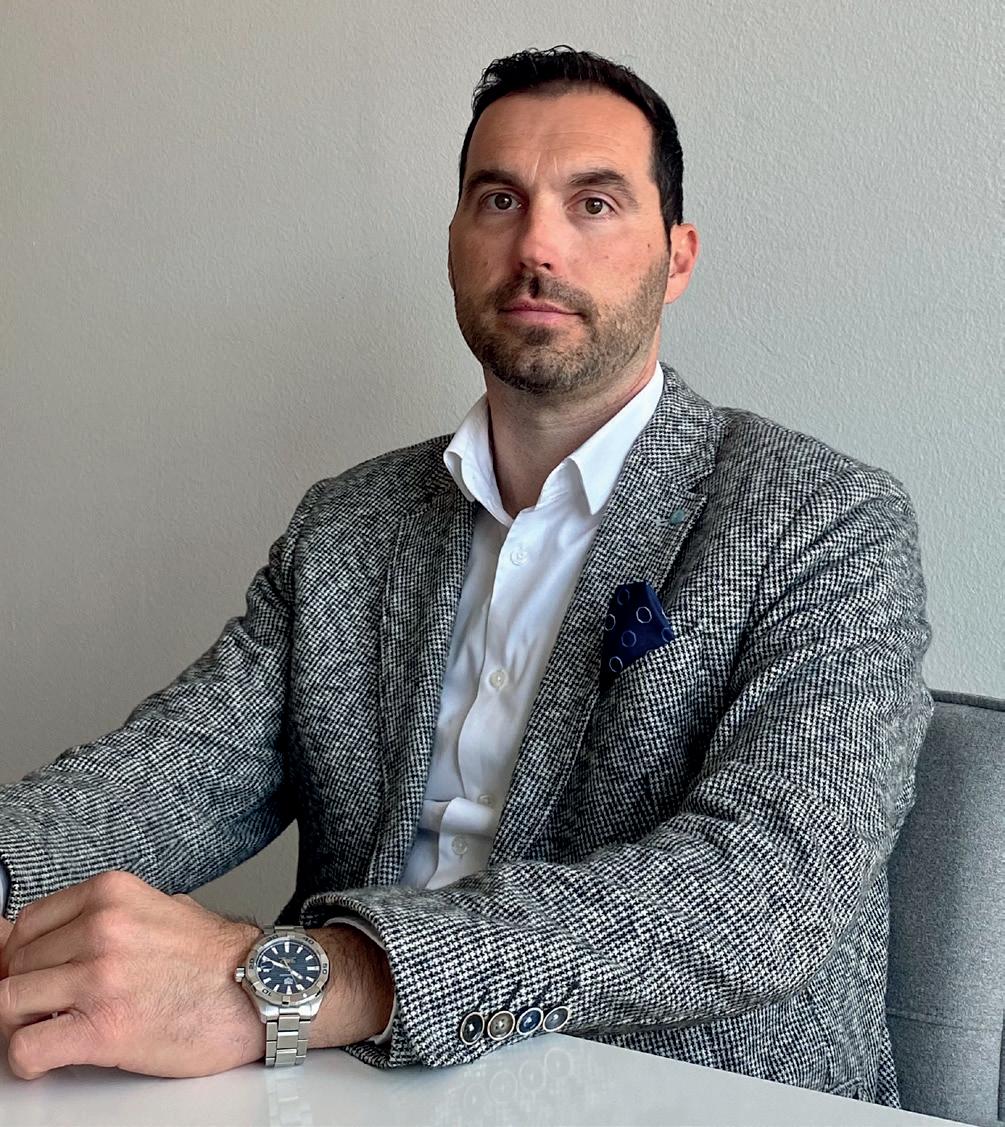
WE ARE RECOGNIZED AS AGENTS AND LOGISTICS INTEGRATORS AND SHIPBROKERS, WHICH IS THE STRATEGIC DIRECTION OF THE COMPANY AND THE GROUP
decision-making levels, which enables quick decision-making and flexibility.
We live in times of wars and inflation, when maritime routes are often closed or transport
becomes difficult. All of this affects the prices of both your services and goods for end consumers. How do you determine the pricing for your services, and how different is the situation (better or worse) compared to 5 years ago or earlier (excluding the pandemic period)?
We considered the “new normal” to be what followed during and af-
ter the Covid-19 pandemic, which it certainly was. However, since then, we have witnessed so many unpredictable circumstances and events – especially in the world of logistics and transportation – that instability has effectively become the constant. Setting prices in maritime transport, particularly on long intercontinental routes, depends on many factors, including the mentioned geopolitical instabilities, making it a very challenging task for ship-owners and operators. The highly risky passage through the Bab el-Mandeb Strait due to Houthi attacks has especially forced liner shipping companies to abandon this significantly shorter route through the Red Sea and instead navigate around Africa.
The second part of logistics begins after the cargo arrives at the port, followed by delivery to the end customer. This involves the entire chain of services, from port terminal operations, customs procedures, and possible storage and delivery to the final destination. How you price this part largely depends on your client and their expectations. If speed of delivery is critical, you will likely use a truck rather than a train, but this service will certainly be more expensive. Some clients prefer a predetermined price for delivery and ancillary services, while others are comfortable negotiating the price once the cargo is already at the port.
In the region, you operate in four countries, some of which are EU members and some are not. What are the differences in doing business between them in terms of legislation, and how is your communication with decision-makers regarding your needs? What are the most common problems? Can business in Slovenia and Croatia be compared to that in the most developed countries in Europe? It is certainly evident that the advantages of the single market and EU legislation are particularly visible in Croatia and Slovenia, as they provide companies with new and simpler opportunities to conduct business with other EU members and to transport their cargo through the ports of Rijeka and Koper. The common currency and, above all, customs procedures, combined with favourable geographic positions, give these ports a significant comparative advantage in attracting cargo from EU countries, particularly Central
Europe. There are still some minor differences in the implementation of certain customs procedures in Croatia, for example, but we are working on this in cooperation with the Customs Administration, and we encounter understanding and willingness to harmonize any discrepancies. Therefore, I believe that doing business in Croatia and Slovenia, which joined the EU, the Schengen Area, and adopted the euro much earlier – can be compared with the most developed EU countries.
How and to what extent does geopolitics affect your business?
Geopolitics certainly impacts our business, as maritime transport depends on international relations, trade routes, and political stability. New customs standards
set by the current U.S. administration affect all stakeholders in maritime shipping. This does not necessarily involve bans or conditions that agents must comply with or monitor, but it influences the decisions of shippers and producers, who may hesitate to send cargo until the situation becomes fully clear, or recipients may refuse cargo already in transit. For example, sanctions against Russia and the situation in the Black Sea have led to the rerouting of certain shipping lines, as well as restrictions on trading most goods with Russia.
The implementation of new technologies in business is essential for further development. How do digitalization and AI affect your
MARITIME TRANSPORT ITSELF IS LESS EXPOSED TO THE INFLUENCE OF AI AND DIGITALIZATION, BUT LOGISTICS CERTAINLY IS EXPOSED

business, in what ways, and are there any new models you are applying?
There is a lot of talk about AI and the disappearance of certain jobs, or even entire business sectors, which has understandably caused some fear and unease among people when AI is mentioned.
The reality, however, is somewhat different. AI is already happening, but it is not some supernatural force that will destroy us. With careful consideration and control, we can derive significant benefits from it across all activities, including shipping and logistics.
Maritime transport itself is somewhat less exposed to the influence of AI and digitalization, but logistics certainly is exposed.
In logistics, optimization is a fundamental aspect of business, and today’s technological capabilities surpass the cognitive abilities of most people. Take, for example, trucks transporting goods from the port of Rijeka to destinations in Europe or our region. Dozens of trucks from a transport company are on the roads daily, and every owner wants to utilize them as much as possible – whether through return trips or additional deliveries to nearby countries –while ensuring they are still available on time for new cargo and contracts already scheduled from the port. Certain applications and solutions can perform these tasks in minutes or even seconds, taking into account kilometres, fuel consumption, required driver breaks, and so on, and can repeat these tasks consistently regardless of the time of day or frequency of requests.
What projects and plans would you highlight in Croatia and the region? Where and how do you see the company you lead in 5 years from now?
At Dragon Maritime, we aim to establish ourselves as a stable and reliable integrator of services in maritime transport, i.e., logistics. I believe we are on the right path, and if we compare the situation to five years ago, we can see a significant difference in our operations and the range of services we offer. Over the next 5 years, we want to achieve similar progress, particularly through the application of the aforementioned digital technologies, which will help us realize our plans while keeping us in direct contact with our clients –a factor we have noticed remains high on their list of priorities.
isn’t looking for a logo — they’re looking for a signature
CEO of DP Lux Group
At DP Lux, we choose brands that stand behind their formulas and their stories, while Belodore delivers the kind of experience that keeps customers coming back, says CEO of DP Lux Group Miloš Milutinović for Diplomacy & Commerce. The niche is not about exclusivity for the sake of exclusivity – it’s about returning beauty to its essence: to brighten the day, emphasize one’s style, and remind us who we are. Our mission is for every customer to enter Belodore curious, and leave with a smile – and a scent they’ll love tomorrow as well. That’s why I believe in continued growth: thoughtful, responsible, and always driven by quality, says Milutinović.
DP Lux is one of the fastestgrowing companies in the region within retail and the beauty industry, particularly when it comes to niche products. How familiar is the market with niche products, and in which segments do they exist?

The niche segment in the beauty industry today is much more than a small circle of collectors - it’s a conscious choice made by customers who seek products with character, a clear origin of ingredients, and an artistic signature. We’re talking about perfumes, skincare and hair care, as well as home fragrances, often produced in small batches, using carefully selected raw materials and controlled distribution. The regional market is becoming more educated every year: customers are looking for meaning, a story, longevity, and the evolution of a scent on the skin. They are no longer satisfied with generic “pleasant fragrances”; they want compositions that leave an impression and convey emotion. The strongest segments are luxury perfumes, advanced skincare with cleaner formulations, and limited collections available in specialized multibrand stores such as Belodore. What sets the niche apart is a deliberate decision not to take the path of least resistance: these fragrances are not designed to please everyone; they have the courage to be
The niche segment in the region is no longer a margin, but a movement toward authenticity IN CHALLENGING TIMES,
IT’S NOT “LUXURY,” BUT A SMALL DOSE OF DIGNITY AND JOY
distinctive and to last. In skincare, this means that composition and results take precedence over marketing phrases. A niche customer is an active participant – choosing a signature, not a logo.
DP Lux currently operates in 15 European countries, with over 1,500 points of sale and more than 200 employees. Which of these 15 markets would you highlight from a business perspective, and what are the differences between the markets in terms of customer preferences and business conditions? (Some countries are EU members, others are not, with differences in legislation and collaboration with decision-makers…) DP Lux currently operates in 15 European countries, with nearly two thousand retail points and a team of over 200 colleagues. Looking at growth dynamics and the depth of consumer
understanding, I would highlight Hungary, Serbia, and Croatia. Hungary is a prime example of market maturity – consumers there quickly embrace more complex compositions and trust brands with a strong creative direction. In Serbia and Croatia, we are seeing a strong influx of new customers entering the niche segment and a noticeable shift toward unisex categories, along with an increasing demand for fragrances with a distinct “signature” character. The differences are clear both in taste and in business conditions.
The Mediterranean taste (Dalmatia, Istria, the Montenegrin coast) leans toward fresh, aromatic, and “sunny” notes that evoke clarity and airiness. The Central European palate (Budapest and beyond) is more open to woody, amber, and spicy compositions – often with a subtle sweetness and a warm, dry finish. When it comes to regulation, EU procedures are stricter but predictable and transparent; outside the EU, we enjoy greater operational flexibility and faster implementation, which requires proactive collaboration with decision-makers and institutions. We turn both environments into an advantage: in the EU, we build consistency in standards; outside the EU, we build agility and speed. The Belodore format allows us to curate our offer locally, time product launches strategically, and enhance sales advisor training so that the customer experience feels the same wherever you walk in – while the offer is smartly adapted to local preferences.
How and to what extent do global crises and inflation affect your business, and how do you anticipate the development of your industry in the coming years?
Inflation and broader uncertainty undoubtedly affect consumer habits, but the niche segment shows resilience. We observe two parallel phenomena: the “lipstick effect” – a tendency to indulge in small luxuries that enhance everyday life during challenging times; and premiumization – less frequent purchases, but more thoughtful and higher-quality ones. In our case, this is reflected in the demand for perfumes
with better longevity, a clear signature, and ingredients whose origin customers trust, as well as a growing interest in the purchase ritual and personalization.
In the coming years, I expect three clear directions of growth:
Transparency and sustainability – from raw material sourcing and responsible use to recyclable packaging and shorter supply chains.
• Personalization – not just monograms, but expert advice in-store, layering, and pairing perfumes with skincare and home fragrances into a unique olfactory ecosystem.
• Experiential retail – Belodore does not just sell a product; we shape the ritual, knowledge, and personal time. This builds loyalty that outlasts market turbulence.
For us, crisis is not an excuse but a lever for innovation: we focus on assortments that provide real value to the customer, optimize complexity, and invest in people and service.
In your opinion, what defines a premium brand, and what is the key difference compared to perfumes and products found in regular perfumeries?
Premium is not just a higher price – it is a culture of craftsmanship. In perfumes, this means top-quality raw materials, mastery in composition, and the courage to preserve the creator’s vision. A premium brand pays attention to every detail: concentration, projection, evolution on the skin, and the tactile experience of the bottle and packaging. The mass-market segment necessarily compromises to appeal to the “average” consumer, whereas premium and niche remain true to character, even if they target a smaller – but passionate – audience. The customer, therefore, receives expression instead of a template. As a company, we select brands with a clear pedigree, transparent formulations, meaningful stories, controlled distribution, and consistent service.
If we divide niche perfumes and products by regions and countries, where do the most popular ones come from? What do they inspire the customers to do, and what makes them special?
Historically, the epicentres of the niche scene are France and Italy, due to their traditions, composition schools, and access to premium raw materials. Over the past decade, the United Kingdom has also emerged strongly, while the Eastern Mediterranean and Middle Eastern cultural spheres contribute richer resinous, balsamic, and oud interpretations – often in modern, airy versions. In our markets – Hungary, Serbia, Croatia, and Montenegro – the most successful brands are those that successfully combine European elegance with the warmth and expressiveness of Oriental sensibilities:
• Hungary – openness to innovation and layered compositions; perfumes that “unfold over time”.
• Serbia and Croatia – strong growth of the unisex category and subtly distinctive signature perfumes that are office-appropriate.
• Montenegro – growth in luxury tourism drives demand for exclusive, limited collections; curated offerings build long-term loyalty.
These products are special because they draw inspiration from culture, landscapes, and materials; every bottle is a fragment of a story that the customer carries. When a perfume has identity, it becomes part of a personal narrative – something that lasts beyond a single trend.
Who is the more frequent consumer of your products, men or women? Is there a trend in the business world, and what do diplomats and ambassadors prefer?
Women still outnumber men in the niche segment, but men are the fastest-growing group. Today’s man experiences perfume as part of his style and communication: he wants a fragrance that signals neatness, reliability, and, when appropriate, a subtle sense of adventure. This drives the popularity of woody-spicy, leather, and aromatic compositions with a clean, dry finish. In the business world, the rule is discreet elegance. A fragrance should be noticeable up close, leaving an impression of professionalism and personal culture, without “invading” others’ space. We often recommend two strategies: a “daytime signature” – timeless, polished, and understated – and an “evening interpretation” of the same theme – deeper and warmer, for events and protocol occasions. Diplomats and ambassadors most often choose perfumes with a clear pedigree and composed complex-
IN THE BUSINESS WORLD, THE RULE IS DISCREET ELEGANCE. A FRAGRANCE SHOULD BE NOTICEABLE UP CLOSE, LEAVING AN IMPRESSION OF PROFESSIONALISM AND PERSONAL CULTURE, WITHOUT “INVADING” OTHERS’ SPACE
ity. Consistency of quality across batches and markets, as well as “readability” in different cultural contexts, is crucial. Here, our curatorial approach, staff training, and controlled distribution make a decisive difference.
What would you highlight as key for brand and business development: public relations, product quality, product perception, consumer lifestyle, ideas, the team you work with…?
For sustainable growth, we rely on three pillars: Product and quality – no compromises. In the niche segment, marketing cannot compensate for missing quality in ingredients or execution; we select brands that uphold high standards and consistently deliver excellence.
Perception and experience – Belodore is an environment consisting of knowledge and rituals. Education, storytelling, personalization, and service quality create emotional value that is remembered and shared, from the first question to the advisor to the evolution of the fragrance at home.
Team and partnerships – our 200+ colleagues are the key difference. Sales advisors listen, ask the right questions, and guide customers toward choices they will love long-term. Relationships with brands and institutions are built on trust and adherence to local regulations.
ESG principles are part of this philosophy: responsible use of raw materials, recyclable or durable packaging, and preference for brands that transparently communicate ingredient origins. Digital tools and CRM help us personalize recommendations – from notes and seasons to occasions – reducing impulsive purchases while increasing satisfaction and return visits. Combined with a broad portfolio and presence in 15 markets, this approach provides scalability: we can quickly validate trends, implement them responsibly, and remain true to local tastes. This is why both niche beginners and seasoned collectors, as well as professionals from diplomatic and business circles, choose us.

NIKOLINA CVITANOVIĆ Member of KentBank Management
The Bank has recently launched the KentPro app, which is the result of our clear commitment to offering cli ents borderless banking – simple, secure, and accessible to everyone, says Nikolina Cvitanović, Member of the Management Board of Kent Bank, for Diplomacy & Commerce. As someone responsible for risk management in the bank, I can say that our greatest success lies in placing innovation and security on the same level, Cvitanović adds.
You are a member of the Management Board of KentBank responsible for risk management. From your position, how would you rate the banking sector in Croatia, and what are the most common risks you encounter?
Today’s banking sector in Croatia is stable, strong, and resilient –perhaps more than ever before. Despite global pressures, geopo litical tensions, inflation, and the changes that have affected almost all industries, Croatian banks have maintained high liquidity, portfolio quality, and client trust. In my opinion, that is the greatest achievement – proof that the sys tem is functioning even in chal lenging times.
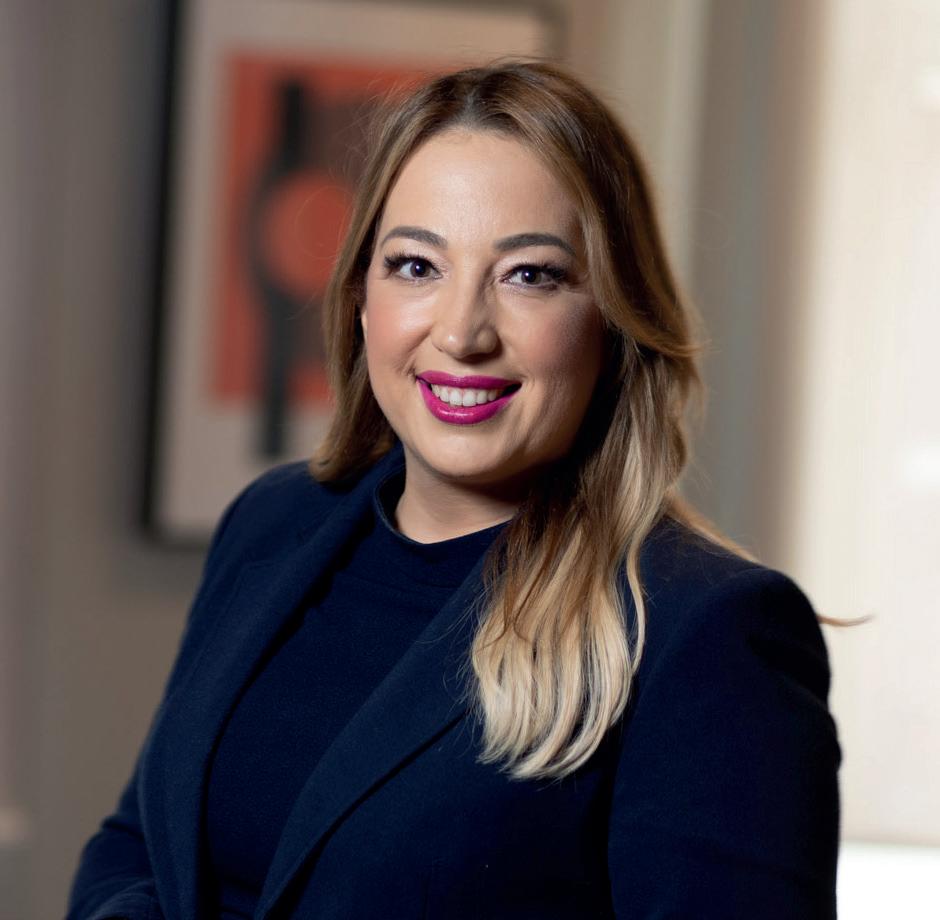
Without underestimating the classic “credit” risk, which remains dominant and ever-present, it is important to note that the overall nature of risks we are exposed to is changing significantly. This very transformation – where risk management becomes a strategy rather than just a control mechanism – makes the difference not only among banks but also among our clients.
We at KentBank have been the fastest-growing bank on the market in three out of the last four years – but with a very healthy portfolio structure. This shows that ambition, growth, and responsibility can go hand in hand. My philosophy is that risk is not a limitation but a compass – it guides us toward sustainable growth and quality clients, which in the long run also builds the bank’s reputation. That’s why our approach to risk is not based on avoidance but on understanding – because when you understand risk, you know how to turn it into an opportunity.
In the past three years, we have been the fastest-growing bank on the market
Today, we devote equal attention to operational risks, protection against cyber threats, and compliance with ESG standards THIS YEAR, THE FESTIVAL OF IDEAS TOOK A MAJOR TURN
In your long-standing experience in the banking industry, what do you see as the biggest challenges in business today? How do crises, inflation, and wars affect strategies and goals, and how does KentBank adapt? What do you focus on?
Challenges in business are always present – only their forms change. Today, there are more of them than ever: banking, traditionally a complex and highly regulated industry,
is now in an era of accelerated digitalization, with clearly defined client expectations and a wide range of their needs, all within a context of changes shaped by global geo-
political instability. Yet, the key question is not what challenges us, but how we respond.
We at KentBank are fully aware of these challenges and see them as part of our business reality rather than as extraordinary events. Once you stop perceiving challenges as shocks and start seeing them as the environment in which you operate, you gain much more room for clear focus and sound decision-making.
We may not be able to change the “playing field,” but we can certainly influence the way we play. That is where the strength of our team lies – in its expertise, agility, and cohesion. In recent years, we have shown that it is possible to grow, continuously improve, and remain true to our values even in dynamic circumstances. All of this confirms that resilience is not built by capital alone, but also through a culture of collaboration and a shared, clearly defined goal.
You recently launched a new app, KentPro. What makes it different, and what exactly does it offer to users?
This is the first application in Croatia that brings together all personal and business accounts in one place, regardless of the bank in which they are opened. In other words, users no longer need to log into three different applications to check their balance or pay a bill – everything is available in one intuitive and free app. What sets KentPro apart is not just its technological sophistication, but the philosophy behind it. The app was developed based on the real needs of clients – to save time, reduce complexity, and provide a sense of control over their own finances. As someone responsible for risk management in the bank, I can say that our greatest success lies in the fact that we have placed innovation and security on the same level. All integrations and transactions are carried out in accordance with the highest security standards, fully compliant with PSD2 regulations. Digital transformation only makes sense if the client knows that a stable system, a professional team, and trust built over many years are what stands behind every new solution. KentPro perfectly demonstrates this – innovation that simplifies everyday life while ensuring a complete sense of security.
Monitoring trends and competition is certainly necessary for better market positioning, but how does AI influence all of this, and what tools does it provide to help you reach end users?
Technology today drives almost every change, but its true value lies in how intelligently we use it. At KentBank, we believe that technology should not replace people – it should help them work smarter, faster, and better. Through automation and robotics, we reduce
routine tasks and create more room for analysis, decision-making, and creativity – the elements that make the difference between being good and being excellent.
From the perspective of my area – risk management, operations, and ESG – our task is to create processes that can grow together with the bank, but also with the society in which we operate. Today we may serve a few thousand clients, but we are building systems and processes designed to support tens of thousands – efficiently, sustainably, and responsibly.
In a business where resources are always limited, success depends on how you use them. Our approach is clear – we are building sustainable, digitally mature foundations that support growth while preserving values we consider just as important as profit: trust, transparency, and a positive impact on the community.
You are also well known for the now traditional Festival of Ideas,
The theme “Ideas That Matter in the Real World” perfectly captures this new direction. We were looking for projects that were already up and running, with a clear impact on the economy, the community, or the environment – and we found them, more than we expected.
The candidates simply amazed us! (and mind you, that’s coming from the Risk side of the bank).
The finalists included some fantastic projects – one improving safety and quality of life for the elderly, a platform facilitating access to local food and small producers, an innovative solution for sustainable vineyard cultivation, a platform connecting startups and investors, and a solution promoting smart energy management.
That’s the true magic of the Festival – the combination of real people, real ideas, and real impact; a movement of optimism and proof that Croatia is full of incredibly smart, hardworking, and creative people who are making the world a better place.
I SET HIGH EXPECTATIONS FOR BOTH MYSELF AND THOSE AROUND ME, AND THAT’S WHAT KEEPS ME MOVING FORWARD
a program that supports projects fostering economic growth, contributing to the community, or protecting the environment. Applications for this year’s Festival of Ideas were open until June 30, 2025. How would you describe this year’s entries, and what is the main theme for 2025?
The Festival of Ideas is an initiative that is especially close to my heart, although it is primarily the result of the vision and dedication of my colleague Aleksandra Cvetković and the team that has shaped it from the very beginning with great energy and passion. I always come back from these events full of emotion – those are moments that truly recharge you, the conversations you remember, and an enthusiasm that is simply contagious. The feedback from everyone who participated was overwhelmingly positive, and I can truly say that the Festival is one of those business experiences I will always cherish.
This year, the Festival took a major turn – moving from inspirational talks and experience sharing toward supporting concrete projects that are changing the real world.
– from my team, my colleagues, and even from the younger generations who bring a fresh perspective and energy. That’s my greatest source of motivation. I’m also proud that over the years I’ve had the opportunity to see many members of my team grow, take on new roles, and assume greater responsibilities – because their growth is also my success. My personal challenge, which I’m still learning to master, is how to keep all that energy, speed, and all those ideas in a rhythm that remains sustainable. But I believe that the true essence of personal growth lies precisely in that balance – between learning, ambition, and mindfulness.
How important do you consider personal development to be for the successful operation of a company, and how do you view the need for continuous learning in your career?
Those who have known me since childhood always smile when they see how many trainings and professional development programs I’ve completed – because they know that traditional schooling was never really my great love. But life has a good sense of humour, and I can say that not a single year of my career has gone by without me learning something new.
From my parents, I learned that success never happens by chance – it comes from hard work, responsibility, and a desire for change – that you can always be better than you were yesterday. Those are the values that have guided me throughout my life. In different stages of my career, that has meant different forms of learning – from the Cotrugli EMBA program to the ever-necessary professional training sessions. Today, more than ever before, I learn from the people I work with
In addition to personal growth, how important is teamwork, which is often emphasized? Why is teamwork so vital, and how does KentBank, as part of the Süzer Group – one of the leading business groups in Turkey – promote and implement teamwork in practice? There is no individual success without a team – it’s as simple as that. And the longer I’ve been in management, the more I realize that the greatest strength of any organization lies in the people who make it. You can have ambitious plans and strategies, but without a team that breathes as one, none of it can truly come to life. In practice, that includes ups and downs, differing opinions, and unexpected situations – but when you have a good team, all of that just becomes part of the journey.
That’s why it’s so important to lead by example and to build together – a culture of collaboration, trust, and support can be felt in every segment of our business, from the way we make decisions to the way we celebrate success. At KentBank, and within the Süzer Group, this culture isn’t just a word on paper – it’s a way of functioning, evident in our daily interactions, openness, and mutual respect.
In my area of responsibility, where we often deal with highly demanding and regulated processes, teamwork is precisely what makes the difference between a good and an excellent result. I’m proud of my team because they are professional, reliable people who are also willing to help one another without calculation. That creates a culture in which we all grow – individually, as a team, and as a bank.
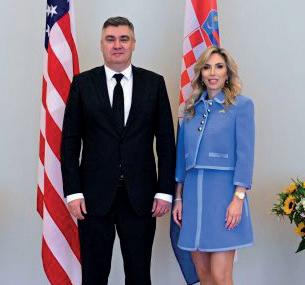
H. E. Nicole McGraw, Ambassador of the United States of America to the Republic of Croatia, with residence in Zagreb, presented her credentials to the President of the Republic of Croatia Zoran Milanović. The United States Ambassador was accompanied by her family members – her husband, Michael McGraw, and daughter, Elizabeth Merrill – as well as the Deputy Chief of Mission and First Secretary of the Embassy, Lauren Perlaza, and the United States Defense Attaché, Colonel Scott McLearn.
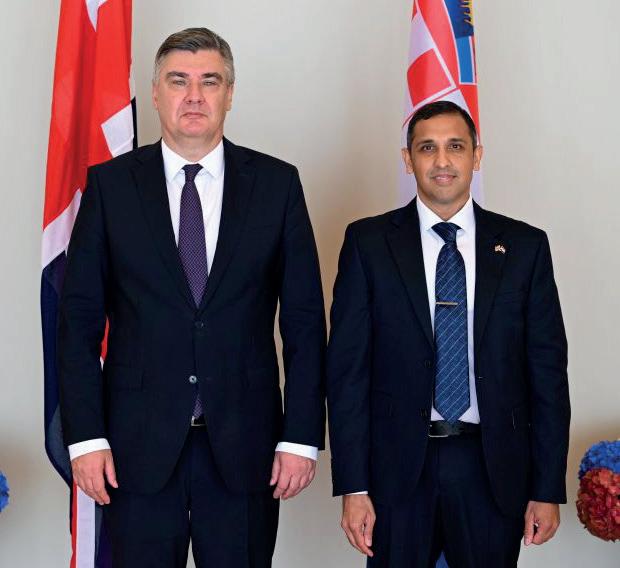
H.E. Javed Patel, Ambassador of the United Kingdom of Great Britain and Northern Ireland to the Republic of Croatia, with residence in Zagreb, presented his credentials to the Croatian President. Accompanying the Ambassador of the United Kingdom of Great Britain and Northern Ireland were the Deputy Chief of Mission Samantha Dunger and Defence Attaché Lt. Colonel Andrew Rupert Adrian Higgs.
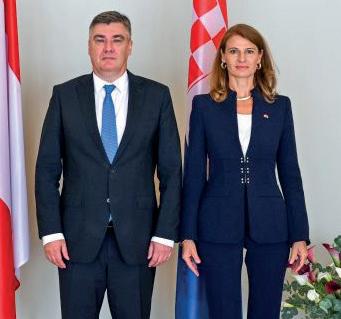
H.E. Yvonne Tončić-Sorinj, Ambassador of the Republic of Austria to the Republic of Croatia, with residence in Zagreb, presented her credentials to the President Milanović. Accompanying the Ambassador of the Republic of Austria were the spouse of the Ambassador Martin Grüll, Minister Plenipotentiary in the Embassy of the Republic of Austria Julia Tiefengraber and Defence Attaché Colonel Jure Johann Bauer.
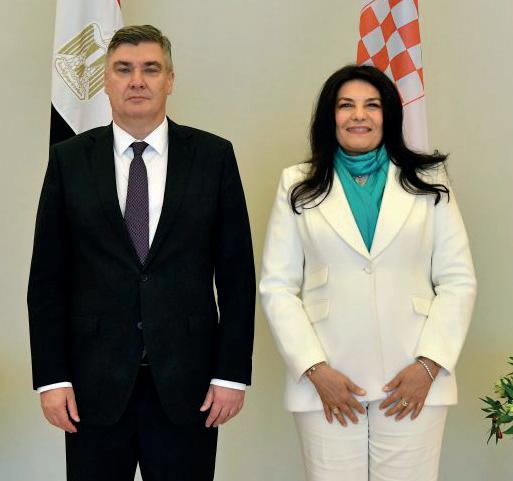
H. E. Ranija Mahmoud Elbanna, Ambassador of the Arab Republic of Egypt to the Republic of Croatia, with residence in Zagreb, presented her credentials to the President of the Republic. Essameldin Mahmoud Aboelfadl Badran, First Secretary at the Embassy, accompanied the Ambassador of the Arab Republic of Egypt.

H. E. Mihail Barbulat, Ambassador of the Republic of Moldova to the Republic of Croatia, with residence in Budapest, presented his credentials to the President of the Republic of Croatia Zoran Milanović. Vladimir Saranciuc, Counsellor at the Embassy, accompanied the Ambassador of the Republic of Moldova. Alongside President Milanović were the Adviser to the President of the Republic of Croatia for Foreign and European Policy Neven Pelicarić, the Director-General of the Directorate-General for Political Affairs at the Ministry of Foreign and European Affairs Tomislav Lendić, and the Assistant Adviser to the President of the Republic for Foreign and European Policy Ivan Mutavdžić.

H.E. Prof. Pascal Hector, Ambassador of the Federal Republic of Germany to the Republic of Croatia, with residence in Zagreb, presented his credentials to the President Milanović. Accompanying the Ambassador of the Federal Republic of Germany were the spouse of the Ambassador Annette Hector, Defence Attaché Lt. Colonel Burkhard Weber and the First Secretary of the Embassy of the Federal Republic of Germany Richard Cuntz.
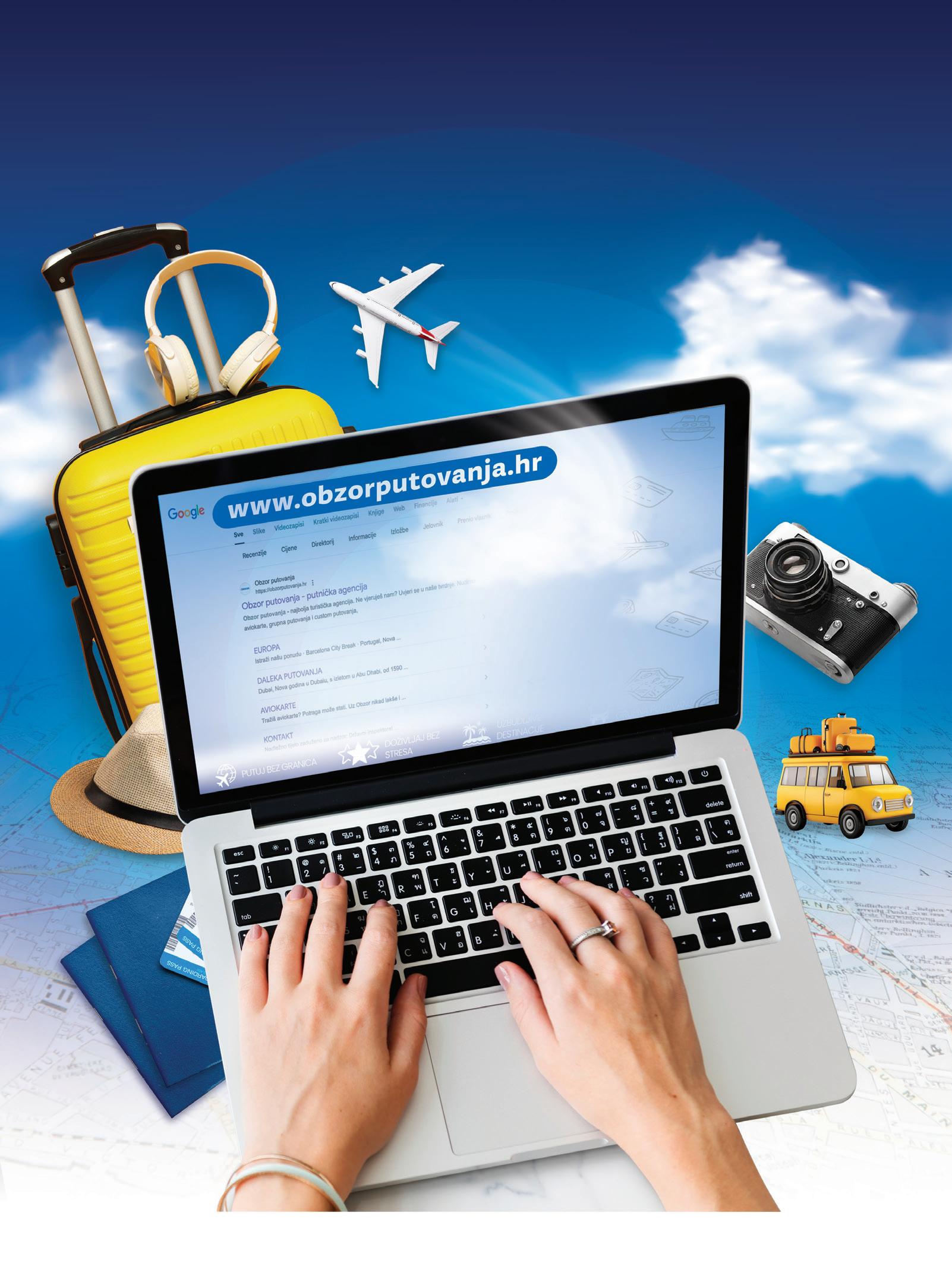

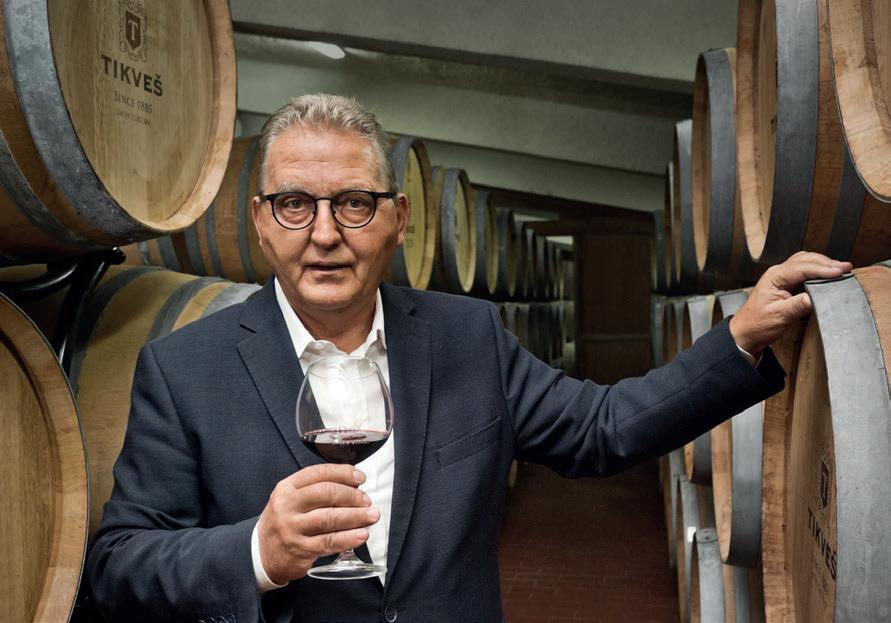
This is a testament to how we can turn time into value
SVETOZAR
Owner of Tikveš Winery
Change is our business imperative – we invest in technology, knowledge, processes, and new generations who continue the tradition with ethics and energy, says Svetozar Janevski, owner of the Tikveš winery, for Diplomacy & Commerce.
I am proud that we have been able to show that even in a country like North Macedonia, you can create a global story if you have vision, honesty, and perseverance, adds Janevski.
Tikveš Winery in North Macedonia is celebrating 140 years this year. You have been the owner since 2003. When you talk about 140 years of a brand, of a business –what comes to mind first? How do emotions, responsibility, and the desire for further development mix?
My first thought is change: deep, everyday, and fundamental. Tikveš would not have survived all these years if its DNA did not contain a culture of continuous progress, learning, and openness to the new. We are custodians of an extraordinary heritage that must endure for future generations. 140 years teach us, but we have thoroughly transformed our approach to viticulture and winemaking. Tikveš combines 140 years of tradition with a modern, responsible approach to viticulture. We are guided by the principle of sustainability, because we believe sustainability is the foundation of future quality. The changes we have introduced
in viticulture are not cosmetic – they are deep, science-driven, and regenerative practices. We have invested in renewable energy and ESG standards, and we are working to reduce our carbon footprint with the goal of net zero by 2050. Responsibility is key – we produce wine, but also trust. For me, Tikveš is a symbol of responsibility toward the land, people, and identity; that is why I took on this commitment. Since 2003, we have worked tirelessly to ensure the continuity of the Tikveš brand and its successful development for at least the next 140 years.
What is Tikveš today, and what are you most proud of so far? You once mentioned that you started working to reduce youth unemployment, but also emphasized the importance of good leadership.
Tikveš today is much more than a winery. Tikveš is a conglomerate of several wineries and estates in North Macedonia and France. We are a leader in the wine industry across the region, not just in the domestic market. We lead in introducing the latest standards in all segments of the business, paving the way for other participants in the sector. I have always said that if we are not the best, we should not be in this business at all. I am proud that my team has embraced this motto and lives it every day. Our goal is to be an example of a company that offers perspective to young professionals, and through the contribution we make to the development of the wine industry, we create opportunities for progress for all involved in viticulture and winemaking. We are building a system of values, vision, and responsibility. Today, we are present in 25 global markets, members of international climate action initiatives, and one of the few wineries in Southeast Europe that is part of the UN Race to Zero initiative. My aim has been to create a culture of work and responsibility and provide opportunities for young talent. We engage foreign experts, share knowledge with other wineries and winemakers, and provide them with monitoring, laboratory services, and education. For me, leadership means creating conditions for the growth of others – recognizing talent, providing support, and sharing success. Tikveš today is an example of how the private sector can drive social transformation.
THE PURCHASE OF CHÂTEAU DE GOURDONA WAS A NATURAL EXTENSION OF OUR MISSION – WE WANTED TO CREATE A BRIDGE BETWEEN MACEDONIA AND FRANCE


Your premium wines – Lepovo, Barovo, Bela Voda, and Babuna – deserve special attention from wine enthusiasts. What makes these wines special?
Every bottle of Tikveš tells a story about the land, the people, and our responsible approach to production. Our premium wines offer a clear identity – this is the authenticity that we want to present to Croatian consumers.
Our premium wines embody the core philosophy of Tikveš: originality, science, and respect for terroir. They are the result of carefully selected micro-locations, each with its own character, microclimate, and identity. Barovo offers the minerality of volcanic soil and special dark varieties like Vranec and Kratošija; Lepovo is our first organic wine, with an aromatic profile shaped by the Mediterranean climate and wild yeast fermentation; Bela Voda combines power and elegance through Plavac and Vranec, and it is highly rated and internationally recognized; Babuna, surrounded by rivers, gives structure, freshness, and complexity through Syrah and Vranec. The premium positioning of these locations (Lepovo, Barovo, Bela Voda, Babuna) provides a unique terroir and quality, which our enologists have transformed into outstanding wines.
Croatia, North Macedonia, and other countries in the region have high-quality wines. In your opinion, what are the main differences in taste and grape varieties, and how should one position themselves in the Croatian market?
The Balkans is a diverse region. Croatian wines often carry sensual elegance and focus on indigenous varieties, while Macedonian wines, due to longer sun exposure, often have lower acidity and pronounced minerality. Vranec gives wines a strong yet smooth body. We see the Croatian market as a regional space of shared values – the goal is not domination but connection and complementarity. We did not come to Croatia to compete, but to build a shared wine story and invite Croatian restaurants, distributors, and wine enthusiasts to
OUR PREMIUM WINES EMBODY THE CORE PHILOSOPHY OF TIKVEŠ: ORIGINALITY, SCIENCE, AND RESPECT
jointly promote a top-quality region and authentic wines. We believe in partnerships and want Balkan wines to become ambassadors of gastronomy and culture.
At the same time, we encourage consumers to try our wines and experience their authenticity and superior quality first-hand.
Since 2018, the Tikveš Group has owned Château de Gourdona in the Rhône Valley, France. How did you decide on this move, and what has been your experience?
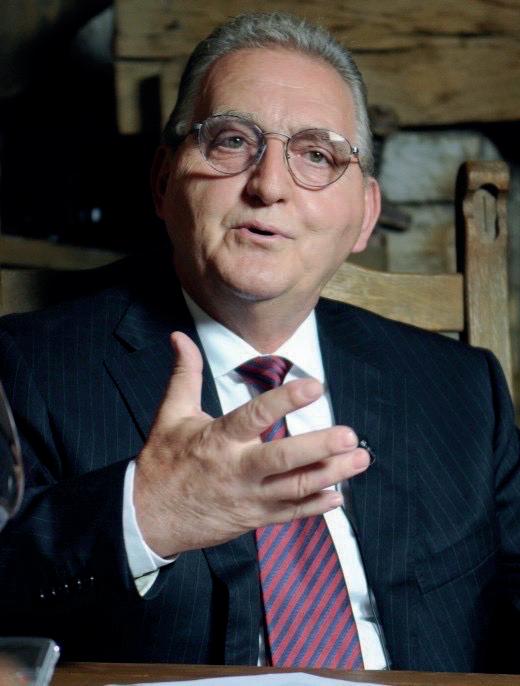
The purchase of Château de Gourdona was a natural extension of our mission – we wanted to create a bridge between Macedonia and France, exchange knowledge, and create opportunities for our specialists. Gourdon will remain a wine gallery and a showcase winery. Surprisingly, we also brought new knowledge to the French – our enologists introduced innovative methods and won awards. This demonstrates that Tikveš and Macedonian winemaking stand on equal footing with the best in the world.
Wine consumption today is essentially a concept of hedonism. In this regard, there is a unique restaurant at the heart of your winery, eight meters underground. A fusion of top-tier wine and cuisine in one placewhat does this concretely entail?
For us, hedonism is not an escape but a return to essence; pleasure must engage all the senses.
The restaurant is a space where wine and food create a ritual – every detail orchestrated to tell the story of the terroir. Hedonism means respect for the land and the consumer. We also produce spirits with the same dedication – with no compromise on craftsmanship.
You leave nothing to chance – proof of this is the Wine Educator, Tikveš’s Wine School. What is its goal, and how important is education?
Knowledge must be accessible to everyone. We have the M6 Educational Center for staff development across various industries, and we at Tikveš developed Wine Educator, accredited by WSET, the world’s largest provider of training in wine and spirits. Its goal is to spread knowledge, create educated traders, hospitality professionals, and enthusiasts, and raise the level of wine culture in the region. For us, education is like planting a vineyard – it won’t yield results immediately, but many generations will benefit from future harvests. Wine Educator and the M6 Educational Center allow us to disseminate knowledge and raise standards across the region.

ANA LJEVAR
Managing Director Humed Pharma
There are no guarantees in business – keeping up with the market is essential
eauty with character” is the slogan of one of the most successful companies in the field of distribution of innovative, science-based care products for women and men – Humed Pharma. The market is changing rapidly, with new companies emerging and others disappearing, but quality, proven products, and dedication to work remain a safe path to success. This was the conclusion of our interview for the birthday issue with Ms. Ana Ljevar, Managing Director of Humed Pharma.
Over the course of 12 years since its founding, Humed Pharma has grown into one of the leading distributors of medical products and dermocosmetics in Croatia, and you also operate in Slovenia and Bosnia and Herzegovina. What was your vision 12 years ago, and has it remained the same? What is your mission?
From the very beginning, my vision was to introduce innovative, science-based products that primarily help women, and then men, to slow down the signs of aging and maintain a natural, healthy appearance. From the start, I aimed for the products to be of top quality, safe to use, and supported by relevant scientific research — in other words, not just a short-lived trend but long-term effective solutions. That vision remains the foundation of my professional work to this day.
What you primarily do is bring world-class technology to Croatia, primarily for doctors. They are your main partners. How difficult is it to reach reputable and well-known names? How secure or guaranteed is your business, or do you have to start over every so often? What are the most common challenges you would highlight in your business operations?
Thanks to many years of work and the reputation the company has built, we now have access to every doctor. Over time, we have developed strong trust—both in our company and in our products—so there is a certainty that everything we introduce to the market goes through verified processes and delivers exceptionally effective results.
Although some products still have no real substitute today, new formulations, ingredients, and trends are constantly emerging. It is important to stay up to date with innovations, but not at any cost—the goal is not to follow trends blindly, but to ensure that what we offer is verified, safe, and truly effective.
The biggest challenge in business is the people. It is difficult to find qualified personnel because young people today quickly change their goals and expectations in the labour market. On the other hand, there is often resistance to taking responsibility. Still, it is important to involve them in processes and motivate them to contribute to the company and the industry as a whole
NO COMPANY CAN BE AN EXPERT IN FILLERS, EXOSOMES, AND DERMOCOSMETICS ALL AT ONCE, BECAUSE IT IS DIFFICULT TO MAINTAIN QUALITY ACROSS ALL AREAS
Over the years, your portfolio has expanded significantly and now includes many renowned manufacturers and brands such as Heliocare, RRS, Aliaxin, TSK, Skin Tech Pharma Group chemical peels, Biretix, Neoretin, Endocare, and Profhilo. How familiar is the end consumer with these brands, how much do they use them, and what is your role in the relationship between you, the doctors, and the end user? To what extent and how does the sophistication and education of consumers influence you and your work? Since, according to current legal regulations, we are not allowed to directly promote medical products to the end consumer, we primarily cooperate with doctors. We also invest in professional articles that illustrate how our products work, but doctors are always at the centre of our activities. Although information is now more accessible than ever and many people believe they know everything, patients still need expert recommendations. The doctor is the one who can give the safest and most appropriate advice, which makes our approach essential to the success of the products
How would you rate your competition? How large is it really — does quality or quantity prevail, and how much mutual respect exists in the business?
Since our industry is relatively small, we know each other well and mostly respect one another. However, new companies keep emerging that expect quick success, which is rarely sustainable—
many of them open and close just as quickly. Even good relationships with doctors cannot make up for problems with unverified products that cause adverse reactions. Also, no company can be an expert in fillers, exosomes, and dermocosmetics all at once, because it is difficult to maintain quality across all areas. The market includes companies specializing in hyaluronic acid, cosmetics, or exosomes, which highlights the importance of a focused and expert approach. For example, the Korean company ExoCoBio, which we represent, is a global leader in exosome production, with an exosome bank, dozens of international patents, and scientific studies. Its quality cannot be compared with a newly established company that promotes itself as producing everything.
Do modern technologies and AI influence your work, and where do you see the greatest challenges in the future, both in terms of business, quality, and market needs?
In my opinion, artificial intelligence can never fully replace humans. It can collect and analyse information, but human knowledge, experience, and skills will always be ahead of technology. AI cannot assess a person, see them, hear them, or understand the nuances that an expert recognizes in direct contact. In our field, for example, AI cannot apply a product or individually recommend a cream—it can assist as a tool, but it cannot replace the human approach. Some of the main challenges are new trends and the influence of social media. Celebrities often promote products, and many people want to achieve the same look, but the same product is not equally suitable for a 15-year-old girl, a 45-year-old, or a 60-year-old woman. Therefore, it is extremely important to emphasize an individual approach and ensure personalized care for each user.
It is difficult to give advice to others, but perhaps the best recommendation is one that we see or desire for ourselves. What do you personally use to maintain such a beautiful and well-groomed appearance? What is the secret of your beauty with character?
My goal is not to look younger, but to look wellgroomed. I primarily use Profhilo, but also Botox, even though our company does not distribute it, because it is indispensable in aesthetic medicine. The foundation of my daily care is high-quality dermocosmetics such as Skinbetter Science. My routine is not complicated—the most important thing is that it is effective and allows me to get ready as quickly as possible.
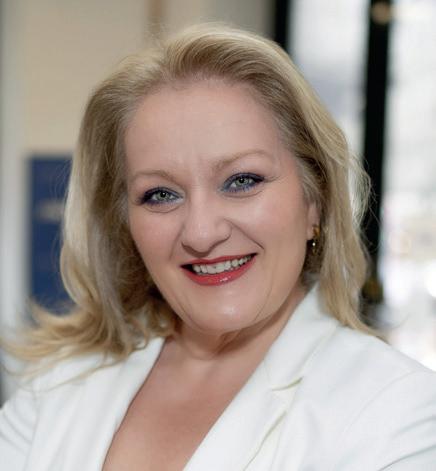
ROMANA ŽIŽAK
General Manager at Obzor Putovanja
Today’s travellers are increasingly knowledgeable and well-informed. They often know in advance what they want, but when they entrust us with organizing their trip, experiences, and impressions, that’s proof of our success in delivering personalized service, says Romana Žižak, Director of Obzor Putovanja, for Diplomacy&Commerce. This agency has been present on the market for 32 years and also serves as the operational agency of the national airline Croatia Airlines. Tourism has been her career path and passion for 17 years, and after all this time, she says that what still brings her the most joy is direct communication with clients, their satisfaction, and a happy team standing behind it all.
You are at the head of an agency that has been operating for 30 years, how would you describe the needs and demands of travellers – the market today compared to 30 years ago?
The market has changed significantly, and we have evolved with it in order to remain a market leader and a reliable travel partner. In the past, the focus was on group packages and standardized arrangements, which made it much easier to shape trends. Today, our travellers are looking for personalized, authentic experiences and flexibility, and we must not forget the growing importance of sustainability. Individual itineraries, wellbeing packages, and eco-tourism are constant topics. Information and destinations are much more accessible than before. The pandemic has left its mark, and digitalization is a recurring theme. With so much information available, there’s also an issue of misinformation, which is equally widespread. In any case, we must be more informed and professional than ever, and, of course, closer and more accessible to our travellers. We design journeys based on different interests, adapt to budgets without compromising quality, follow all specific requests and preferences, and remain available 24/7. That’s our formula for success, and we never deviate from it.
Travel and tourism are highly sensitive industries that depend on many factors beyond your control. What does the Croatian traveller like? What matters to them, and what do they pay special attention to?
Exactly. We depend on a wide range of factors. Even the slightest instability at a destination can drastically change travel plans in a very short time.
Business clients are extremely demanding, seeking speed, precision, VIP service, and flexibility for last-minute changes
That’s precisely where our long-standing tradition and stability come to the forefront – along with constant trend monitoring and our consistent availability to clients wherever they are. Today, Croatian travellers are discovering the entire world – from Croatia itself and Mediterranean destinations such as Greece and Turkey, to more exotic locations like Thailand or the United States. What matters most to them is value for money, safety, and the reliability their travel agency provides. They pay particular attention to the quality of hotels, efficient organization, and personalized support throughout their journey.
WE ARE DEVELOPING A LOCAL AI ASSISTANT THAT WILL SIGNIFICANTLY IMPROVE SPEED AND PRECISION IN TRAVEL SELECTION
“Obzor Putovanja” has distinguished itself as a leading agency on the market, not only in tourism but also in business travel. How demanding are business travellers, and what does the preparation of such a trip entail? Do you also organize individual trips?
Business travel forms the core of our portfolio, and only agencies with the highest service standards, such as Obzor Putovanja, excel in this segment. Business clients are extremely demanding, since they expect speed, precision, VIP services, and flexibility for lastminute changes. Preparation involves flight, accommodation, and transfer bookings, as well as conference arrangements.
We are an authorized agency in Croatia for visa processing for Croatian citizens and for contract verification for companies operating in the Kingdom of Saudi Arabia. We provide 24/7 emergency support, which is crucial for business travellers. In addition, we organize individual trips, which have become both our greatest challenge and reward. We focus on understanding our clients’ needs, preferences, and special requests for authentic experiences, which –combined with our long-standing trust and commitment to quality – makes us one of the oldest and most respected destination companies.
You are also the partner agency of Croatia Airlines. How much does this help you in your business operations, and what is the significance of integration with airlines from a business perspective?
Being the operational agency of the national carrier Croatia Airlines is both a great honour and responsibility, and it is significantly contributing to our credibility and client trust. This partnership allows us to jointly participate in fairs and workshops, especially when introducing new flight schedules. The fleet renewal of Croatia Airlines further strengthens our market position, giving us numerous opportunities to combine a premium flying experience with added travel content and experiences at key destinations that we successfully connect as an agency. It also opens new possibilities for collaboration across European and other international markets.
Integration with airlines is crucial for competitiveness, this is a foundation that enables a wide range of possibilities, sets industry trends, and allows for seamless travel experiences and network expansion.
What are your plans for the upcoming period?
Which destinations are currently popular, and how much do travel preferences change from season to season? How do crises affect prices?
In the coming period, we will continue to focus on top-quality service and a creative approach for our clients, supported by digital development and 21stcentury technologies. We are developing a local AI assistant that will significantly improve speed and precision in travel selection. We will position new destinations and focus on sustainable tourism. Our people remain the foundation and driving force behind our growth and service excellence, just as they were 3 decades ago. We will continue to optimize processes, train our team, combine youth and experience, and adapt to clients’ specific needs.
We can say that the whole world is our stage. Popular destinations include Europe (Spain, Italy), Asia (Japan, Vietnam), and the Americas. Complex economic and geopolitical developments have led to a 10–20% price increase, so we continuously optimize our offers and enhance quality to ensure the best value for money.
24/7 availability, constant support from our travel advisors, and personalization remain at the heart of our service, because this has been our comparative advantage for over 32 years. The satisfaction of our clients, who have placed their trust in us, remains our primary focus.
right Horizons is a launchpad for future diplomats, innovators, and changemakers. It’s where young people learn that the future is not something to wait for, it’s something to create
In an era where knowledge, innovation, and international cooperation define success, education must go beyond traditional frameworks. This is precisely what Bright Horizons International British School in Zagreb has been doing for years - combining the academic excellence of the British system with a modern approach to learning focused on developing global competencies.
As an accredited member of the Council of British International Schools (COBIS), Bright Horizons offers its students access to programs that connect them with peers and institutions worldwide, from international conferences and Model United Nations simulations to visits to key European institutions.
YOUNG VOICES SHAPING THE FUTURE OF EDUCATION
Students at Bright Horizons are encouraged to engage with global issues from an early age. This was powerfully demonstrated by a student who, in May this year, delivered a presentation on Artificial Intelligence in education in front of heads of COBIS schools from around the world.
As one of the youngest speakers at the event, Milena Prodanić Tišma founder of IBSZ Bright Horizons, offered a student’s perspective on

the role of technology in learning, emphasizing the need for balance, using AI as a tool for creativity and understanding, not a substitute for them.
Her speech, widely recognized within international education circles, reflects the school’s culture of encouraging confidence, critical thinking, and articulate self-expression - values that prepare students to take part in shaping tomorrow’s world.
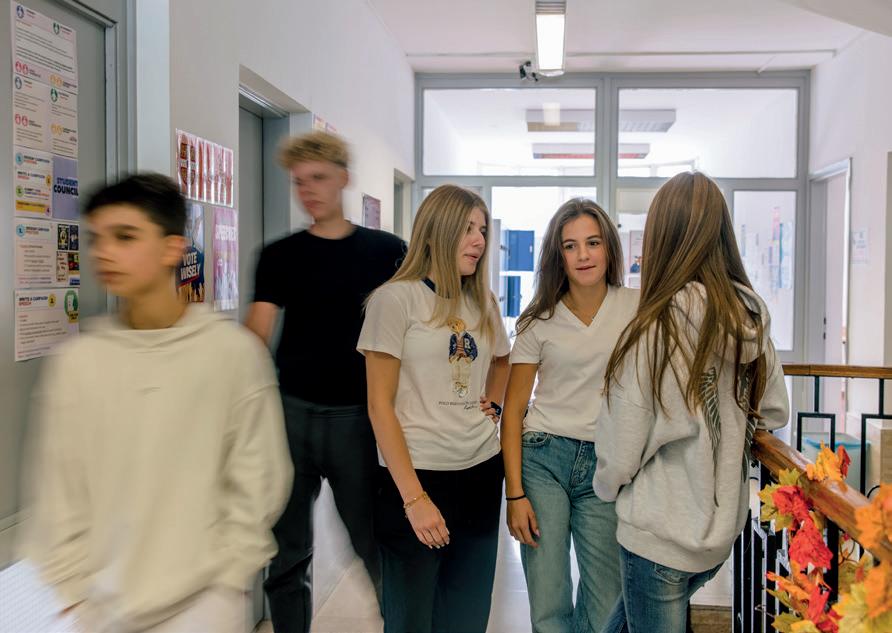
In early September, Bright Horizons’ Year 12 students visited the European Parliament in Brussels, where they had the opportunity to speak with EU representatives and experience how decision-making processes unfold within European institutions. The trip was organised in cooperation with Beta Croatia, an organisation that is actively working to provide young individuals with a deep understanding of the complex inner workings of European institutions through various initiatives.
The goal of such experiences goes far beyond civics education - it’s about understanding the values that define Europe itself: cooperation, dialogue, and solidarity. These same principles are woven into the philosophy of Bright Horizons and form a cornerstone of its educational approach. Learning beyond the classroom, through experiences that connect the students to real-world issues, inspires global perspectives and develops the leadership skills they need for the future.
One of the key initiatives defining the school’s international spirit is participation in the Model United Nations (MUN) program. During the PLISMUN conference, organized in partnership with COBIS, Year 10 students explored diplomacy, negotiation, and conflict resolution through a simulation of UN proceedings.
MUN offers much more than competition; it builds analytical thinking, teamwork, empathy, and global awareness. As the school’s leadership notes, the goal is not only to educate excellent students but to nurture responsible global citizens who understand complex world challenges and are ready to take an active role in addressing them.
Bright Horizons follows the British National Curriculum, enabling students to obtain internationally recognized qualifications such as IGCSEs and A Levels, which open the doors to the world’s leading universities.
However, beyond the academic structure lies a philosophy centered on personal growth, emotional intelligence, and confidence-building. With small class sizes and an individualized approach, teachers encourage curiosity, independence, and creativity. Students are taught not just to learn, but to think - to question, to explore, and to innovate.
This approach helps cultivate adaptability and leadership skills essential for success in the modern, interconnected world.

As part of this unique gastronomic journey, 16 top restaurants across Croatia have prepared exclusive degustation menus for two at a promotional price of €165.93 (drinks not included). Each restaurant presents its own interpretation of terroir, tradition, and local ingredients, offering guests a once-in-a-lifetime dining experience that highlights Croatia’s diverse regional flavours — from the coast to the inland hills.
Behind each plate stands a chef with a story. These are culinary artisans who combine innovation with respect for local roots: from the refined elegance of Dubravkin put in Zagreb, to the coastal charm of Pelegrini in Šibenik,the creative mastery of Monte in Rovinj, or the Mediterranean sophistication of San Rocco in Brtonigla. Whether you prefer modern fine dining or traditional recipes reimagined for contemporary palates, Passion Week with Mastercard is your opportunity to explore the very essence of Croatian cuisine.
This experience is exclusively available to Mastercard cardholders and can be purchased on priceless.com. After booking, guests receive detailed instructions to select their preferred restaurant and reservation time.
The Passion Week with Mastercard program takes place twice a year – in spring and autumn – allowing food enthusiasts to discover seasonal menus and meet the chefs who shape Croatia’s modern culinary identity. Each edition highlights new ingredients, new inspirations, and a new chapter in the country’s fine-dining story.
To make the experience even more rewarding, Mastercard cardholders are invited to join a special loyalty journey. By visiting participating JRE-Croatia restaurants
This autumn, Mastercard and the JRE-Croatia association invite you to experience the very best of Croatian gastronomy through Passion Week with Mastercard – a fine-dining spectacle that celebrates culinary mastery, heritage, and creativity

THE PASSION WEEK WITH MASTERCARD PROGRAM TAKES PLACE TWICE A YEAR – IN SPRING AND AUTUMN – ALLOWING FOOD ENTHUSIASTS TO DISCOVER SEASONAL MENUS AND MEET THE CHEFS WHO SHAPE CROATIA’S MODERN CULINARY IDENTITY
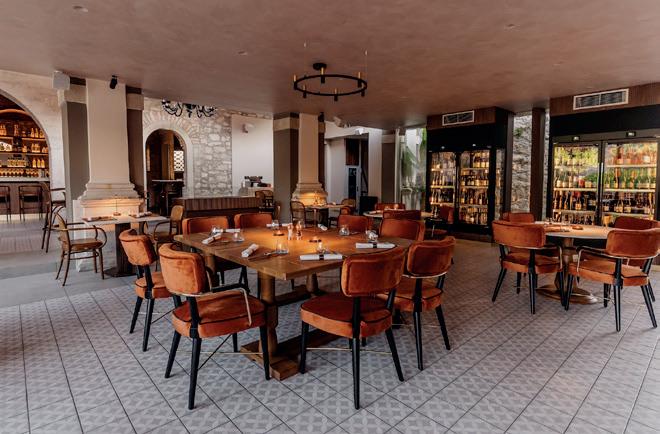
and collecting stamps, passionate gourmets can win a complimentary degustation menu for two in a restaurant of their choice. Collect eight stamps by the end of 2025
and the reward is yours – a way of saying thank you for celebrating the art of fine dining. Mastercard cardholders also enjoy an advantage from the very
beginning: by registering on priceless.com, guests receive two virtual stamps instantly when they access exclusive video recipes and behind-the-scenes tours of JRE restaurants. Each piece of downloaded content reveals how Croatia’s best chefs create extraordinary dishes from local ingredients, combining innovation and emotion in every detail.
As a symbolic touch, guests who dine during the program will receive a small gift — a packet of heirloom tomato seeds prepared by OPG Ćorluka. It’s a simple yet meaningful reminder that culinary passion begins with the earth, grows with dedication, and blossoms in shared moments around the table.
Through Passion Week with Mastercard, every meal becomes more than just dining – it becomes a celebration of culture, creativity, and connection. For Mastercard cardholders, it’s an opportunity to experience what truly is priceless: the taste of authenticity, the craftsmanship of exceptional chefs, and the joy of sharing unforgettable moments with those who appreciate the finer things in life.
Remaining restaurants and dates in the autumn edition of Passion Week:
• Nov 10 – Nov 23: Foša (Zadar)
• Nov 24 – Nov 30: Badi (Umag)
Visit priceless.com and book your fine-dining experience:


Today,
values are changing, and
the world is
returning
to the notion that ‘might is right’, and that will not stop
Croatian historian, political advisor, university professor
I am a historian of the 20th century, particularly of the Cold War. The history of the Cold War is the most dynamic and widely represented sub-discipline, present in virtually every historiography, says Tvrtko Jakovina, Croatian historian, political advisor, author, and university professor, in an interview for Diplomacy & Commerce. Yes, of course I am also a ‘Yugoslav historian’ — after all, what 20th-century history could I possibly study that would be relevant if not that one?, Jakovina explains.
In a country and region where history is part of identity and more than just past events, where everyone has their own
interpretation, what is your opinion – is such an attitude toward history unique to the nations of this area, or is it similar elsewhere?
In many nations, the past is extremely important. When there aren’t many historical sources – and the further north you go, the fewer
even an imagined one – becomes a burden for the future, when lies are embedded into the interpretation of history in a way that suffocates scientific research and ends up guiding society and politicians. Unfortunately, we have all the worst examples of that. And it gets even worse when, decade after decade, you keep hav-
BECAUSE OF THEIR POLITICS, CROATS DO NOT KNOW HOW TO DEAL WITH YUGOSLAVIA – IN ANY OF ITS FORMS
there are for earlier periods compared to us – that often means more mythology. In itself, that doesn’t have to be problematic, provided a society is mature and aware of what science and history truly are. The problem arises when the past –
ing the same conversations with the same people about the same topics. Croatia is one of the rare European societies whose permanent museum exhibitions – with only a few exceptions, no more than five or six – contain not a single mention of Croatia
in the 20th century! Listen carefully: nothing about the 20th century, not a word. Because of their politics, Croats do not know how to deal with Yugoslavia – in any of its forms. To me, that is a defeat of both the profession and the society.
Which peoples of this region would you historically single out as the most important (largest, most influential), and how would you describe the genesis of their relations up to the present? Is it possible to reduce some of the tensions (primarily between Croats and Serbs, then Albanians, then Bosniaks, etc.) through history (even though it seems to be a source of problems)?
Ah, all of them are important, because numbers are often not a measure of success. Look at the Jews in our region and the exceptionally high impact they had. The same goes for Armenians. However, if I were to conclude anecdotally, whenever historians from the region meet, the discussion is mostly between Serbs and Croats, along with the Slovenians. Others mostly remain silent (except when there are a few talented Montenegrins). I have often thought about the Federation and how it functioned, especially after the war. What is worrying is the freezing of almost all peoples in the past: the ancient past, as in Macedonia; the medieval period, as in Bosnia and Herzegovina (were they connected to Tvrtko or the Ottomans?); the pre-war periods, as in Serbia (who was at fault in 1918 and 1945?); and May 1945 and 1991, as in Croatia. This fixation lasts so long, while the cities are shrinking, villages are disappearing, and the world around them changes.
There are many topics that provoke both emotions and misconceptions. In your opinion, what is the biggest problem for Croats today, and how is it interpreted (since it seems that everyone has their own truth and interpretation)? How much of a burden is the NDH on modern Croatia, and do we really know what actually happened? Is revisionism present? We are living in revisionism; it has been internalized. Revisionism is not present only when it comes to the restitution of property confiscated between 1941 and 1945 – only here in Croatia are we firmly based on the anti-fascist principles of the Constitution. In everything else, due to internal politics, we have chosen the position of the
defeated in World War II. It is rare for a country to deliberately make its opportunities in the world more difficult, to renounce all of its Yugoslav heritage almost in the same way it abandoned industrialization, knowledge, and ambition. When the 80th anniversary of the victory over fascism was commemorated in May 2025, no one from the Croatian government attended the event, even though speeches were delivered by the ambassadors of France, Germany, and the United Kingdom. When the 80th anniversary of D-Day was commemorated, Americans, Brits, Poles, Canadians, Germans, and French, along with their ambassadors, came to Split, but no one from the Croatian authorities, not even local representatives. Do you think this was coincidental and not revisionism? Instead of firmly embracing its victory in World War II, the majority of Croatia’s population chose differently – they chose defeat. From this stem many of our other policies, mostly domestic, but sometimes foreign as well. Take, for example, the policy toward Gaza.
You are a tenured professor of 20th-century world history at the Faculty of Humanities and Social Sciences, University of Zagreb, and you also teach Balkan history in Bologna. Considering the events of the past century, how would you describe the world today? Can it be compared to anything we already know, and how do you see the development of global events in the coming years (new world order, proxy wars…)? Changes have often frightened people in their own age. Today, we see them more clearly because they are felt everywhere and are arriving faster. Values are changing, and the world is returning to the ‘might is right’ mentality – and that will not stop. There is less democracy, fewer liberal values. A difficult time is coming for small European states, for the EU, which in its most favourable periods - the Trente Glorieuses, those three brilliant decades - were not able to build stronger bonds,. And yes, I believe we will live in a world with more violence and injustice, especially for the smaller players.
You are the head, among other things, of the postgraduate Diplomacy program at the University of Zagreb and the Ministry of Foreign and European Affairs, and you were also a member of the Council for Foreign Policy and International

AUSTRALIA OR JAPAN ARE NOT JUST DISTANT COUNTRIES, THEY ARE GATEWAYS TO UNDERSTANDING CHINA, ASIA, AND THE PACIFIC
Relations of Croatian President Ivo Josipović. How do you see Croatian diplomacy today? Do you have the impression that it has somehow “fallen asleep” since we became an EU member and transferred part of our foreign policy competences to Brussels? What are the strengths and weaknesses of Croatian diplomacy, if we leave aside daily politics?
I am, indeed, still formally the head of the postgraduate Diplomacy program. The program was shut down by this Government, with the support of the former rector, in its very first incarnation – despite the fact that students came from 15 countries, and the goal was to have a mechanism to showcase what Croatia wants. One of the instructors was a long-time Minister of the Interior in nearly all incarnations of this HDZ government and
a former head of President Mesić’s cabinet. Apparently, the University of Zagreb, with so few foreign students, no English-language programs, and no cooperation with major faculties, and with four large faculties integrated into the Diplomacy program, was seen as a problem rather than as a boutique program representing Croatia internationally. According to Eurostat, in 2024 there were 449 foreign students in Croatia, while at the same time Slovenia had 2,793. The program was destroyed; instead of replacing a leader or faculty who might not have been performing well with better, smarter, or more capable people, the decision was simply to shut it down. This is often the case in Croatia, but if you act this way, you stay off the radar, you don’t stand out being so small, and internally you can do whatever you want. Our foreign policy is

often similar. There is nothing. In an internal 2025 survey, our diplomats did not even list Australia as a desired posting, yet two small European countries, of limited importance for us, attracted over 40 applicants each. This says a lot about professionalism, and not in a good way. Australia or Japan are not just distant countries, they are gateways to understanding China, Asia, and the Pacific. And yet, when Western diplomats in Brussels tell me that Croatia is invisible there, it bothers me even more.
You are often criticized for being a ‘Yugoslav historian.’ What do you think drives some people to degrade and belittle everything that Croatia was within Yugoslavia, even though, historically speaking, it arguably gained more than it lost?
That is somewhat amusing. I am a historian of the 20th century, particularly of the Cold War. The history of the Cold War is the most dynamic and widely represented sub-discipline, represented in virtually every historiography. Yes, of course, I am a ‘Yugoslav historian’ – what 20th-century history could I possibly study that would be relevant if not that? Do you know any foreign historian who has built a career the way it is done here – provincially, in isolation, narrowly, detached from the broader context in which Croatia existed? Critics are simply uneducated. The significance of Yugoslavia for Croatia comes only after understanding that context. For example, it would be nice if someone in this country – aside from us at the Department of History at the Faculty of Humanities and Social Sciences in Zagreb – remembered that the Treary of Osimo of 1975 defined Croatia’s borders, that thanks to the victory in 1945 we gained the third- and fifth-largest cities in the country, and that, thanks to the SFRY, we acquired a region that accounts for half of our tourism. Would Croatia have been better off without that? Would it have been better without Edo Murtić, Antun Augustinčić, Miroslav Krleža, without the fact that Croatian – mostly Croatian – musicians founded the Egyptian Philharmonic (M. Lorković, B. Papandopulo, J. Klima, Ž. Zdravković), without the Brodarski Institute, without the fact that we once knew how to build a submarine and that INA independently explored whether there was gas under the Adriatic in the 1960s? Today, INA can’t even bid on tenders. That is what is Yugoslavian, but I also believe it is very much Croatian, in my research.
Remember that style and fashion are two separate concepts – never follow trends blindly, but rather adapt them to yourself
NENAD KORKUT
Fashion and Style Expert
Atrue fashion and style enthusiast, an expert who handles facts and presents them in a way that leaves even the greatest sceptics of the fashion world impressed. A doctor – both by education and by expertise –when it comes to fashion, style, film, and art. In an interview for Diplomacy&Commerce, Nenad Korkut talks about the evolution of style in the world and how it has influenced his own development and transformation, where fashion and the fashion industry are headed, and what kind of impact film and art have on us through the images and stories they present.
In Croatia and across the region, you are known as a great expert and a true enthusiast when it comes to fashion and trends. Where did you learn about fashion, taste, and style? Is it something that can be learned, or must you be born with it?
My love for fashion appeared very early in childhood. I can’t say it’s a rule that parents or one’s surroundings necessarily influence that, but in my case, they certainly did. My parents were aesthetically aware— they paid attention to how they dressed and enjoyed dressing me nicely as a child. From an early age, they took me to the theatre and art exhibitions, and I believe that also helped shape my aesthetic standards. During my university years, my passion for fashion grew, and I began following events on the global fashion scene more closely. I studied medicine, but whenever I had the time, I would read fashion literature – it was a way to rest from studying those thick medical books.
There are people who are simply born with style and don’t need to learn about it, regardless of the environment in which they grew up. I know many people who didn’t come from privileged backgrounds, and yet developed a strong sense of fashion. Likewise, I know people raised in highly stimulating aesthetic environments who have no sense of style and show no
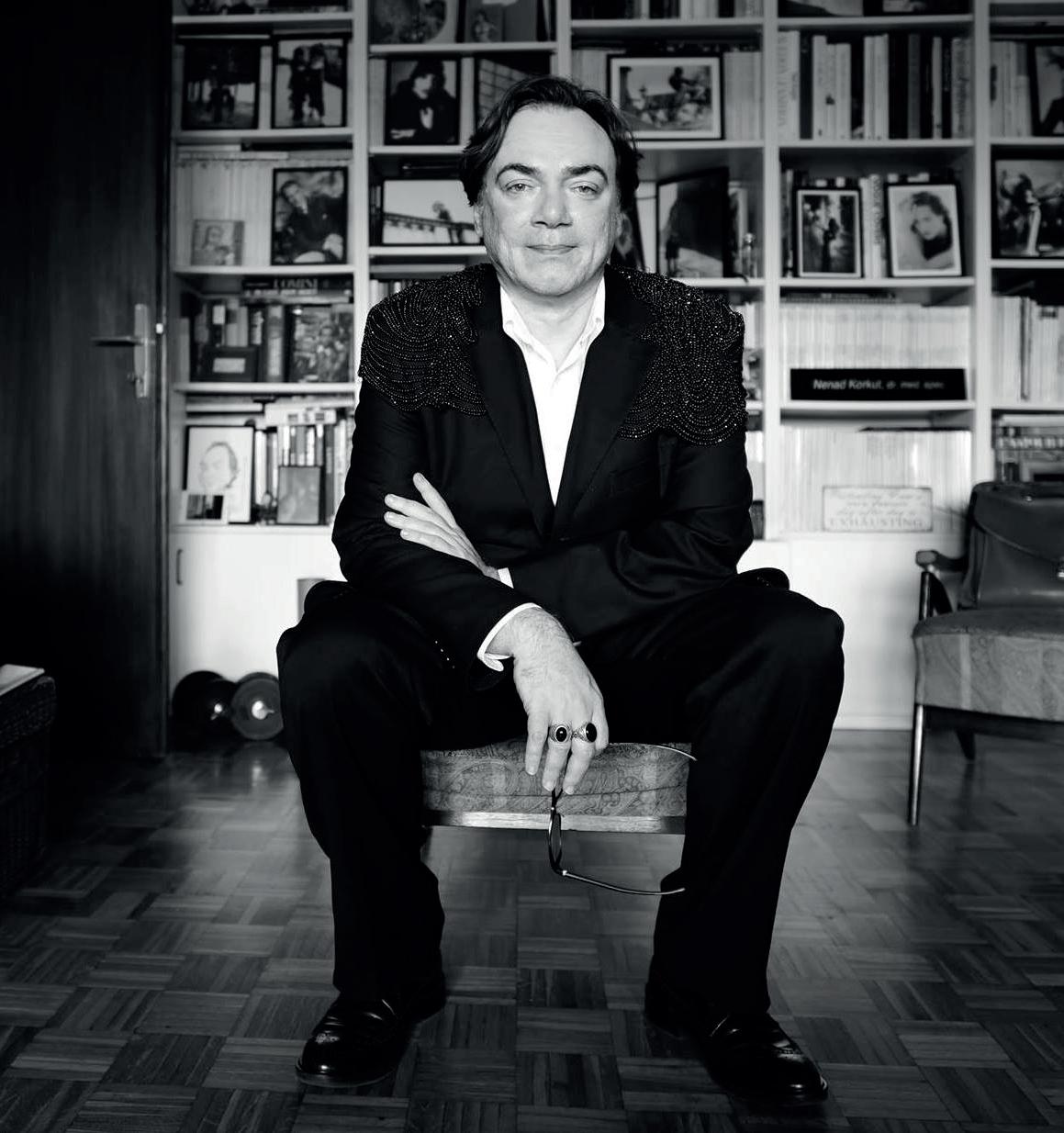
OF THE DESIGNERS WHO WERE ACTIVE WHEN I FIRST STARTED FOLLOWING FASHION, ONLY VALENTINO GARAVANI AND JEAN PAUL GAULTIER ARE STILL ALIVE, THOUGH BOTH HAVE LONG SINCE RETIRED
interest in it. Of course, that has nothing to do with money. Still, some things can be learned. Being born with style isn’t the most important thing in life—just as some people are born without a musical ear and live perfectly normal lives. I don’t see why everyone should have style; I think it’s far more important whether we possess other,
more essential human qualities. Fashion should be an upgrade. Unfortunately, people often set the wrong priorities, where bit matters more to them how they look on the outside than how they grow from within.
What does fashion mean to you?
How would you describe fashion and everything it entails today? How much is fashion related to trends? And what, in your opinion, is style, and how should it relate to fashion?
Ever since I began following fashion –and I have been writing about it in the media for 30 years – I have always been fascinated by the phenomenology of fashion, the social conditions that drive change, and the fashion evolution. I have always been more interested in analysing than in criticizing, in asking why fashion changes occur and under what circumstances, rather than what will be worn next season. I am fascinated by the talent of people in this field – designers and photographers alike – and by their development and creative maturation. I find it meaningless to answer banal questions like whether green or yellow, stripes or polka dots, will be in fashion this season. Anyone can flip through a fashion magazine and get that information. For me, fashion has always been a way to briefly escape the not so pleasant realities that often surround me in everyday work. My answer regarding trends is the same every season: individuality will always be in fashion. Today’s fashion is very democratic, allowing you to take exactly what suits you. Remember, style and fashion are two separate concepts. Being dressed according to the latest trends does not mean you have style. As Coco Chanel said: “Fashion fades, only style remains the same.”
We are used to hearing your commentary every time we watch the Oscars on HRT. How does a walk on the red carpet influence global trends? How do designers choose their muses or models for such events, and what guides their decisions? How has this evolved historically? The Oscars have always fascinated me because they combine my two great passions: film and fashion. Although, as a cinephile, I am more interested in films showcased at Cannes, Venice, and Berlin, the Oscars have always captivated me as a major media spectacle. Over the past 20 years, we have witnessed significant changes in the ceremony itself. The red carpet has become as important as the awards ceremony, making the Oscars (alongside the Met Gala) the most significant fashion – not just film – event in the entertainment industry. Fashion designers and major fashion houses have become aware that having their brand name spoken on the Oscar red carpet has far more commercial impact than
traditional advertising campaigns. In the past, actresses wore dresses created by Hollywood costume designers; today, they appear as brand ambassadors for fashion houses with whom they often have contracts. The designs we see on the red carpet rarely influence everyday fashion trends because they are couture pieces. These dresses are made specifically for the occasion, they are extremely expensive, and not intended for the general public. Fashion houses do not make their living from couture, but they understand that such high-profile exposure generates enormous profits through the sale of accessories, shoes, bags, perfumes – essentially everything that constitutes their business.
The psychology of dressing is complex and it influences culture, sexuality, etc. How would you describe the impact of designers today compared to the past? How much does ready-to-wear and mass production, which were not as widespread before, influence their work – or vice versa?
The differences are enormous. In the past, fashion catered to a very narrow circle of privileged clients. It wasn’t until 1966, when Yves Saint Laurent opened his legendary Rive Gauche boutique, that prêt-à-porter was born. Until then, designer clothing could only be customordered, and the opening of a store where one could buy designer ideas in their size was a true fashion revolution. This sig-
nificantly democratized fashion, making it accessible to a broader audience. Another major shift in modern fashion has been the appearance of brands specializing in so-called fast fashion. Famous fashion houses present their collections six months in advance, but their ideas quickly appear in cheaper versions in these stores. Given the rapid turnover of new items that such brands release, it’s no surprise that the fashion industry is now one of the planet’s largest polluters. Fast fashion is not made to last, and consumerism has long overshadowed genuine creativity.
In the past, fashion and designer clothes were reserved for the wealthy. Unique dresses, suits, and special wardrobe pieces were created. To what extent is fashion perceived as art?
For me, fashion is certainly art, and I do not necessarily view it only as wearable. If someone sees clothing merely as something to cover their body or keep them warm, then they certainly do not perceive it as art. People have different interests in life, and thus different perspectives on fashion. For some, it is just clothing; for others, it is much more. Of course, not everything in fashion is worthy of artistic valuation, but given that major museums around the world have long hosted fashion exhibitions and tributes to great designers, it is clear that once it entered a museum space, fashion has been recognized as art.
JUST AS COCO DISCARDED CORSETS AND ALLOWED WOMEN TO BREATHE, ARMANI SOFTENED THE MALE SILHOUETTE
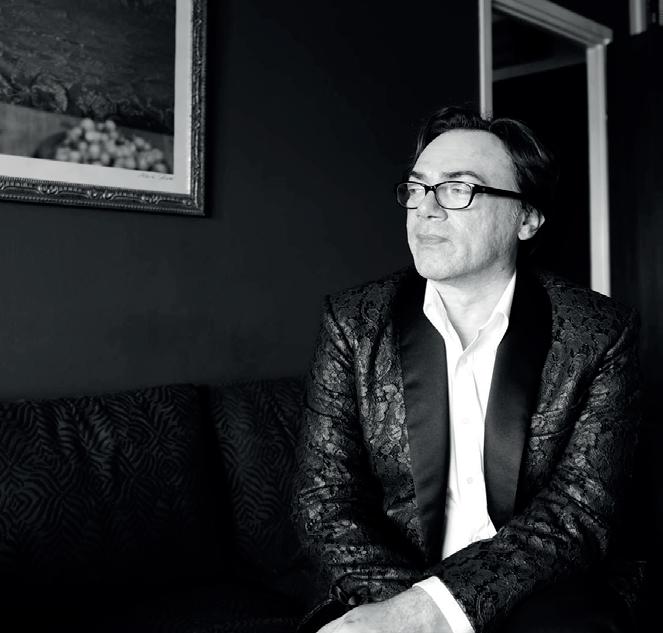
Recently, the legendary Giorgio Armani passed away at the age of 91. How much does his passing mark the end of an era in style and elegance, even though he built an empire beyond the runway (furniture, hotels, etc.)?
Armani was certainly a unique figure in the world of fashion, for several reasons. One is that he is one of the few designers in history who gained fame dressing men – a particularly difficult feat, given that fashion is primarily geared toward women. Another is that he did not grow up fascinated by the fashion world from a young age, unlike most of his colleagues. He entered the fashion world almost by chance. In the biographies of almost all major designer stars, their passion for clothing and style emerged very early, whereas Armani achieved his fashion recognition only after turning 40. His childhood was not idyllic like that of his generational peers Valentino, Karl Lagerfeld, or Yves Saint Laurent, who came from well-off, if not wealthy, families.
His vision of a modern man was truly revolutionary, and very risky for its time. It is difficult to make significant innovations in menswear, given that there is limited room for experimentation within the classic suit. Yet, what makes Giorgio Armani’s name important in the history of men’s clothing today can be compared to what Coco Chanel did for women in the early 20th century. His clothing freed men from traditionally rigid cuts and conventional lines. Just as Coco discarded corsets and allowed women to breathe, Armani softened the male silhouette, making it incredibly relaxed without stripping away its masculine attributes. He made his fashion vision not only aesthetically inspiring but also comfortable. Men quickly embraced this new fashion worldview, but to everyone’s surprise, so did the women. His rise coincided with the “yuppie” revolution, when women, striving to prove themselves equal to men in the workplace, sought to be taken seriously. Armani saw this as the perfect opportunity for his breakthrough. Women were, of course, captivated by the simplicity and elegance of his lines, and soon his fashion fame was equally recognized for collections for both sexes. His minimalist approach was quickly adopted by Hollywood elites.
He will also be remembered for the breadth of his business empire. He launched numerous subsidiary fashion lines, furniture and home décor collections, and opened hotels and restaurants designed according to his aesthetic vision. He was a man who, starting with fashion under his own name, created a complete lifestyle concept. Without a doubt, his passing marks the end of an era in fashion.
14.October - Vatroslav Lisinski Concert Hall
n this occasion, in the presence of representatives from the Ministry of Health, the Ministry of Labour, Pension System, Family and Social Policy, Premium Visa cardholders, and other guests, the 100th donation was presented as part of the unique humanitarian project “Doing Good Every Day” and the Visa Card with a Heart – a donation of 100,000 euros to the Neonatology Department of Clinical Hospital Merkur. For 17 consecutive years, PBZ Group has actively supported national initiatives through this project, helping improve healthcare and social services for children and young people. For every transaction made with the Visa Card with a Heart, PBZ Group donates 0.10 euros to projects supporting children and youth – at no cost to cardholders. To date, PBZ Group has donated a total of 5.2 million euros to the “Doing Good Every Day” project fund.
“It is a great pleasure that we have once again organized a special event for our clients and Premium Visa cardholders, marked by its humanitarian dimension – a gesture of care for others, further affirming our commitment to community support and socially responsible business practices. Since last year’s gathering, when we launched a new cycle of donations for the benefit of children and youth, we have worked intensively on realizing new donations. True to the name of our project, ‘Doing Good Every Day,’ we have successfully delivered more than ten donations to paediatric departments and children’s homes across Croatia. I am very pleased that we have now presented the 100th donation as part of the ‘Doing Good Every Day’ project and the Visa Card with a Heart – a donation of 100,000 euros to the Neonatology Department of Clinical Hospital Merkur, aimed at providing even better healthcare for its youngest patients. Our project continues to make meaningful strides. We are pleased to announce our upcoming donation of an electric vehicle to the Children’s Center Zagreb, as part of the initiative ‘Helping Children, Helping the Earth.’ This project aims to equip children’s homes with electric vehicles, reflecting our commitment not only to supporting children but also to caring for the environment in alignment with our ESG principles“, stated Dinko Lucić, President of the Management Board of Privredna banka Zagreb and Chairman of the Supervisory Board of PBZ Card.
With the donation of 100,000 euros, Clinical Hospital Merkur will acquire an incubator and two multifunctional ultrasound devices, thereby enabling higher-quality healthcare for its smallest patients.
“On behalf of Clinical Hospital Merkur, all our staff, and all our patients, I wish to extend our sincere and heartfelt gratitude to the PBZ Management for this valuable donation. We are honoured to be part of the ‘Doing Good Every Day’ project, which has, for many years, demonstrated how
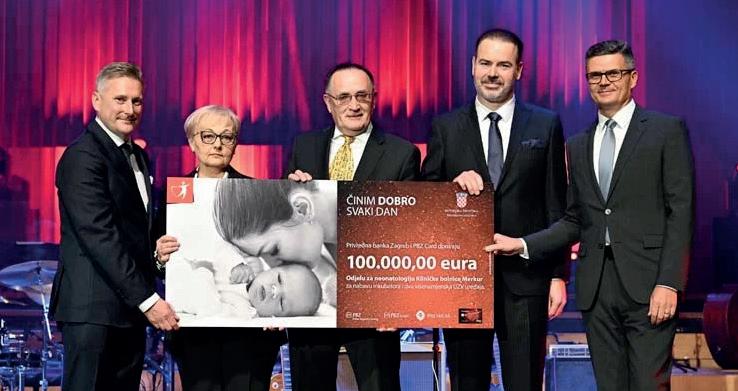
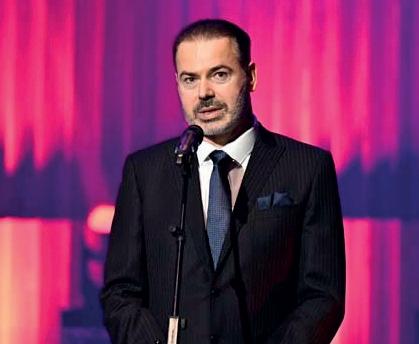

collaboration between the business sector and healthcare institutions can bring real change to the lives of our patients. The donation of 100,000 euros, directed toward equipping the Neonatology Department, will directly enhance the quality of healthcare for our smallest and most vulnerable patients. The acquisition of an incubator and multifunctional ultrasound devices will significantly raise the level of medical care and enable us to give every child the best possible start in life. I extend my sincere thanks to the Management and all employees of PBZ Group for recognizing the importance of investing in children’s health and for
continuously demonstrating that good deeds can truly change society for the better. Special thanks also go to the Visa Card with a Heart cardholders, who, by participating in this program, become part of this commendable story.This donation is not merely an investment in medical equipment – it is an investment in the future of our children and a testament to the fact that humanity and solidarity always find their way to those who need it most“, said Prof. Dr. Mario Starešinić, MD, Director of Clinical Hospital Merkur.
After the donation ceremony, a specially curated musical program titled “Rock or Classical?” featured performances by Nina Badrić, Dino Jelusić, and opera soloists, performing timeless hits of rock and classical music accompanied by Ante Gelo and the Zagreb Soloists.
The project “Doing Good Every Day” and the Visa Card with a Heart were introduced to the market in 2008, created with the aim of long-term, continuous assistance aand help to the community in which PBZ Group operates. The Visa Card with a Heart is a special card that, in addition to financial benefits, has a unique humanitarian character. For every transaction made with this card, PBZ Group sets aside 0.10 euros, at no additional cost to its holders. With the collected funds, PBZ Group supports projects of the Ministry of Health and the Ministry of Labour, Pension System, Family and Social Policy for the welfare of children, young people, and others in need. To date, PBZ Group has donated more than 5.2 million euros, presenting 100 donations to paediatric departments, children’s hospitals, and homes for children and youth throughout Croatia. More information on the project’s achievements can be found at www.cinimdobro.hr.
RANGE ROVER
Range Rover organized an exclusive Range Rover Experience in Istria – a unique event dedicated to luxury, design, and performance
In the heart of Istria, a region that perfectly embodies the philosophy of contemporary luxury through its elegance, gastronomy, and natural beauty, Range Rover organized an exclusive event from October 8th to 10th. The aim was to experience the true Range Rover world through a unique combination of performance, design, and sophisticated driving pleasure. The event sought to showcase the vehicles’ capabilities – particularly their off-road performance, luxury, and technology – through hands-on experience.
Participants had the opportunity to test the most prestigious models from the Range Rover family: Range Rover, Range Rover Sport, and Range Rover Velar. Each model represents a distinct expression of modern luxury and technological excellence – from timeless design and refined interiors to advanced assistance


RANGE ROVER, RANGE ROVER SPORT AND RANGE ROVER VELAR CONFIRMED THEIR PERFORMANCES AND LUXURY
systems and all-wheel-drive technology that ensures unparalleled performance across every terrain.
A particular highlight was the Range Rover Sport SV in striking Nebula Blue, powered by a 4.4-liter V8 petrol engine producing an impressive 635 hp. This exclusive vehicle from the SV (Special Vehicle) line represents the pinnacle of the Range Rover offering: a perfect blend of per-

formance, luxury, and impeccable precision. Its SV mode lowers the vehicle, enhancing responsiveness and handling, providing the most intense dynamic driving experience in Range Rover’s history – while maintaining the refinement and luxury the brand is known for.
Over three days in Istria, Range Rover once again confirmed its position as a symbol of timeless elegance, cutting-edge technology, and British luxury.
The Range Rover, Range Rover Sport, and Range Rover Velar models demonstrated that true driving pleasure lies in the details – the silence, power, refinement, and the feeling of total control.
In Istria, Range Rover was not just a car on the road - it was a moving luxury experience, meticulously crafted for those who seek more than just driving.

Famous brand presents a new era of cooking – with the first outdoor kitchen
the intelligent cooking system
At IFA 2025 in Berlin Miele presented numerous premieres. Together, these innovations expand Miele’s portfolio with connected, convenient and enjoyable cooking solutions for indoors and outdoors, ushering in a new era of cooking.
“In an increasingly complex world, our customers are looking for reliable innovations that simplify everyday life and create special moments. This is exactly what we deliver with our new products at IFA They are at the core of our Cooking Innovation Initiative and embody the highest standards in quality, design, innovation, and sustainability. In doing so, we are ushering in a new era of cooking”, says Dr Reinhard Zinkann, Executive Director and Co- Proprietor at Miele.
THE FIRST MIELE OUTDOOR KITCHEN “DREAMS” BRINGS PREMIUM COOKING EXPERIENCES OUTDOORS
With its new “Outdoor Cooking” product category, Miele is tapping into a growing market segment that expands its business model effectively. “More and more people around the world are discovering the outdoor living lifestyle,” says Dr Axel Kniehl, Executive Director Marketing & Sales. “With Dreams, we are now bringing the special Miele cooking experience outdoors for the first time. This modular outdoor kitchen can be customized and combined minimalist design, intelligent technology and Miele’s premium standards. Our customers can enjoy special moments and perfect results with family and friends, all with the trusted Miele quality – both indoors and outdoors. It sets a new benchmark for outdoor cooking”.
The Dreams modular outdoor kitchen comprises numerous individually combinable modules, from multiple gas barbecues to a hob,

“Dreams”,
“M Sense”, and the world premiere of the first steam drawer

“M SENSE” COOKWARE: NOTHING BURNS. NOTHING BOILS OVER.
Incidents such as boiled-over pasta water or burnt steak are a thing of the past with M Sense. At IFA, Miele presented intelligent cookware with integrated touch controls and up to three temperature sensors. Combined with the new KM 8000-generation induction hobs, this creates a multipatented system that automatically regulates cooking power for precise results and stress-free cooking. Miele is ushering in a new era with its intelligent cookware. Pots and pans communicate; hobs listen. The technology is controlled via the cookware itself.
sink and outdoor refrigerator, as well as an extensive range of over 60 perfectly coordinated accessories. One highlight is the “Fire Pro IQ”, an intelligent gas barbecue that automatically regulates temperatures and grills entire dishes independently. This ensures perfect results without constant monitoring and frees up more time to spend with guests and family.
With the steam drawer, Miele is presenting a world premiere at IFA – creating space for new possibilities in kitchen planning with cooking experiences at the highest level. Thanks to its minimalist design and height of just 14 centimeters, the drawer adapts to individual requirements, from urban living environments to open-plan kitchen concepts. Thanks to DualSteam technology and more than 100 automatic programs on the appliance, vegetables, sousvide, or everyday applications such as heating and defrosting are effortless. The capacity is sufficient for up to four people. Convenient details such as lid opening at the touch of a button and integration into the Miele app* make operation and control easier.
Miele presented several new products at the IFA kick-off in July: the new downdraft extractor with integrated ambient lighting creates atmospheric accents in the kitchen, while the large- format MasterCool refrigerators set standards in convenience and design. A highlight in floor care: the cordless Triflex HX3 Plus Aqua converts from a standard vacuum cleaner to a wet cleaner in the blink of an eye thanks to the Aqua Twister Pro floor nozzle. Two functions in one appliance make everyday life so much easier and provide maximum flexibility.
Digitalization and AI are key drivers for greater convenience and efficiency in the home, and Miele is bringing this progress into the kitchen. With the “FoodView” feature in the new MasterCool refrigerators, users can always keep an eye on the contents. Several camera images taken when the door was last closed are provided via the Miele app. This makes planning and spontaneous shopping easier, while also preventing food waste.

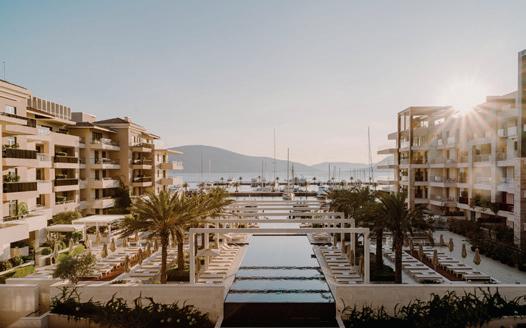
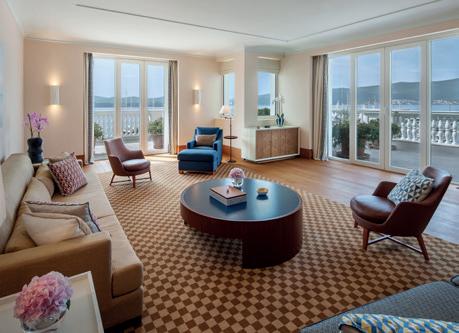

As the Adriatic coastline trades sun-kissed summer for crisp, clear winter skies, Regent Porto Montenegro unveils seasonal experiences crafted for those who seek elegance, renewal, and refined simplicity during the cooler months.
Wake to panoramic views of Boka Bay, daily breakfast served with quiet sophistication, and curated indulgence at the awardwinning Regent Spa. Designed for comfort and discovery, this winter offering invites guests to slow down and savour every de-
AS PART OF THE IHG HOTELS & RESORTS PORTFOLIO, THE HOTEL BLENDS REFINED
DESIGN WITH MODERN COMFORT IN THE VIBRANT MARINA VILLAGE OF PORTO MONTENEGRO
tail of their retreat – from luxurious in-room touches to exclusive shopping privileges across Porto Montenegro Village, with a guaranteed room upgrade to elevate the stay.
For those seeking deeper restoration, the Stay & Spa package is a winter ritual of rejuvenation. Guests booking a Premium Room enjoy a €90 spa credit per room, per night, ideal for experiencing
holistic treatments tailored to refresh both body and mind.
Whether guests are escaping for a moment of calm, a weekend of wellness, or simply seeking a refined reason to travel well this winter, Regent Porto Montenegro offers an elegant invitation to unwind with purpose along the shores of the Adriatic.
Located in the heart of the UNESCO-protected Boka Bay, Regent Porto Montenegro is a luxury waterfront property offering timeless elegance, impeccable service, and unforgettable experiences.



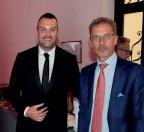


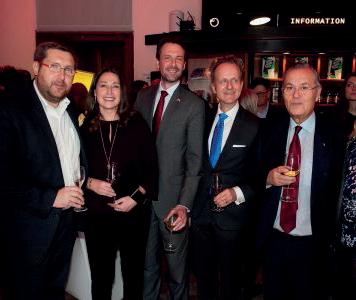

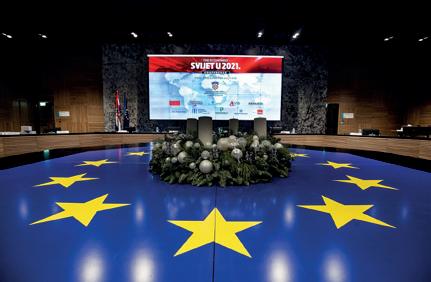

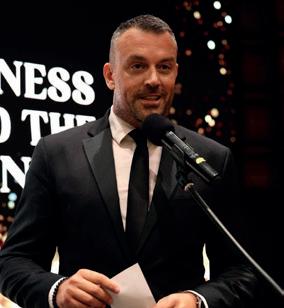
8years ago, on a rainy November afternoon, the Diplomacy&Commerce team with a lot of excitement and enthusiasm successfully launched its first issue in Croatia, at the residence of the British Ambassador in Zagreb, H.E. Andrew Dalgleish. At the more than successful launch of the first issue, as co-host was the then German ambassador in Zagreb H.E. Thomas E. Schultze. And we began a journey that was uncertain because even then they were saying that print was dead or at least dying.
However, it was not like that. Numbers of issues followed, special Focus in additions, new friendships, business collaborations were made, and so we reached our first birthday, which we celebrated at the Museum of Arts and Crafts in Zagreb. There was a gala!
And we didn’t stop there, the second year came when we celebrated at the Mimara Museum in Zagreb. Ambassadors, representatives of international organizations, politicians, but above all businessmen, are our dear guests, associates, and friends.
Then came the corona virus pandemic. It was not known whether we would work because we were not even allowed to leave the house. But that also passed, we adapted and moved on. And then came the earthquake in Zagreb, first one, then another, and new challenges. And we passed that. The work did not suffer even when we who make the magazine had personal problems, health problems and various other problems, because we must not let the readers down. And that’s how we reached the full 8 years. In the meantime, Diplomacy&Commerce was part of the team that published The Economist World in magazine and the organizer of conferences that we organized at the Croatian National Bank twice, the University National Library, Lauba... We also organized, as The Economist World in , a Business breakfast at the Esplanade Hotel for directors and owners of companies where experts from London and Vienna were guests.
Two years ago, for the first time, in addition to the birthday celebration, we also had a spectacular DC Awards, where an eminent jury awarded 15 awards to institutions, companies, and individuals. Awards were also given to our associates who were awarded by us as the DC team. We look forward to similar events in the coming years.

